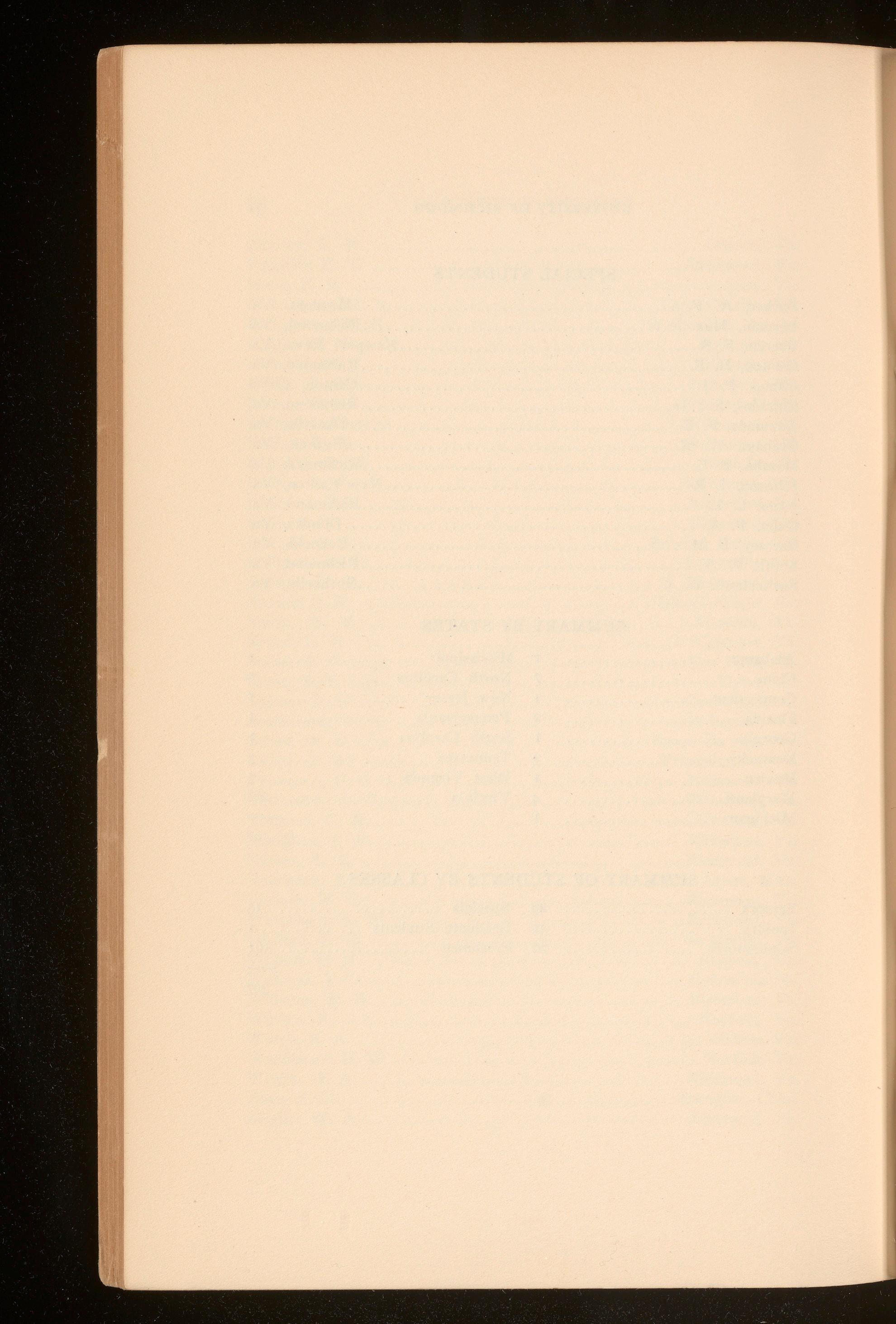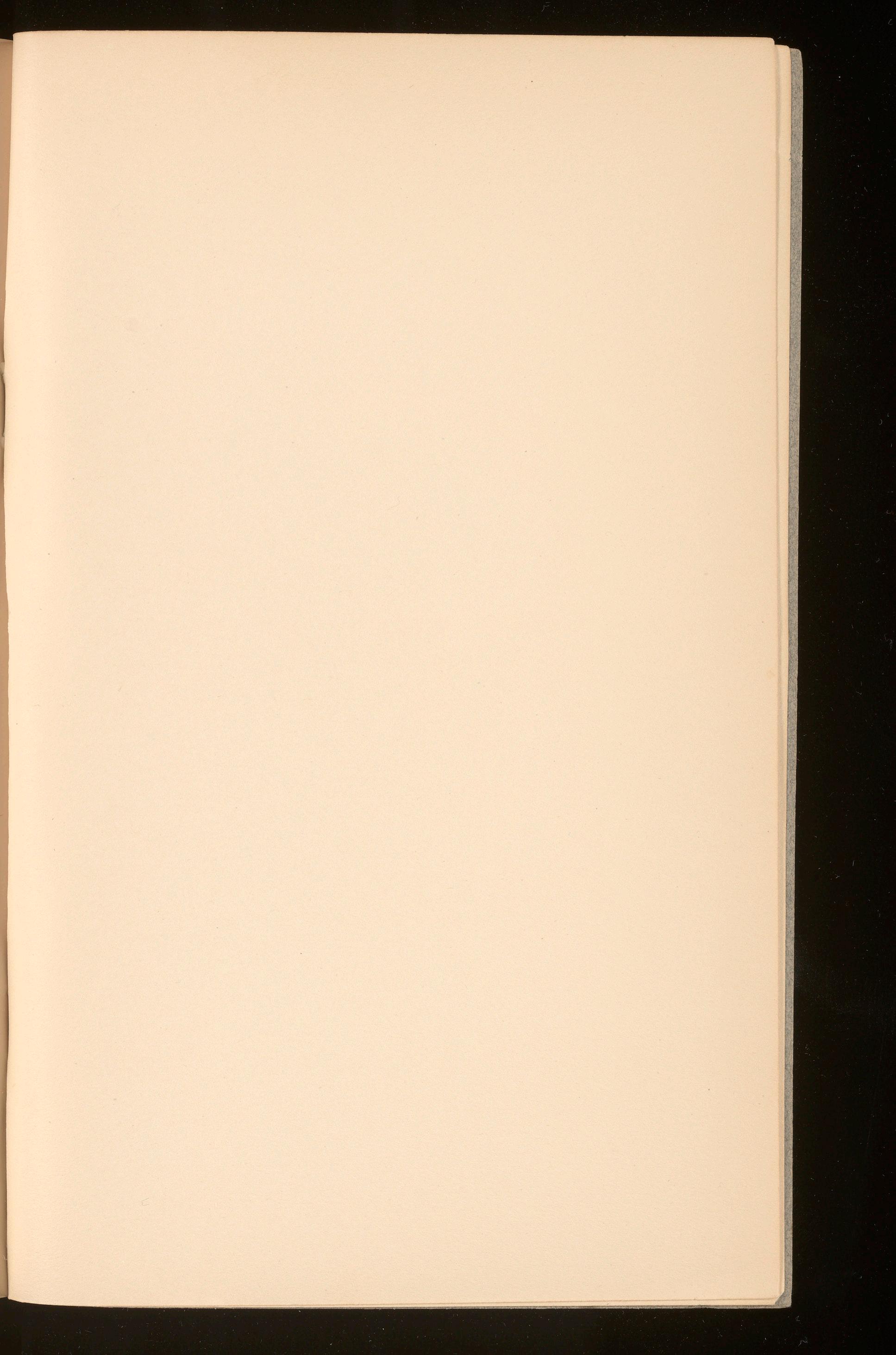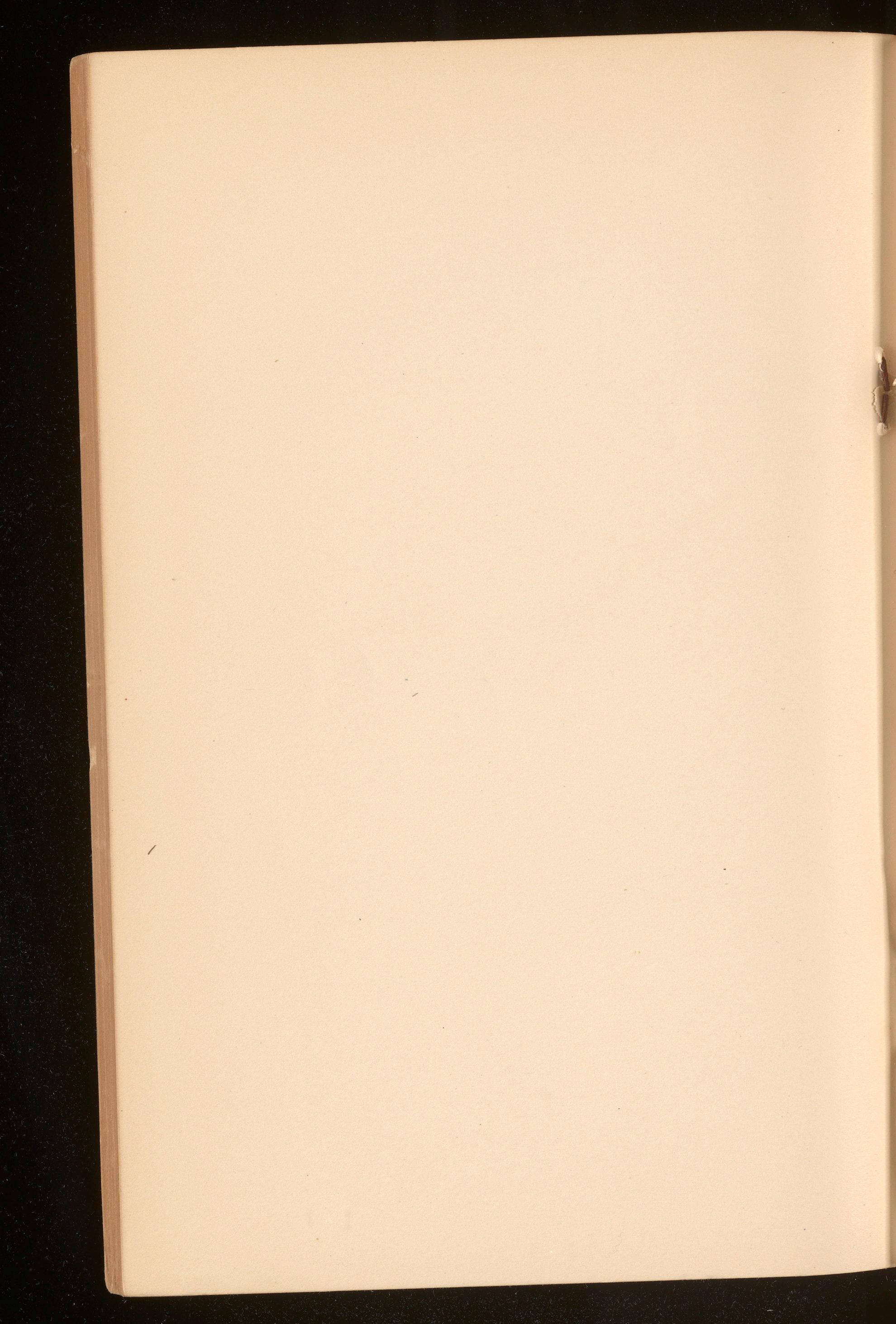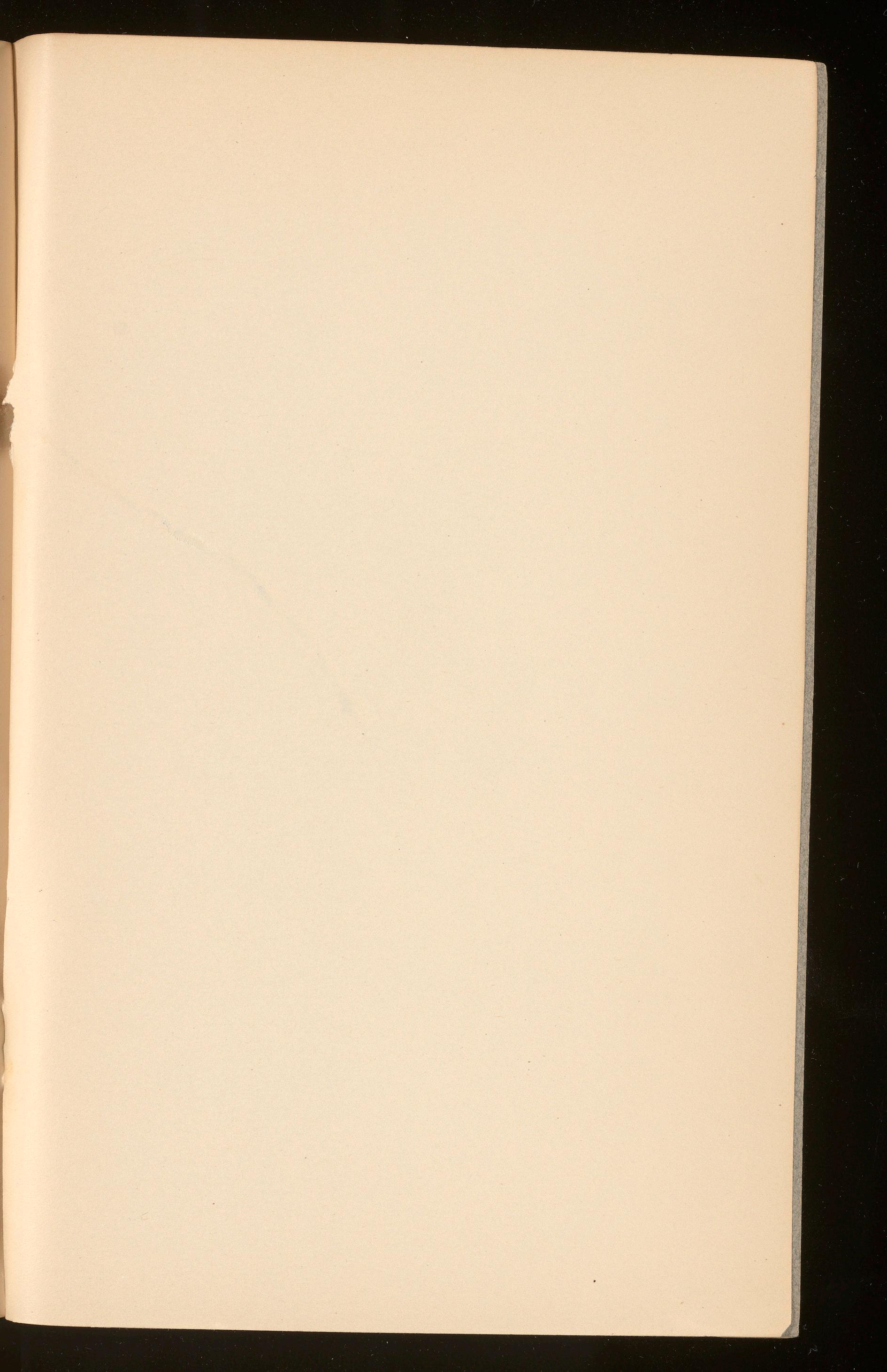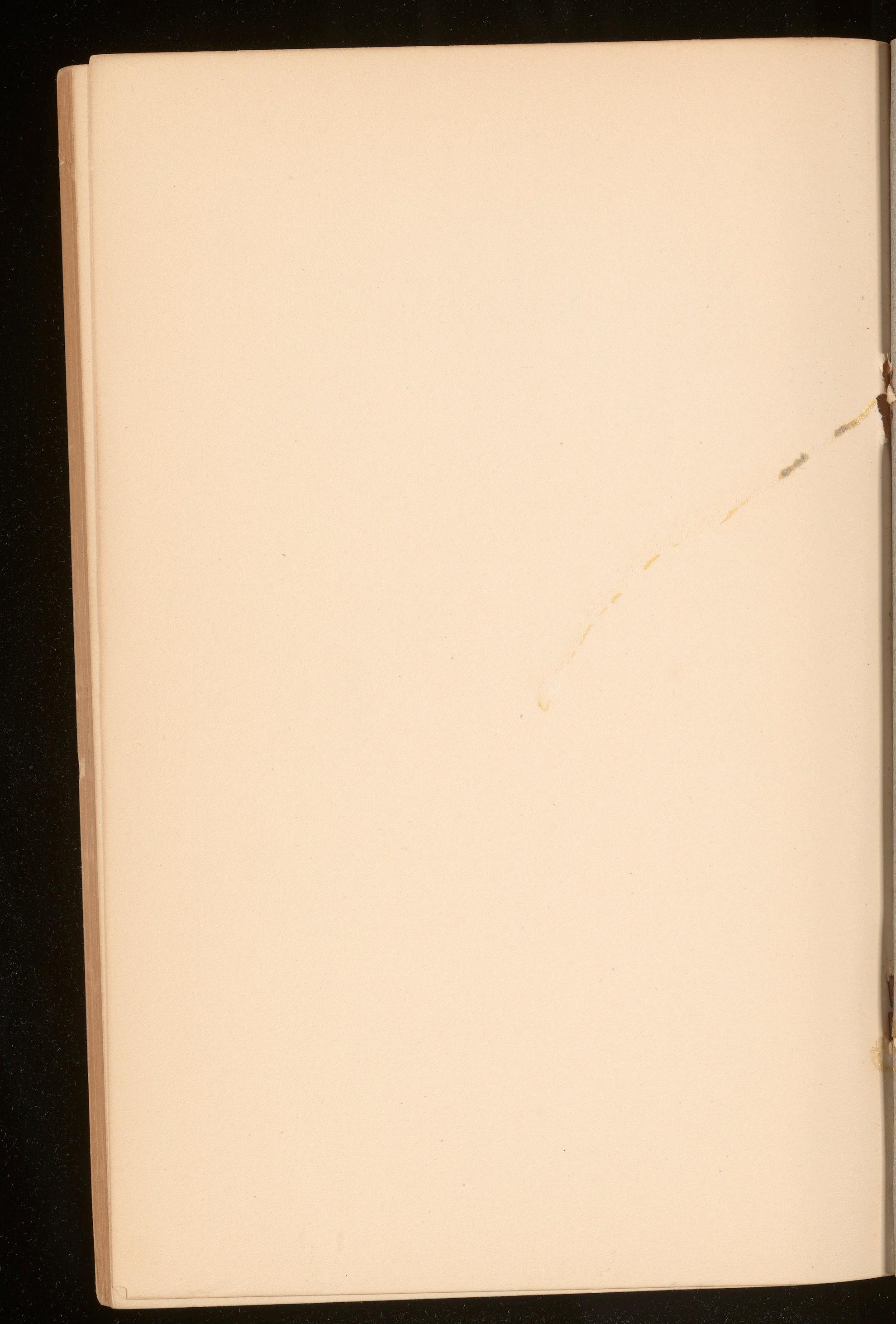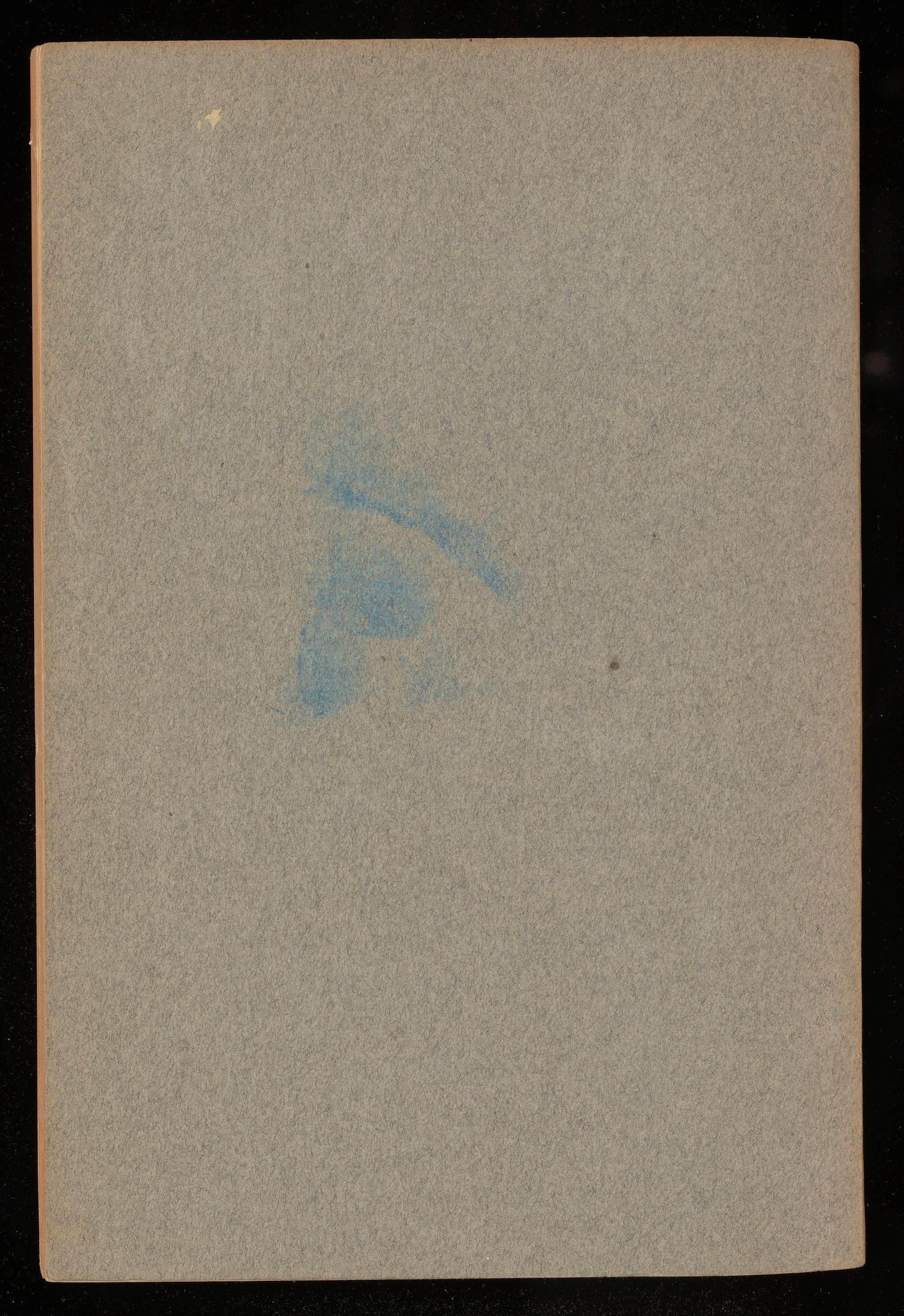




UNIVERSITY OF RICHMOND
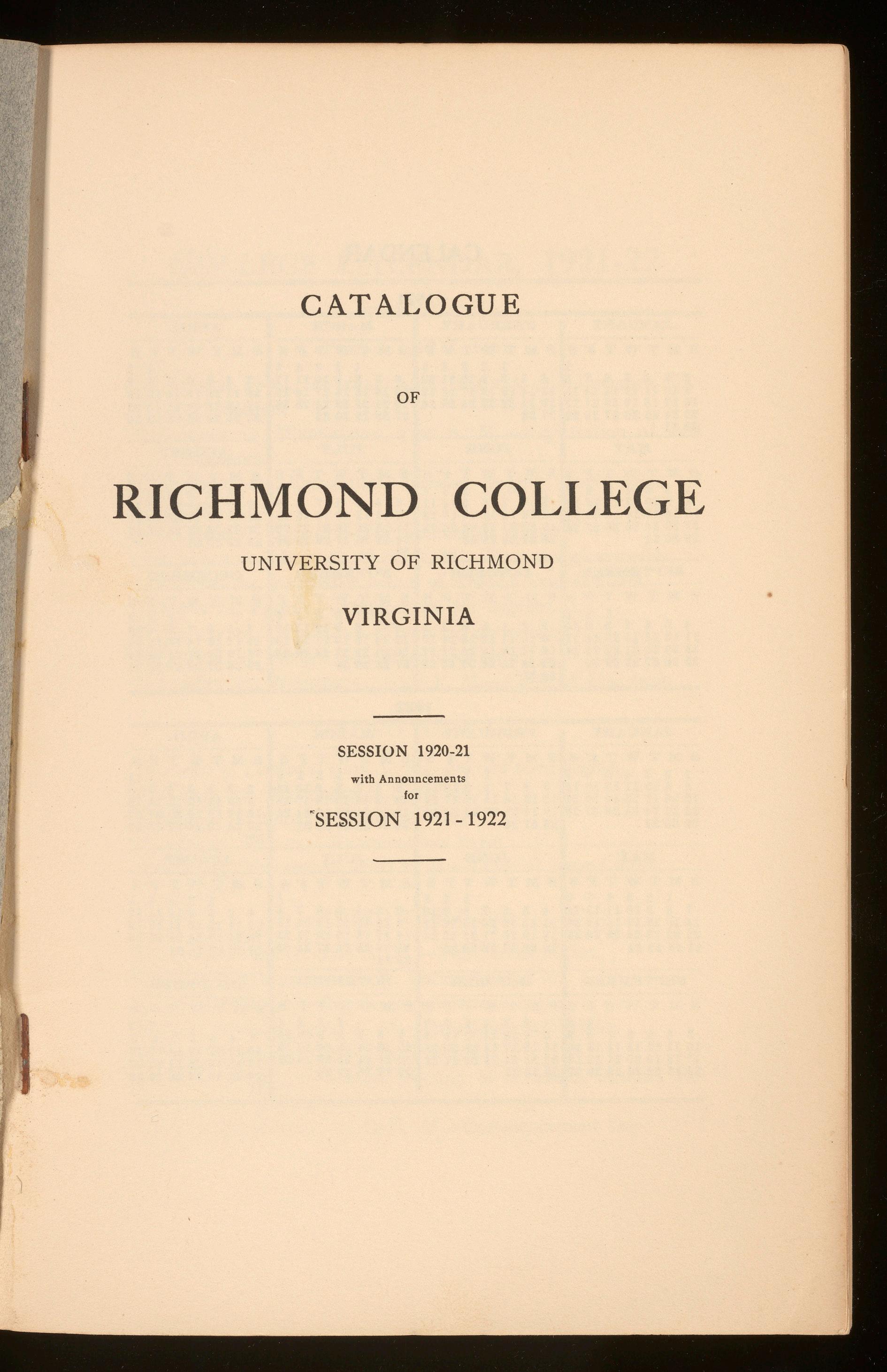
SESSION 1920-21 with Announcements for ·sESSION 1921-1922
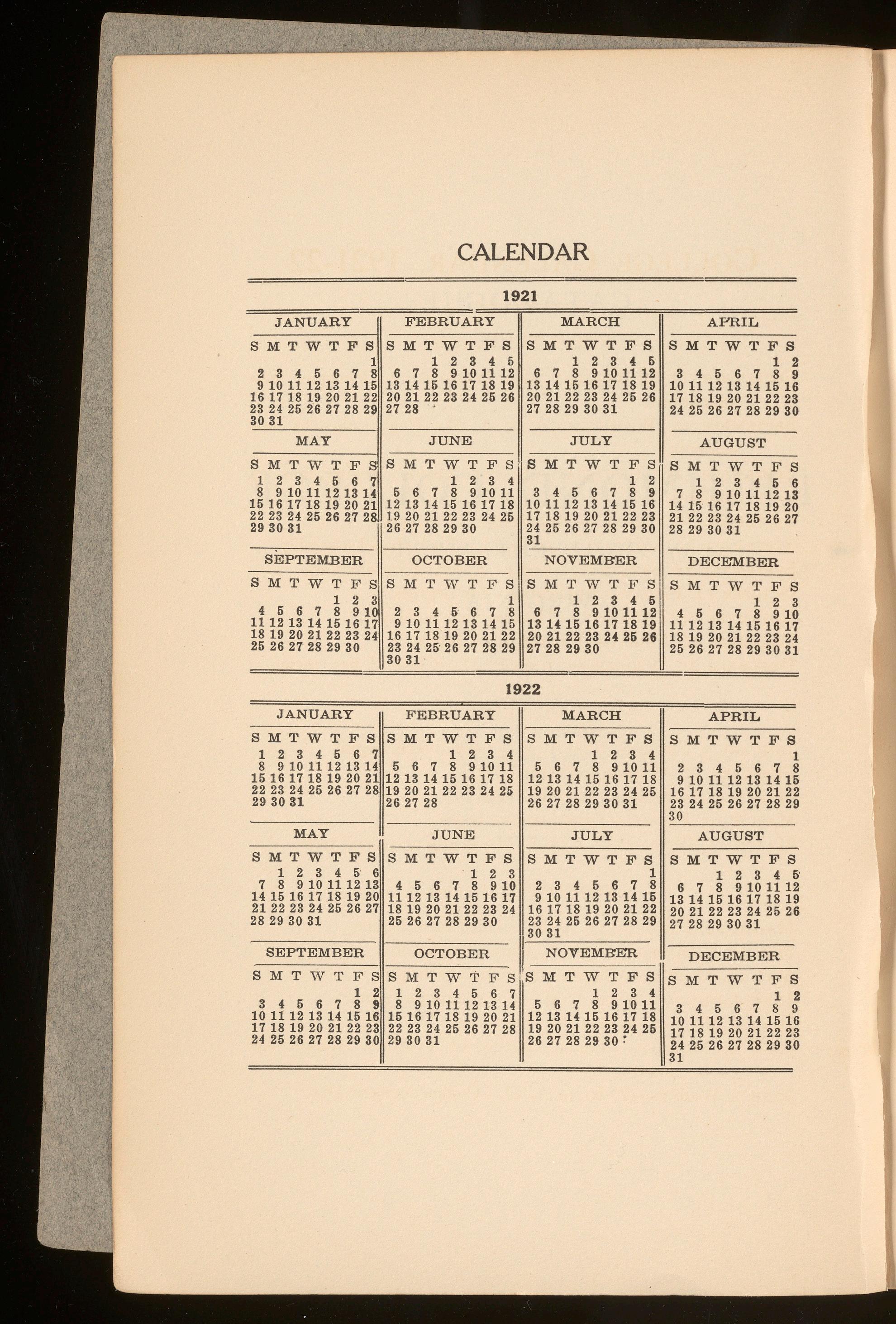
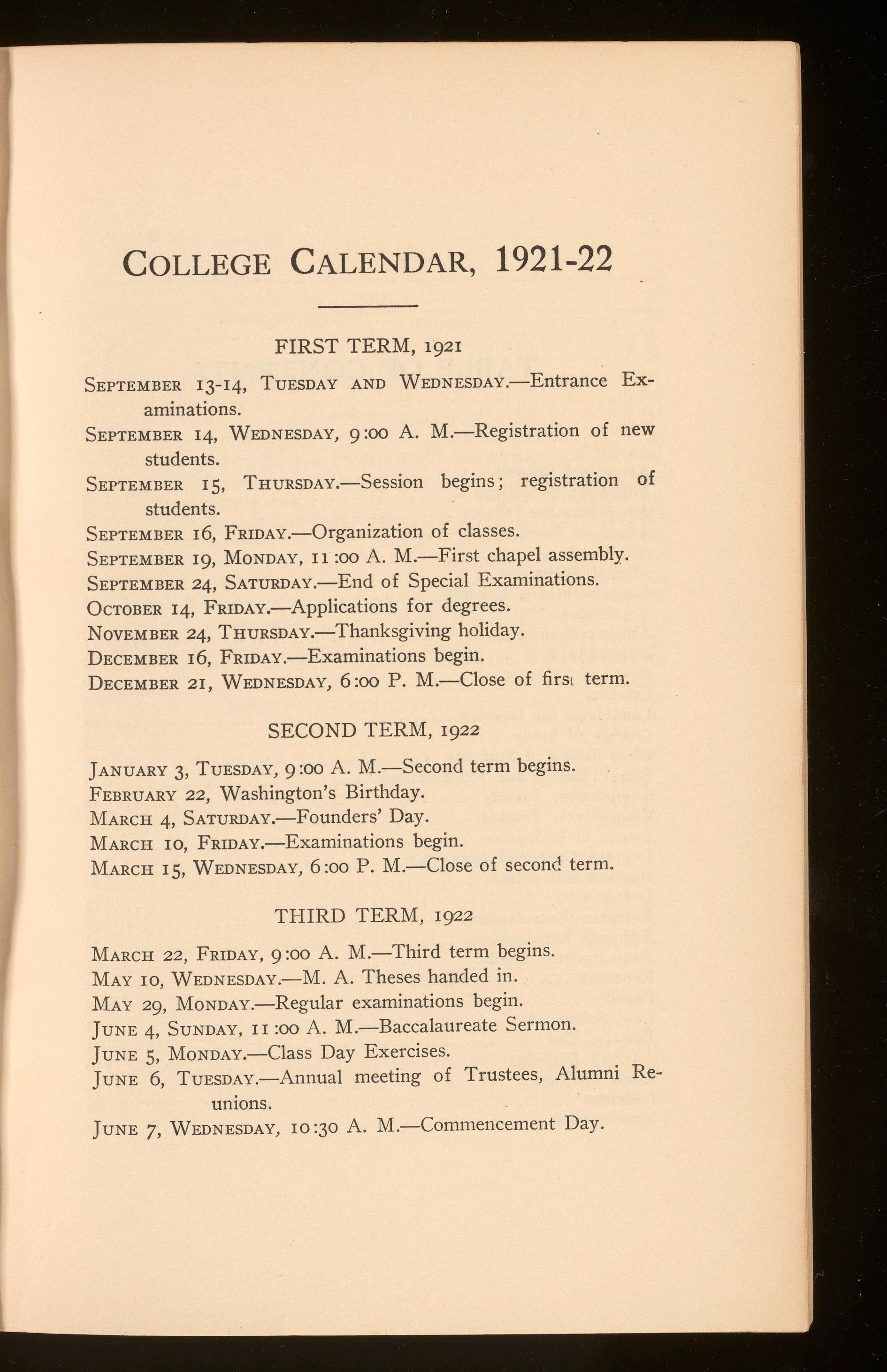
SEPTEMBER 13-14, TuESDAY AND WEDNESDAY.-Entrance Examinations.
SEPTEMBER14, WEDNESDAY,9 :oo A. M.-Registration of new students.
SEPTEMBER 15, THuRSDAY.-Session begins; registration of students.
SEPTEMBER16, FRIDAY.-Organization of classes.
SEPTEMBER19, MONDAY,11 :oo A. M.-First chapel assembly.
SEPTEMBER24, SATURDAY.-End of Special Examinations.
OCTOBER14, FRIDAY.-Applications for degrees.
NOVEMBER24, THURSDAY.-Thanksgiving holiday.
DECEMBER16, FRIDAY.-Examinations begin.
DECEMBER21, WEDNESDAY,6 :oo P. M.-Close of first term.
JANUARY3, TUESDAY,9:00 A. M.-Second term begins. FEBRUARY22, Washington's Birthday.
MARCH 4, SATURDAY.-Founders' Day.
MARCH IO, FRIDAY.-Examinations begin.
MARCH 15, WEDNESDAY,6 :oo P. M.-Close of second term.
MARCH 22, FRIDAY,9 :oo A. M.-Third term begins.
MAY IO, WEDNESDAY.-M. A. Theses handed in.
MAY 29, MoNDAY.-Regular examinations begin.
JUNE 4, SuNDAY, 11 :oo A. M.-Baccalaureate Sermon.
JUNE 5, MoNDAY.-Class Day Exercises.
JUNE 6, TuESDAY.-Annual meeting of Trustees, Alumni Reunions.
JUNE 7, WEDNESDAY,IO :30 A. M.-Commencement Day.
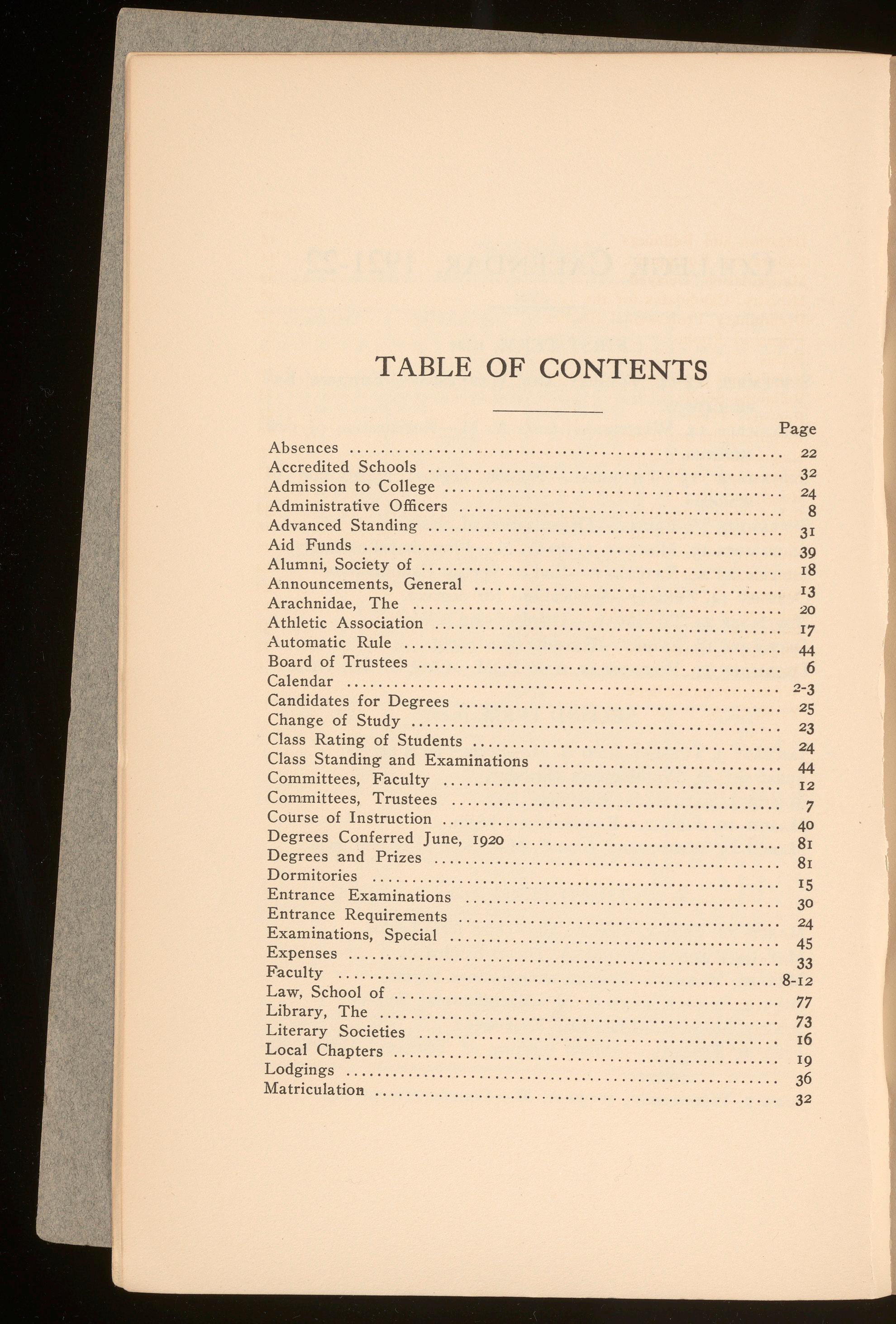
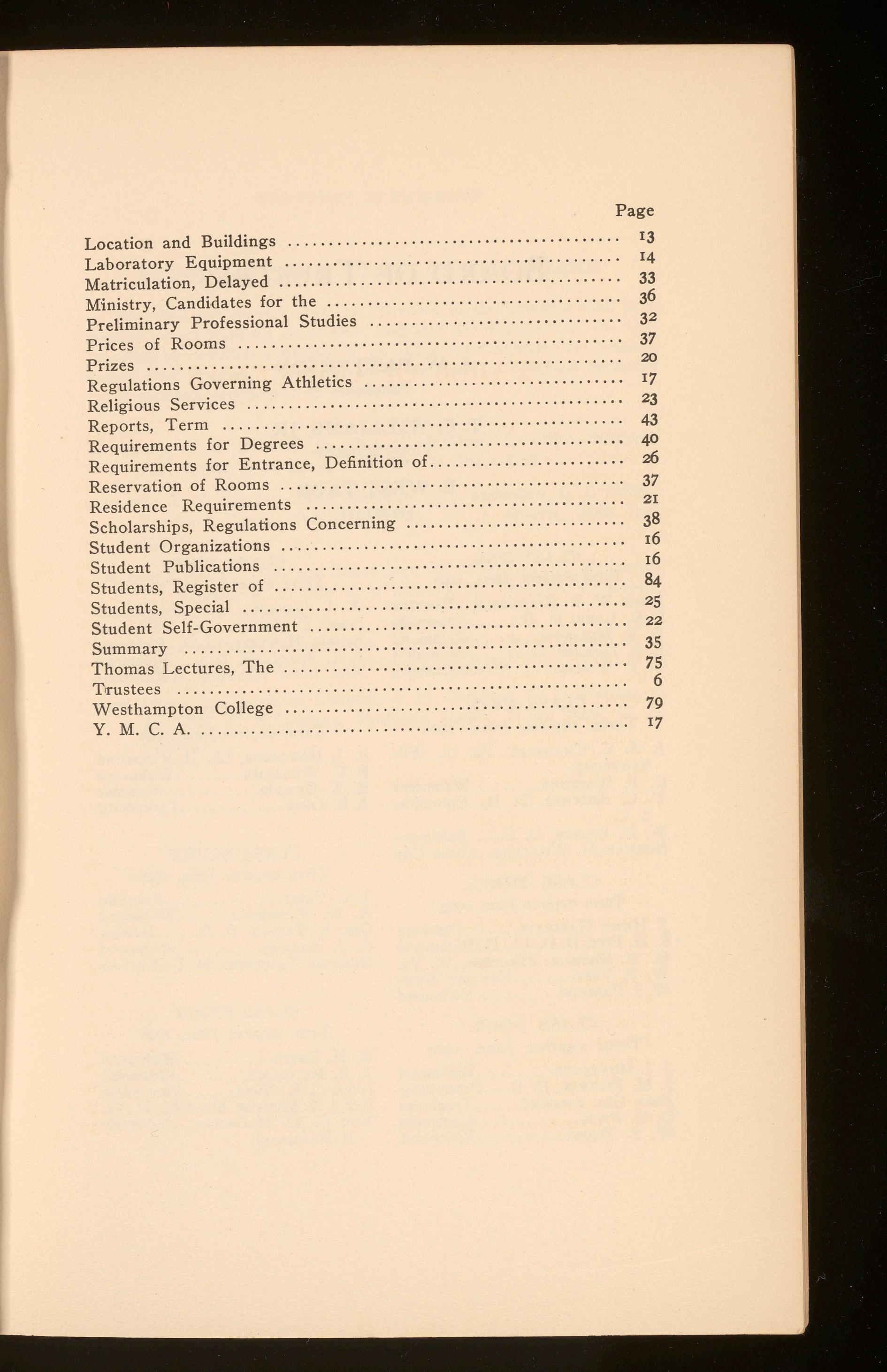
A. W. PATTERSON PRESIDENT
T. C. WILLIAMS, JR. VICE-PRESIDENT
B. WEST TABB SECRETARY
CLASS ONE
Term expires June, 1921
JUDGEw. R. BARKSDALE, .. Houston
I. B. LAKE, D. D ....... Upperville
C. V. MEREDITH . ........ Richmond
E B. JACKSON,D. D .. .. Alexandria
B. P. WILLIS....... Fredericksburg
CLASS TWO
Term expires June, 1922
J. A. C. CHANDLER,Ph. D., Williamsburg .
C. T. WATKINS......... Richmond
T. C. SKINNER, D. D ., Columbia, s. C.
W. H. BAYLOR,D. D .. Baltimore
NoRMAN H. WILLIAMS.. Chase City
CLASS THREE
Term expires June, 1923
J HuNT HARGRAVE ... Chatham
R. H PrTT, D. D., LL. D., Richmond
H. W. STRALEY,Princeton, W. Va.
W. B. VEST. ..... Newport News
W. J. PARRISH . Richmond
CLASS FOUR
Term expires June, 1924
J . J. MONTAGUE......... Richmond
J. M. PILCHER, D. D .... Petersburg
PROF. GEO . SWANN ... Trenholm
D. H PITTS........... . Scottsville
W. S. FoRBES......... . . Richmond
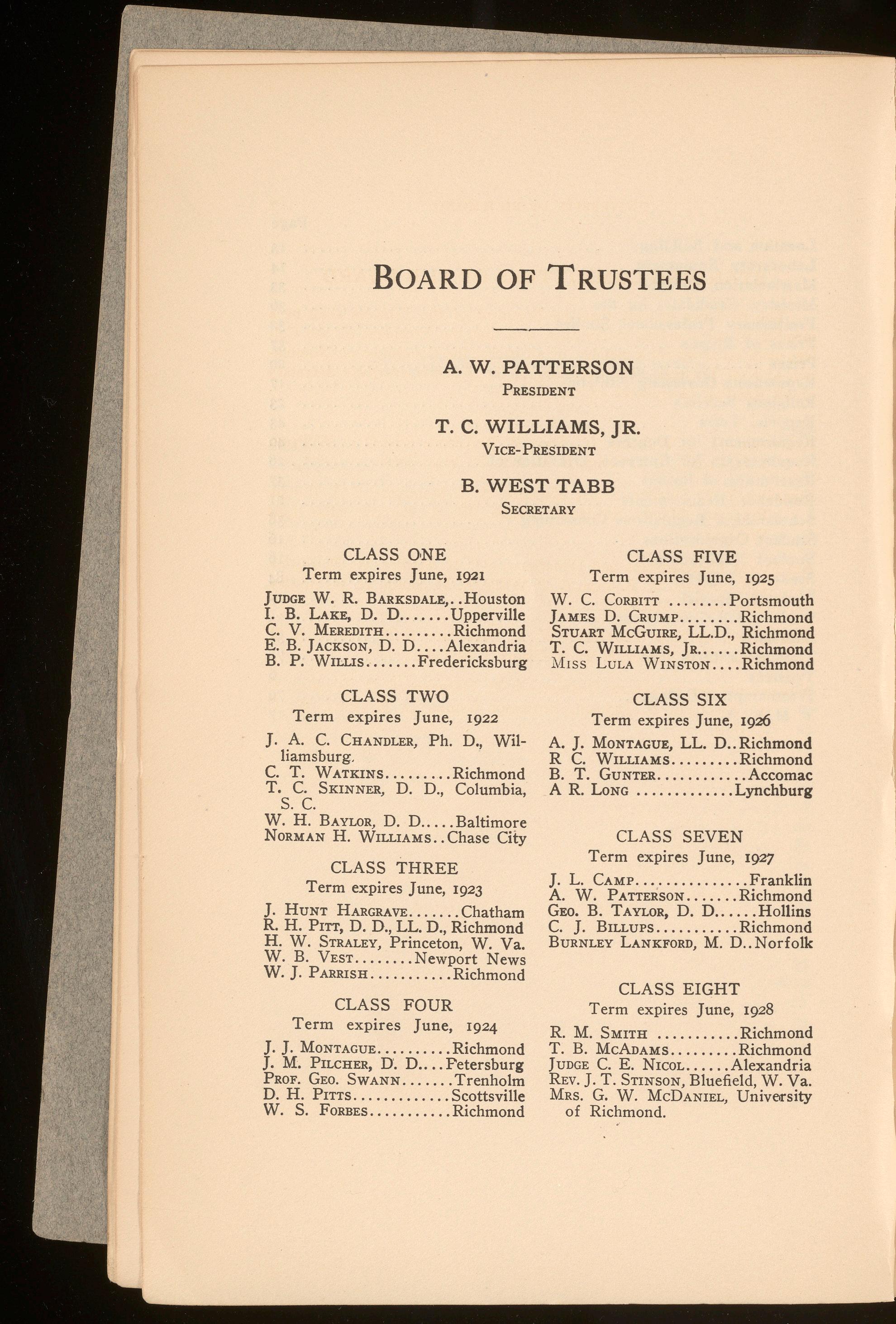
CLASS FIVE
Term expires June, 1925
W. C. CORBITT........ Portsmouth
JAMES D. CRUMP ...... Richmond
STUARTMcGUIRE, LL.D., Richmond
T. C. WILLIAMS, JR...... Richmond
:M:1ss LuLA WINSTON.... Richmond
CLASS SIX
Term expires June, 1926
A. J. MONTAGUE,LL. D . Richmond
R C. WILLIAMS......... Richmond
B. T. GuNTER......... .. Accomac
A R. LoNG ............ . Lynchburg
CLASS SEVEN
Term expires June, 1927
J. L CAMP ..... Franklin
A. W. PATTERSON...... Richmond
GEo. B. TAYLOR,D. D ...... Hollins
C. J. BILLUPS.......... Richmond
BURNLEYLANKFORD,M . D .. Norfolk
CLASS EIGHT
Term expires June, 1928
R. M. SMITH Richmond
T . B. McADAMS......... Richmond
JUDGEC. E. N rcoL ...... Alexandria
REV.J. T. STINSON,Bluefield, W. Va.
MRs. G. W. McDANIEL, University of Richmond.
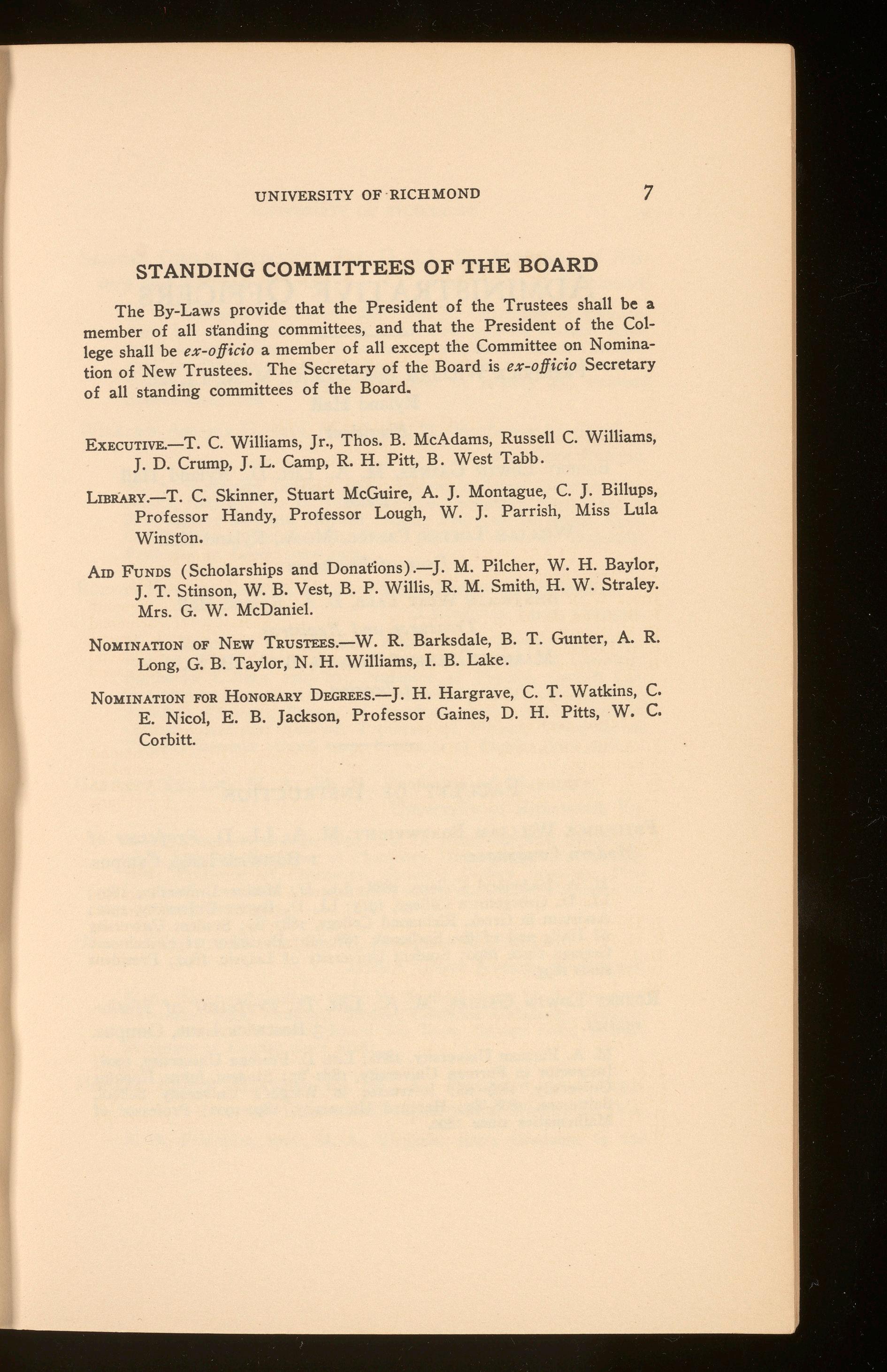
The By-Laws provide that the President of the Trustees shall be a member of all st'anding committees, and that the President of the College shall be ex-officio a member of all except the Committee on Nomination of New Trustees. The Secretary of the Board is ex-officio Secretary of all standing committees of the Board.
EXECUTIVE.-T.C. Williams, Jr., Thos. B. McAdams, Russell C. Williams, J. D . Crump, J. L. Camp, R.H. Pitt, B. West Tabb.
LmRARY-T. C. Skinner, Stuart McGuire, A. J. Montague, C. J. Billups, Professor Handy, Professor Lough, W. J. Parrish, Miss Lula Winsfon.
Am FuNDS (Scholarships and Donafions) -J. M. Pilcher, W. H. Baylor, J. T. Stinson, W. B. Vest, B. P. Willis, R. M. Smith, H. W. Straley. Mrs . G. W . McDaniel.
NOMINATIONOF NEW TRUSTEES.-W. R. Barksdale, B. T Gunter, A. R. Long, G. B. Taylor, N. H. Williams, I. B. Lake
NOMINATIONFORHONORARYDEGREES.-]. H. Hargrave, C. T . Watkins, C. E. Nicol, E. B. Jackson, Professor Gaines, D. H. Pitts, W, C. Corbitt.
FREDERICKWILLIAM BOATWRIGHT,M. A., LL. D , Ryland Hall
President
ROBERTEDWIN GAINES, M. A., Litt. D., Ryland Hall Dean
WILLIAM LOFTIN PRINCE, M. A., Ryland Hall
Dean of Freshmen
BENJAMINWEST TABB,B. A., Ryland Hall
Treasurer and Registrar
MARIONGARNETTRYLAND,B. A., B. s., Librarian
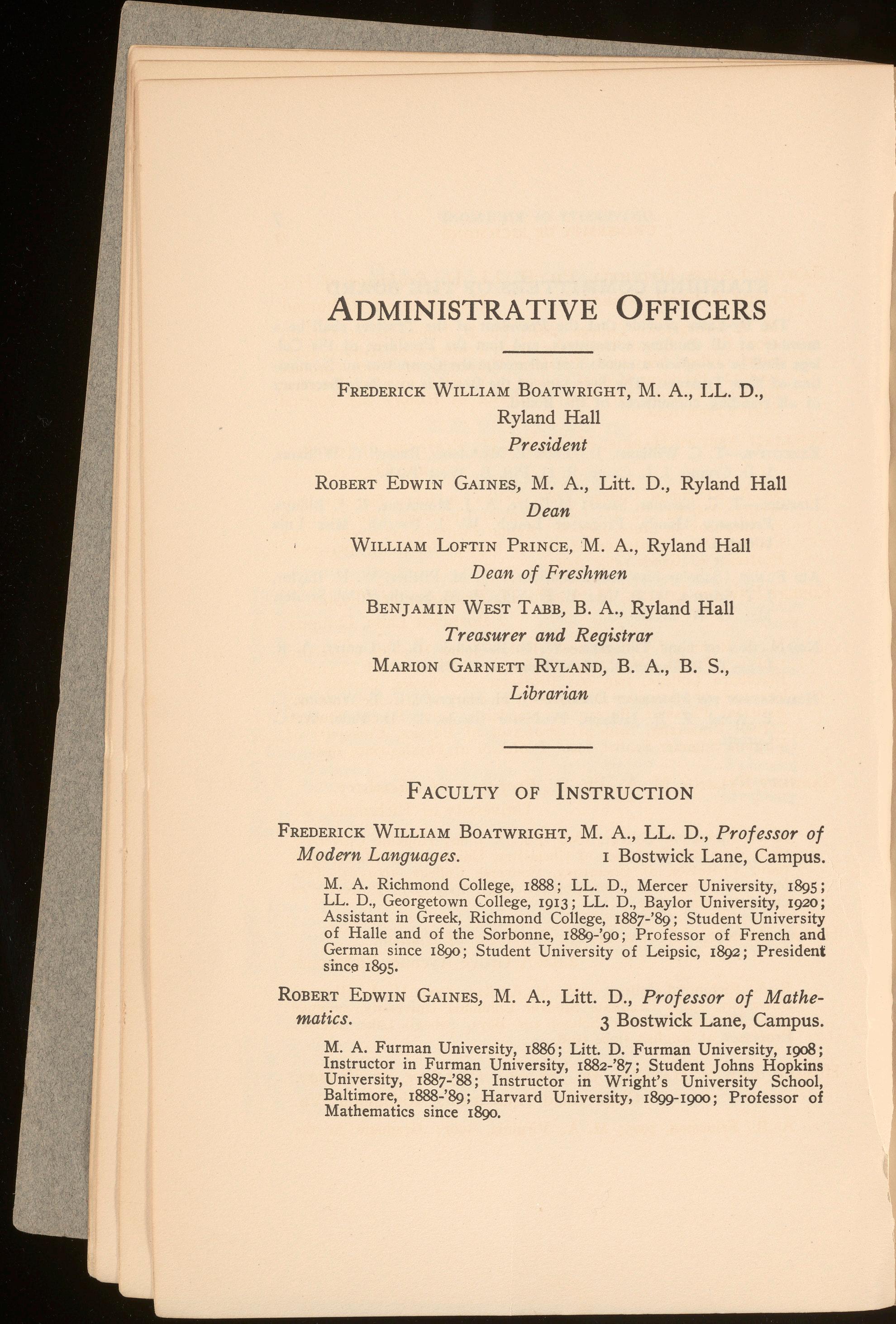
FACULTY OF INSTRUCTION
FREDERICKWILLIAM BOATWRIGHT,M. A., LL. D ., Professor of Modern Languages. I Bostwick Lane, Campus.
M . A. Richmond College, 1888; LL. D., Mercer University, 1895; LL. D., Georgetown College, 1913; LL. D., Baylor University, 1920; Assistant in Greek, Richmond College, 1887-'89; Student University of Halle and of the Sorbonne, 1889-'90; Professor of French and German since 189o; Student University of Leipsic, 1892; President sine~ 1895.
ROBERTEDWIN GAINES, M. A., Litt. D., Professor of Mathematics. 3 Bostwick Lane, Campus.
M. A. Furman University, 1886; Litt. D. Furman University, 19()8; Instructor in Furman University, 1882-'87; Student Johns Hopkins University, 1887-'88; Instructor in Wright's University School, Baltimore, 1888-'89; Harvard University, 1899-1900; Professor of Mathematics since 189o.
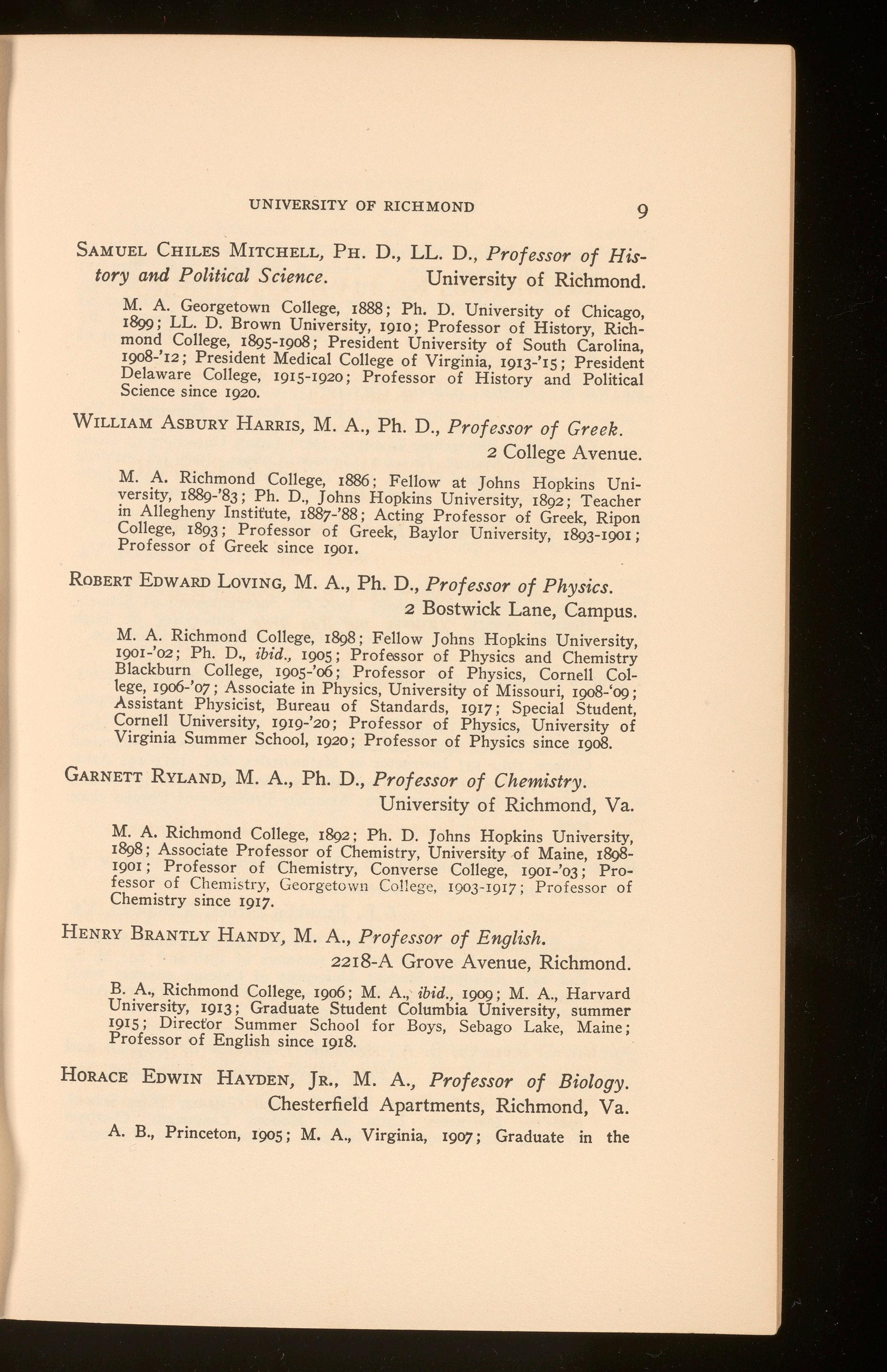
SAMUEL CHILES MITCHELL, PH. D., LL. D., Professor of History and Political Science. University of Richmond.
M A. Georgetown College, 1888; Ph. D. University of Chicago, 1899; LL. D. Brown University, 1910; Professor of History, Rich- mond College, 1895-19o8; President University of South Carolina, 19()8-'12; President Medical College of Virginia, 1913-'15; President Delaware College, 1915-1920; Professor of History and Political Science since 1920.
WILLIAM ASBURY HARRIS, M. A., Ph. D., Professor of Greek. 2 College A venue
M. A. Richmond College, 1886; Fellow at Johns Hopkins Uni- versity, 1889-'83; Ph. D., Johns Hopkins University, 1892; Teacher in Allegheny Instifute, 1887-'88; Acting Professor of Greek, Ripon College, 1893; Professor of Greek, Baylor University, 1893-1901; Professor of Greek since 1901.
RoBERT EDWARD LOVING, M.A., Ph.D., Professor of Physics. 2 Bostwick Lane, Campus.
M. A. Richmond College, 1898; Fellow Johns Hopkins University, 1901-'02; Ph. D., ibid., 1905; Profo.ssor of Physics and Chemistry Blackburn College, 1905-'o6; Professor of Physics, Cornell Col- lege, 1900-'07 ; Associate in Physics, University of Missouri, 19()8-'09; .Assistant Physicist, Bureau of Standards, 1917; Special Student, Cornell University, 1919-'20; Professor of Physics, University of Virginia Summer School, 1920; Professor of Physics since 19o8.
GARNETT RYLAND, M. A., Ph. D., Professor of Chemistry. University of Richmond, Va.
M. A. Richmond College, 1892; Ph. D. Johns Hopkins University, 1898; Associate Professor of Chemistry, University ,of Maine, 1898- 1901; Professor of Chemistry, Converse College, 1901-'03; Pro- fessor of Chemi stry, Georgetown College, 1903-1917; Professor of Chemistry since 1917.
HENRY BRANTLY HANDY, M.A., Professor of English. 22I8-A Grove Avenue, Richmond.
B. A., Richmond College, 19o6; M. A.,· ibid ., 1909; M. A., Harvard University, 1913; Graduate Student Columbia University, summer 1915; Direct'or Summer School for Boys, Sebago Lake, Maine; Professor of English since 1918.
HORACE EDWIN HAYDEN, JR., M. A., Professor of Biology. Chesterfield Apartments, Richmond, Va.
A. B., Princeton, 1905 ; M. A., Virginia, 1907; Graduate in the
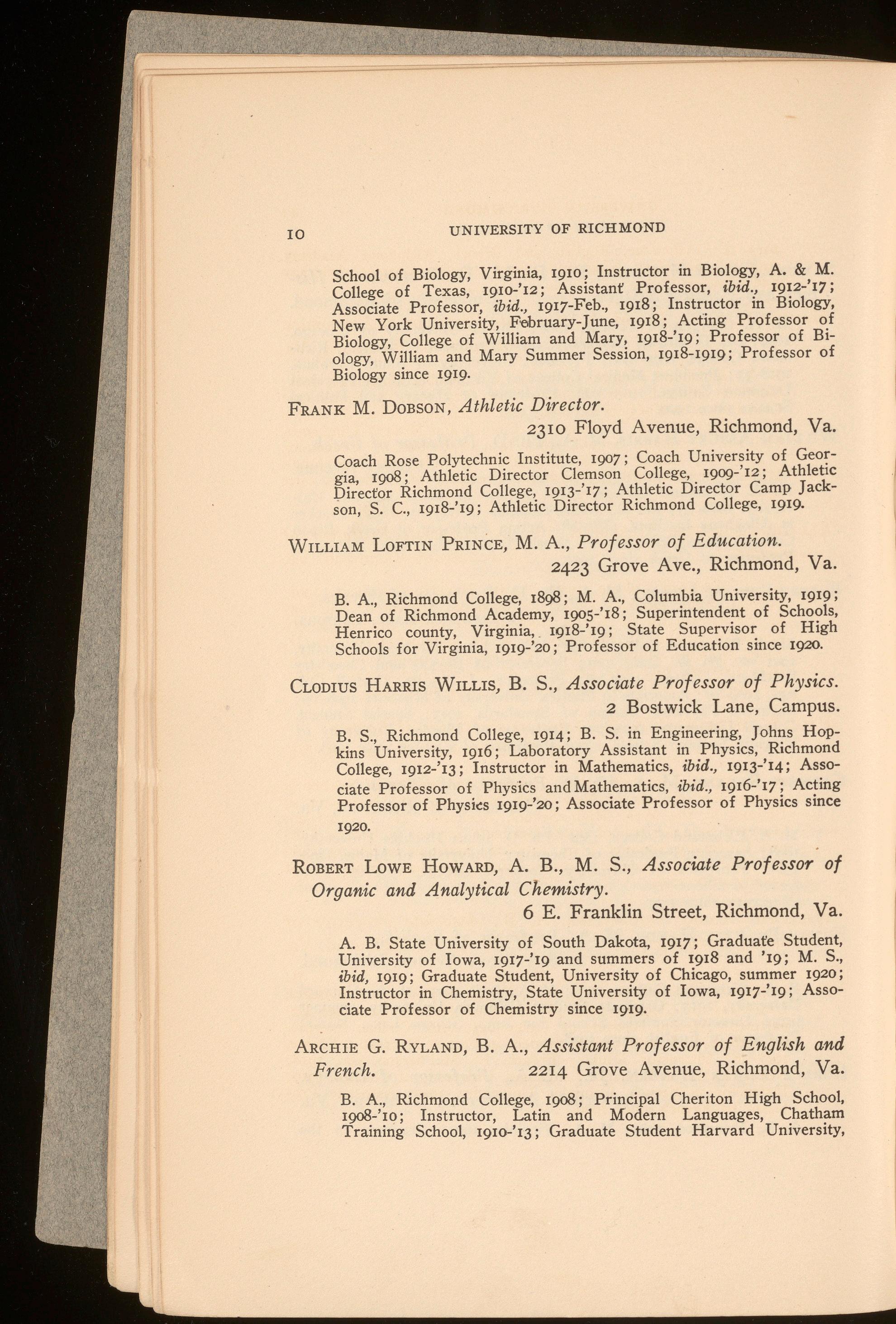
School of Biology, Virginia, 1910; Instructor in Biology, A. & M. College of Texas, 1910-'12; Assistant' Professor, ibid., 1912-'17; Associate Professor, ibid., 1917-Feb., 1918; Instructor in Biology, New York University, Fooruary-June, 1918; Acting Professor of Biology, College of William and Mary, 1918-'19; Professor of Biology, William and Mary Summer Session, 1918-1919; Professor of Biology since 1919.
FRANK M. DOBSON, Athletic Director.
2310 Floyd Avenue, Richmond, Va.
Coach Rose Polytechnic Institute, 1907; Coach University of Georgia, 1go8; Athletic Director Clemson College, 1909-'12; Athletic J,)irect'or Richmond College, 1913-'17; Athletic Director Camp Jackson, S. C., 1918-'19; Athletic Director Richmond College, 1919.
WILLIAM LOFTIN PRINCE, M. A., Professor of Education. 2423 Grove Ave., Richmond, Va.
B. A., Richmond College, 1898; M. A., Columbia University, 1919; Dean of Richmond Academy, 1905-'18; Superintendent of Schools, Henrico county, Virginia, . 1918-'19; State Supervisor of High Schools for Virginia, 1919-'20; Professor of Education since 1920.
Cwmus HARRIS WILLIS, B. S., Associate Professor of Physics. 2 Bostwick Lane, Campus.
B. S., Richmond College, 1914; B. S. in Engineering, Johns Hopkins University, 1916; Laboratory Assistant in Physics, Richmond College, 1912-'13; Instructor in Mathematics, ibid., 1913-'14; Associate Professor of Physics and Mathematics, ibid., 1916-'17; Acting Professor of Physi.:s 1919-'20; Associate Professor of Physics since 1920.
ROBERT LowE HowARD, A. B., M. S., Associate Professor of Organic and Analytical Chemistry. 6 E. Franklin Street, Richmond, Va.
A. B. State University of South Dakota, 1917; Graduat'e Student, University of Iowa, 1917-'19 and summers of 1918 and '19; M. S., ibid, 1919; Graduate Student, University of Chicago, summer 1920; Instructor in Chemistry, State University of Iowa, 1917-'19; Associate Professor of Chemistry since 1919.
ARCHIE G. RYLAND, B. A., Assistant Professor of English and French. 2214 Grove Avenue, Richmond, Va.
B. A., Richmond College, 1go8; Principal Cheriton High School, 1go8-'10; Instructor, Latin and Modern Languages, Chatham Training School, 1910-'13; Graduate Student Harvard University,
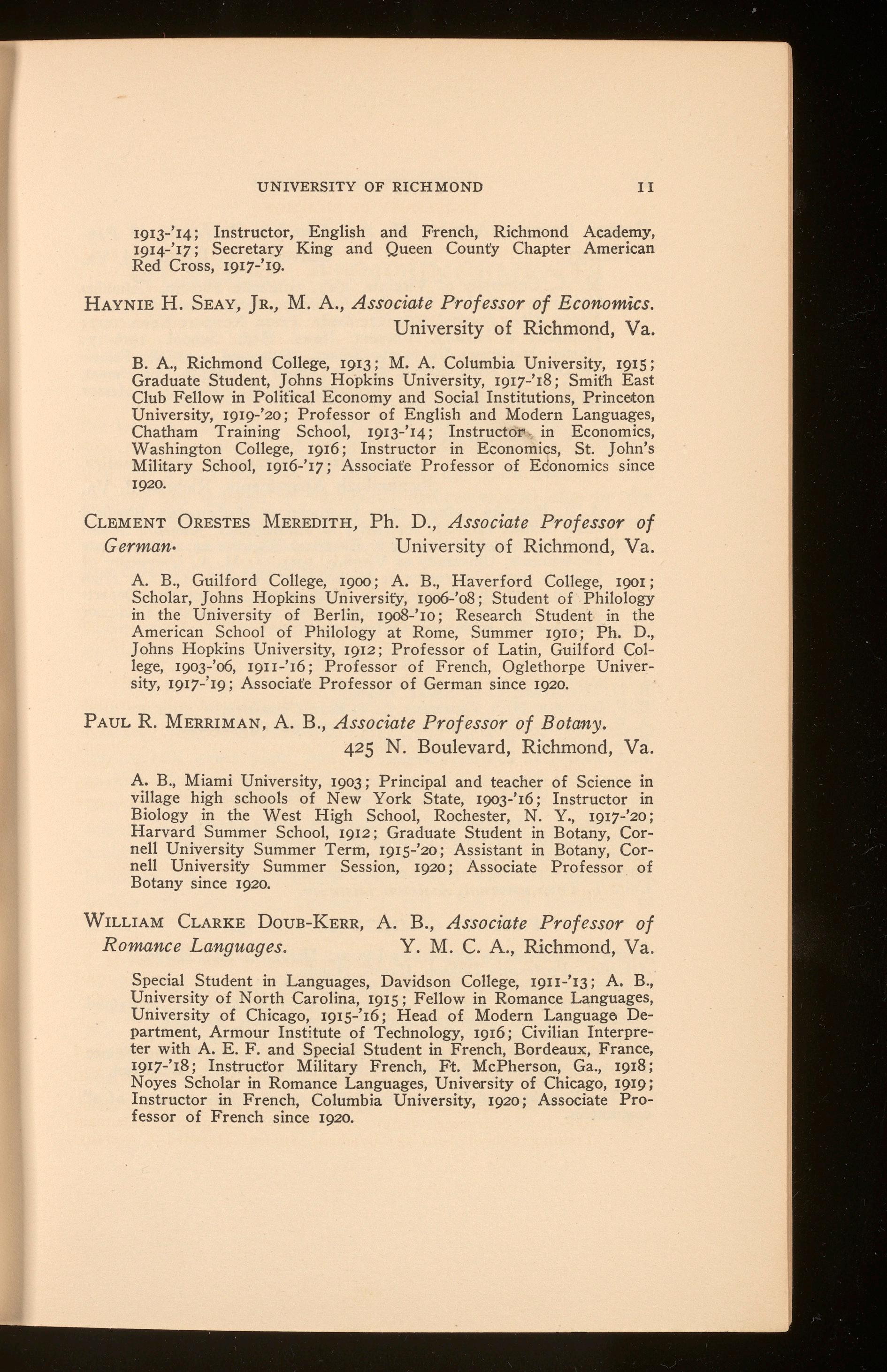
1913-'14; Instructor, English and French, Richmond Academy, 1914-'17; Secretary King and Queen Counfy Chapter American Red Cross, 1917-'19.
HAYNIE H. SEAY, JR., M. A., Associate Professor of Economics. University of Richmond, Va.
B. A., Richmond College, 1913; M. A. Columbia University, 1915; Graduate Student, Johns Hopkins University, 1917-'18; Smit'h East Club Fellow in Political Economy and Social Institutions, Prince,ton University, 1919-'20; Professor of English and Modern Languages, Chatham Training School, 1913-'14; lnstructol"I in Economics, Washington College, 1916; Instructor in Economics, St. John's Military School, 1916-'17; Associafe Professor of E2onomics since 1920.
Cu1MENT ORESTES MEREDITH, Ph. D., Associate Professor of German. University of Richmond, Va.
A. B., Guilford College, 1900; A. B., Haverford College, 1901; Scholar, Johns Hopkins Universify, 1go6-'o8; Student of Philology in the University of Berlin, 1908-'10; Research Student in the American School of Philology at Rome, Summer 1910; Ph. D., Johns Hopkins University, 1912; Professor of Latin, Guilford College, 1903-'o6, 1911-'16; Professor of French, Oglethorpe University, 1917-'19; Associafe Professor of German since 1920.
PAUL R. MERRIMAN, A. B., Associate Professor of Botany. 425 N. Boulevard, Richmond, Va.
A. B., Miami University, 1903; Principal and teacher of Science in village high schools of New York State, 1903-'16; Instructor in Biology in the West High School, Rochester, N. Y., 1917-'20; Harvard Summer School, 1912; Graduate Student in Botany, Cornell University Sum.mer Term, 1915-'20; Assistant in Botany, Cornell Universify Summer Session, 1920; Associate Professor of Botany since 1920.
WILLIAM CLARKE DouB-KERR, A. B., Associate Professor of Romance Languages. Y. M. C. A., Richmond, Va.
Special Student in Languages, Davidson College, 1911-'13; A. B., University of North Carolina, 1915; Fellow in Romance Languages, University of Chicago, 1915-'16; Head of Modern Language Department, Armour Institute of Technology, 1916; Civilian Interpreter with A. E. F. and Special Student in French, Bordeaux, France, 1917-'18; Instructor Military French, Ft. McPherson, Ga., 1918; Noyes Scholar in Romance Languages, University of Chicago, 1919; Instructor in French, Columbia University, 1920; Associate Professor of French since 1920.

RoBERT COLLINS AsTROP, M. A., Associate Professor of Psychology. University of Richmond, Va.
M. A., University of Virginia, 1913; Graduate Student, Columbia University, 1914-'15; The Sun, Baltimore, 1915; Associat'e Editor, Kappa Alpha Journal, 1915-'17; Daily Press, Newport News, 1917; Instructor in History, Newport' News High School, 1916-'17; Master, McGuire's University School, Richmond, 1917-'18; Principal Dendron High School, 1918-'19; Head of English Department, Randolph-Macon Academy, Bedford, 1919-'20; Associate Professor of Psychology since 1920.
CLARENCE DAVIS EHRMAN, A. B., M. A., Associate Professor of Mathematics. Shenandoah Apartments, Richmond, Va.
A. B., Roanoke College, 1911; Instructor in Mathematics, Bluefield High School, 1912-'13; Instructor in Mathematics, Jefferson School for Boys, 1913-'15; Student in Electrical Engineering and Graduate Department's, University of Virginia, 1913-'17; M. A., University of Virginia, 1917; Instructor in Mathematics, Asheville ( N. C.) High School, 1917-'18; Instructor in Mathemat:ics, Engineering Department, University of Wisconsin, 1919-'20; Associate Professor Mathemat'ics, Richmond College, 1920-'21.
STUDENT ASSIST ANTS
B. U. DAVENPORT,C. L. NEALE,Biology.
B. F. JOHNSON,H. S. CUMMINS,C. Y. Hm, Chemistry.
A. B. RuDD,JR., W. L. WHITE, L. M. WHITEHURST,Physics.
R. E. ALLEY,JR., R. E. GARST,English. B. A. BRANN,0. L. HITE, Library.
OTHER OFFICERS AND SECRET ARIES
ELIZABETHL. THOMASSON,M. A., Secretary to the President. MARYLIGHTFOOT,Secretary to Dean and Assistant Registrar. LEAH D. LYNN, Secretary to the Treasurer.
MRS. E. P. WEISIGER,Assistant to the Treasurer. Lucy T. THROCKMORTON,Assistant Librarian.
Courses and Degrees-Professors Loving, Handy, Prince, Harris. Athletics-Professors Dobson, Harris, Handy. Fraternities-Professors Garnett Ryland, Prince, Seay, Harris. Publicity and Public Lectures-Professors Mitchell, Willis, A. G. Ryland. Student Affairs-Professors Handy, Hayden, Astrop, Meredith. Alumni-Professors Harris, Willis, Seay, A. G. Ryland. Religious Life and Exercises-Professors Loving, Garnett Ryland, Prince. Student Employment-Professors Prince, Barnett, Willis, Merriman.
The President and Dean of the College are ex-officio members of all committees.
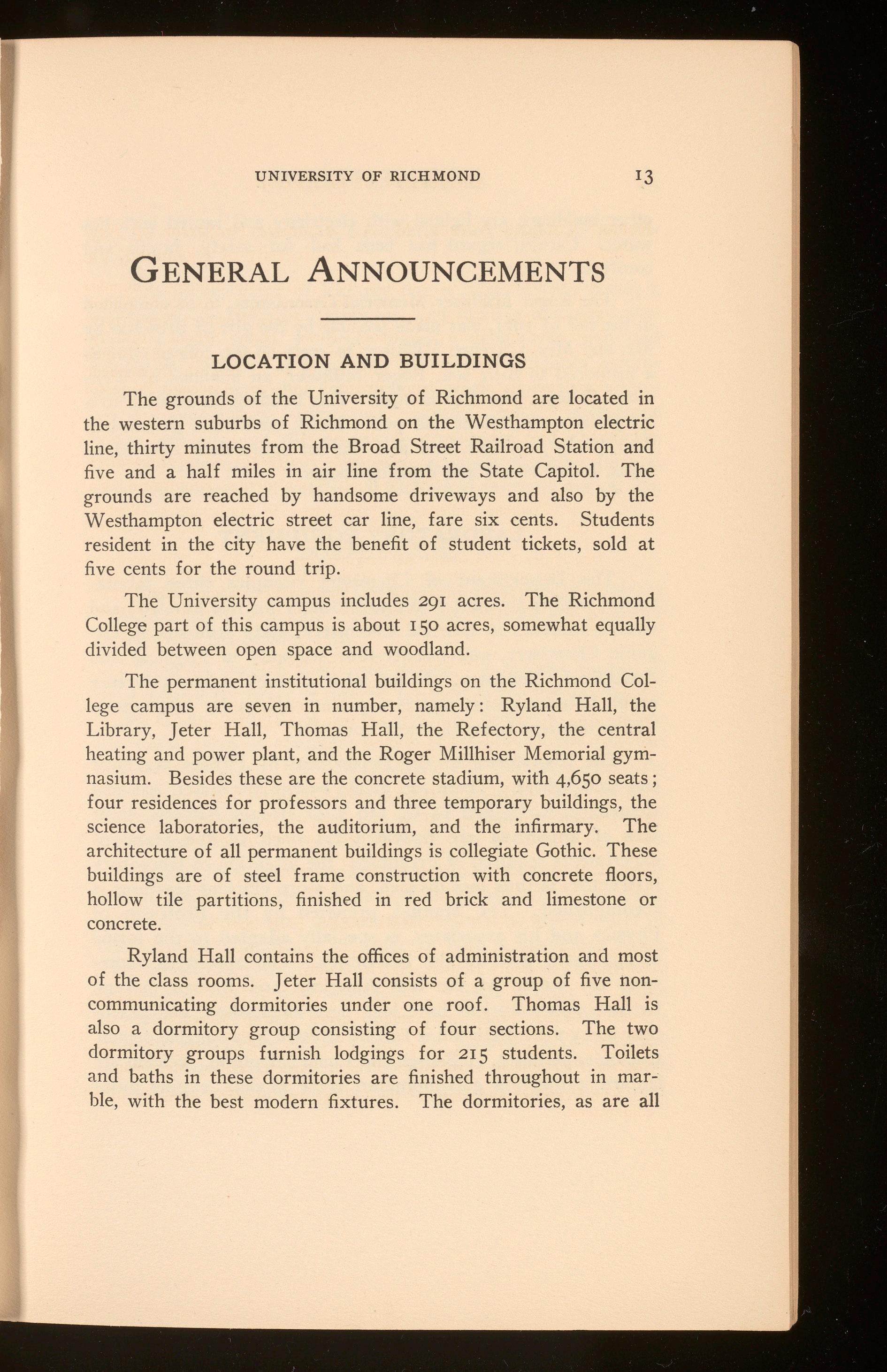
The grounds of the University of Richmond are located in the western suburbs of Richmond on the Westhampton electric line, thirty minutes from the Broad Street Railroad Station and five and a half miles in air line from the State Capitol. The grounds are reached by handsome driveways and also by the Westhampton electric street car line, fare six cents. Students resident in the city have the benefit of student tickets, sold at five cents for the round trip.
The University campus includes 291 acres. The Richmond College part of this campus is about r 50 acres, somewhat equally divided between open space and woodland.
The permanent institutional buildings on the Richmond College campus are seven in number, namely: Ryland Hall, the Library, Jeter Hall, Thomas Hall, the Refectory, the central heating and power plant, and the Roger Millhiser Memorial gymnasium. Besides these are the concrete stadium, with 4,650 seats; four residences for professors and three temporary buildings, the science laboratories, the auditorium, and the infirmary. The architecture of all permanent buildings is collegiate Gothic. These buildings are of steel frame construction with concrete floors, hollow tile partitions, finished in red brick and limestone or concrete.
Ryland Hall contains the offices of administration and most of the class rooms. Jeter Hall consists of a group of five noncommunicating dormitories under one roof. Thomas Hall is also a dormitory group consisting of four sections. The two dormitory groups furnish lodgings for 2 r 5 students. Toilets and baths in these dormitories are finished throughout in marble, with the best modern fixtures. The dormitories, as are all
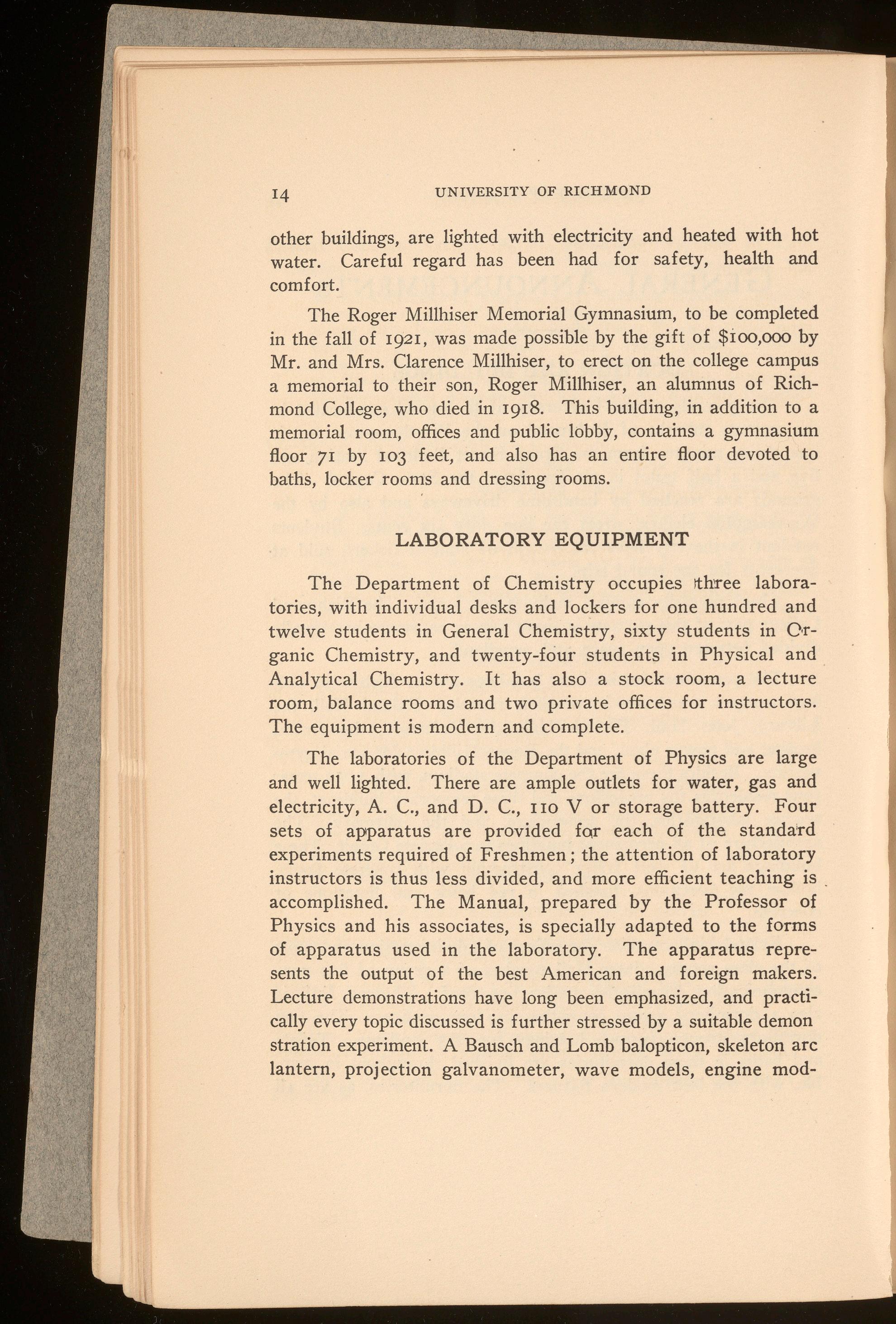
other buildings, are lighted with electricity and heated with hot water. Careful regard has been had for safety, health and comfort.
The Roger Millhiser Memorial Gymnasium, to be completed in the fall of 1921, was made possible by the gift of $ioo,ooo by Mr . and Mrs. Clarence Millhiser, to erect on the college campus a memorial to their son, Roger Millhiser, an alumnus of Richmond College, who died in 1918. This building, in addition to a memorial room, offices and public lobby, contains a gymnasium floor 71 by 103 feet, and also has an entire floor devoted to baths, locker rooms and dressing rooms.
The Department of Chemistry occupies rt:hree laboratories, with individual desks and lockers for one hundred and twelve students in General Chemistry, sixty students in Organic Chemistry, and twenty-four students in Physical and Analytical Chemistry. It has also a stock room, a lecture room, balance rooms and two private offices for instructors. The equipment is modern and complete.
The laboratories of the Department of Physics are large and well lighted. There are ample outlets for water, gas and electricity, A. C., and D. C., IIO V or storage battery. Four sets of apparatus are provided for each of the standa 'rd experiments required of Freshmen; the attention of laboratory instructors is thus less divided, and more efficient teaching is accomplished. The Manual, prepared by the Professor of Physics and his associates, is specially adapted to the forms of apparatus used in the laboratory. The apparatus represents the output of the best American and foreign makers. Lecture demonstrations have long been emphasized, and practically every topic discussed is further stressed by a suitable demon stration experiment. A Bausch and Lomb balopticon, skeleton arc lantern, projection galvanometer, wave models, engine mod-
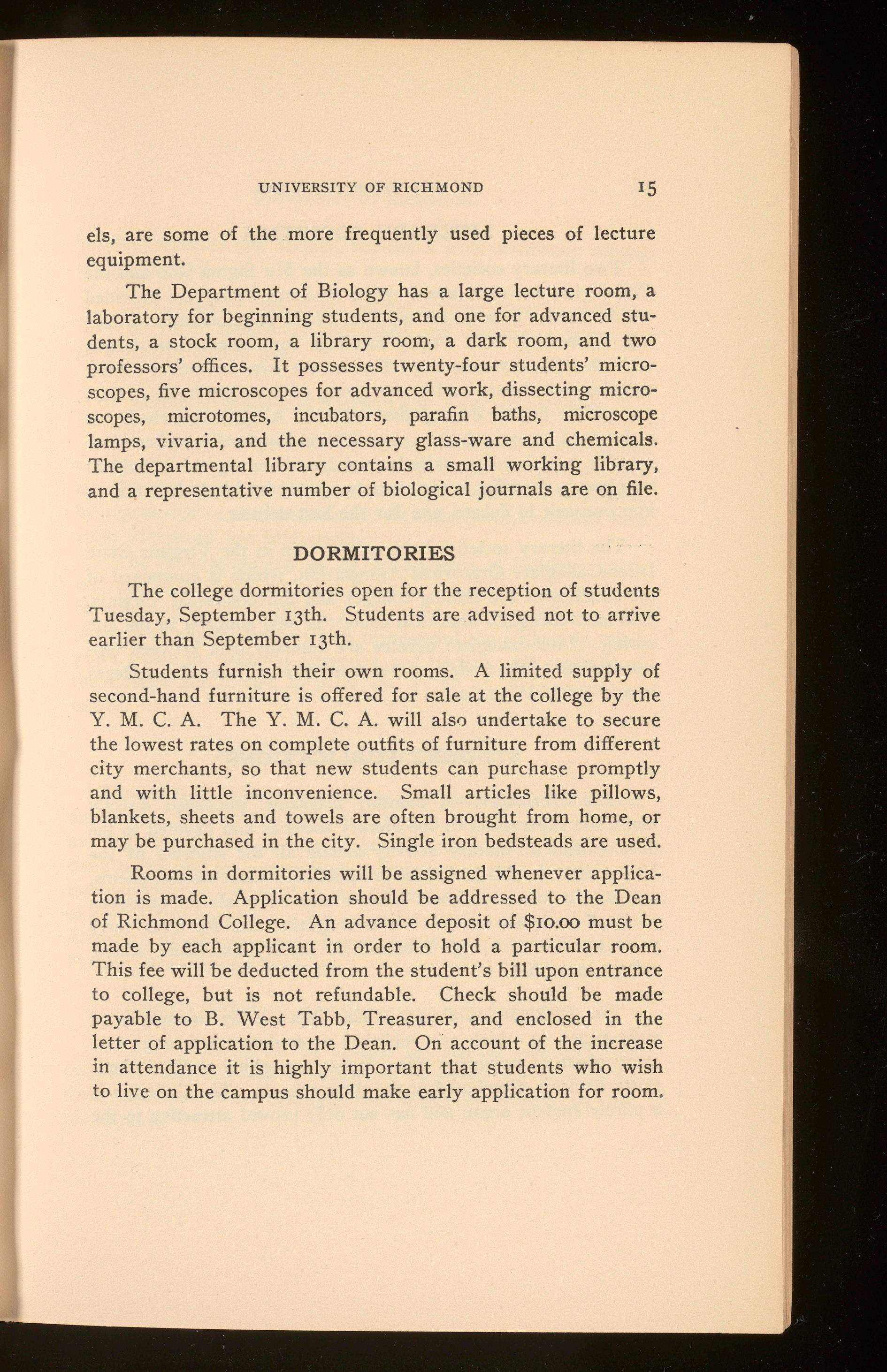
els, are some of the more frequently used pieces of lecture equipment.
The Department of Biology has a large lecture room, a laboratory for beginning students, and one for advanced students, a stock room, a library room, a dark room, and two professors' offices. It possesses twenty-four students' microscopes, five microscopes for advanced work, dissecting microscopes, microtomes, incubators, parafin baths, microscope lamps, vivaria, and the necessary glass-ware and chemicals. The departmental library contains a small working library, and a representative number of biological journals are on file.
The college dormitories open for the reception of students Tuesday, September 13th. Students are advised not to arrive earlier than September 13th.
Students furnish their own rooms. A limited supply of second-hand furniture is offered for sale at the college by the Y. M. C. A. The Y. M. C. A. will also undertake to secure the lowest rates on complete outfits of furniture from different city merchants, so that new students can purchase promptly and with little inconvenience. Small articles like pillows, blankets, sheets and towels are often brought from home, or may be purchased in the city. Single iron bedsteads are used.
Rooms in dormitories will be assigned whenever application is made. Application should be addressed to the Dean of Richmond College. An advance deposit of $ro.oo must be made by each applicant in order to hold a particular room. This fee will be deducted from the student's bill upon entrance to college, but is not refundable. Check should be made payable to B. West Tabb, Treasurer, and enclosed in the letter of application to the Dean. On account of the increase in attendance it is highly important that students who wish to live on the campus should make early application for room.
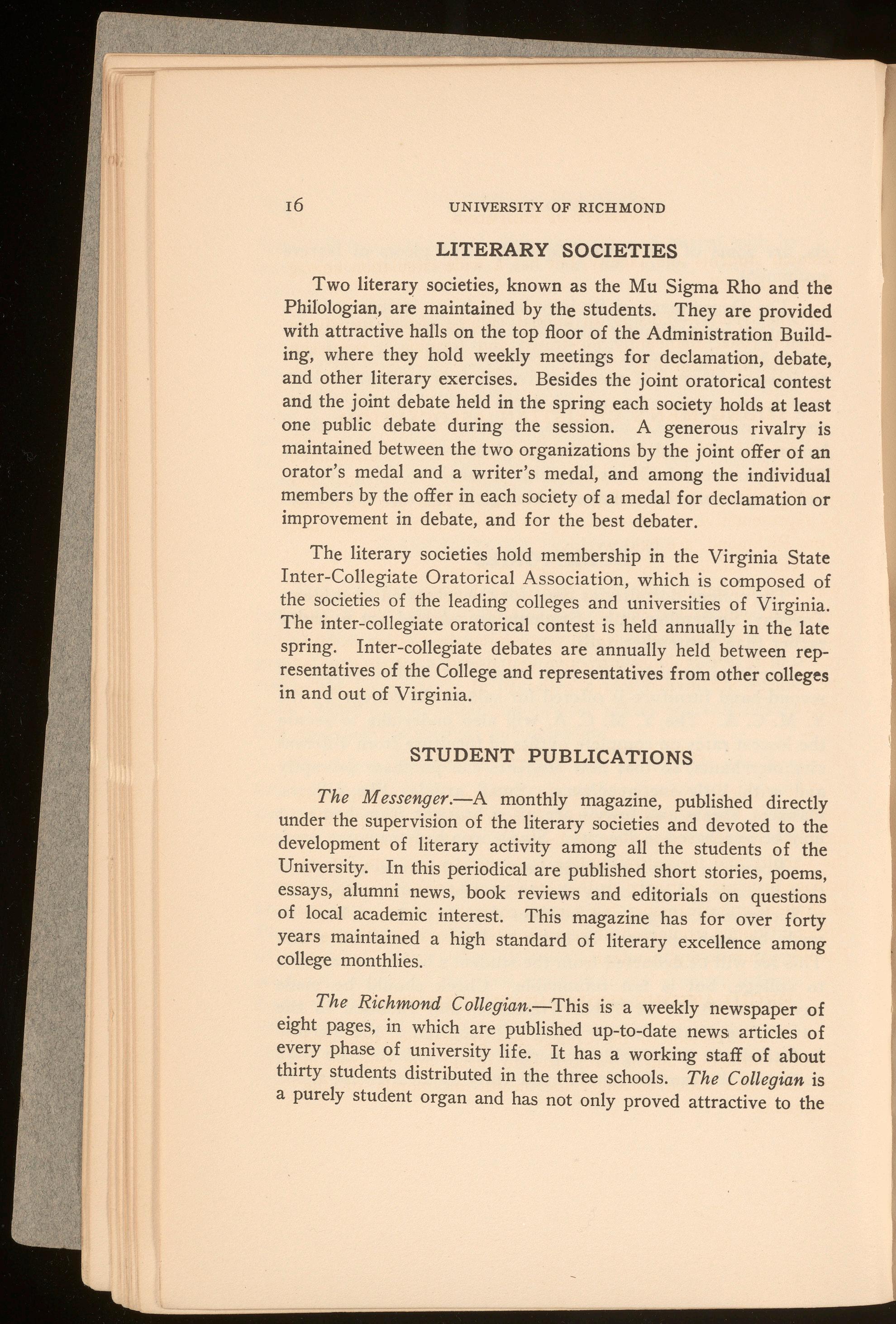
Two literary societies, known as the Mu Sigma Rho and the Philologian, are maintained by the students. They are provided with attractive halls on the top floor of the Administration Building, where they hold weekly meetings for declamation, debate, and other literary exercises. Besides the joint oratorical contest and the joint debate held in the spring each society holds at least one public debate during the session. A generous rivalry is maintained between the two organizations by the joint offer of an orator's medal and a writer's medal, and among the individual members by the offer in each society of a medal for declamation or improvement in debate, and for the best debater.
The literary societies hold membership in the Virginia State Inter-Collegiate Oratorical Association, which is composed of the societies of the leading colleges and universities of Virginia. The inter-collegiate oratorical contest is held annually in the late spring. Inter-collegiate debates are annually held between representatives of the College and representatives from other colleges in and out of Virginia.
The M essenger.-A monthly magazine, published directly under the supervision of the literary societies and devoted to the development of literary activity among all the students of the University. In this periodical are published short stories, poems, essays, alumni news, book reviews and editorials on questions of local academic interest. This magazine has for over forty years maintained a high standard of literary excellence among college monthlies.
The Richmond Collegian.-This is a weekly newspaper of eight pages, in which are published up-to-date news articles of every phase of university life. It has a working staff of about thirty students distributed in the three schools. The Collegian is a purely student organ and has not only proved attractive to the
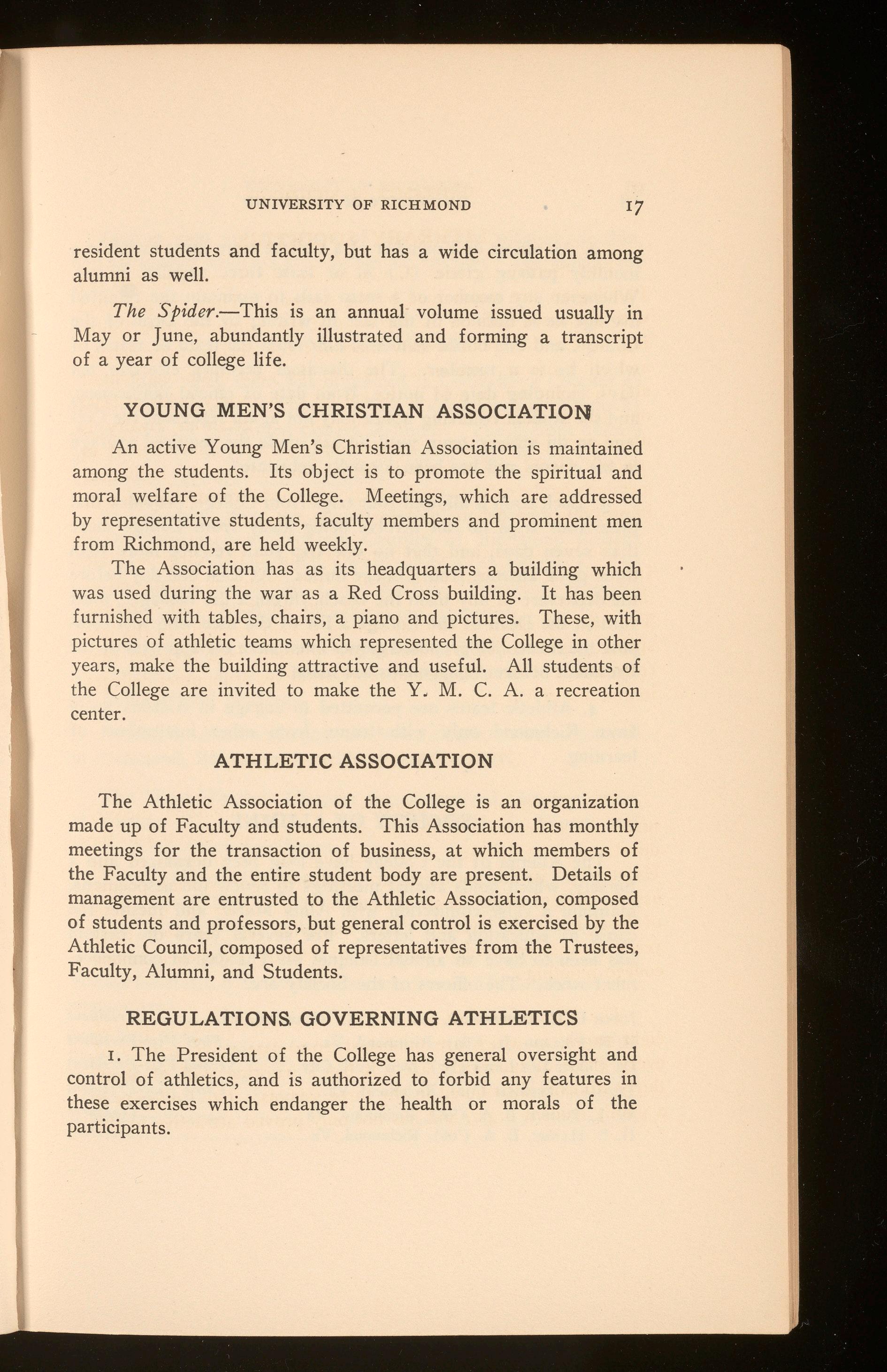
resident students and faculty, but has a wide circulation among alumni as well.
The S pider -This is an annual volume issued usually in May or June, abundantly illustrated and forming a transcript of a year of college life.
An active Young Men's Christian Association is maintained among the students. Its object is to promote the spiritual and moral welfare of the College. Meetings, which are addressed by representative students, faculty members and prominent men from Richmond, are held weekly.
The Association has as its headquarters a building which was used during the war as a Red Cross building. It has been furnished with tables, chairs, a piano and pictures. These, with pictures of athletic teams which represented the College in other years, make the building attractive and useful. All students of the College are invited to make the Y. M. C. A. a recreation center.
The Athletic Association of the College is an organization made up of Faculty and students. This Association has monthly meetings for the transaction of business, at which members of the Faculty and the entire student body are present. Details of management are entrusted to the Athletic Association, composed of students and professors, but general control is exercised by the Athletic Council, composed of representatives from the Trustees, Faculty, Alumni, and Students.
I. The President of the College has general oversight and control of athletics, and is authorized to forbid any features in these exercises which endanger the health or morals of the participants.
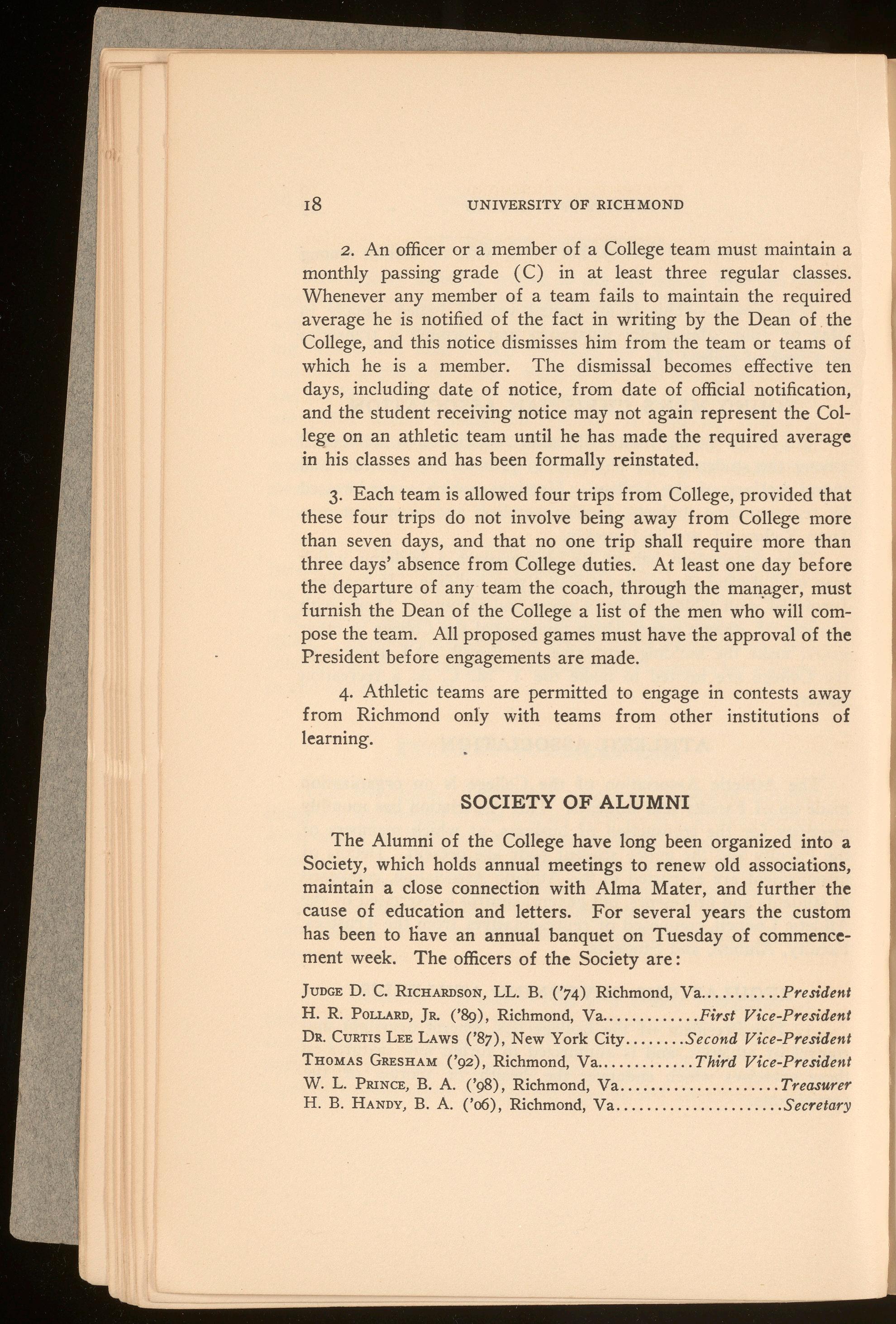
2. An officer or a member of a College team must maintain a monthly passing grade (C) in at least three regular classes. Whenever any member of a team fails to maintain the required average he is notified of the fact in writing by the Dean of the College, and this notice dismisses him from the team or teams of which he is a member. The dismissal becomes effective ten days, including date of notice, from date of official notification, and the student receiving notice may not again represent the College on an athletic team until he has made the required average in his classes and has been formally reinstated.
3. Each team is allowed four trips from College, provided that these four trips do not involve being away from College more than seven days, and that no one trip shall require more than three days' absence from College duties. At least one day before the departure of any team the coach, through the man ager, must furnish the Dean of the College a list of the men who will compose the team. All proposed games must have the approval of the President before engagements are made.
4. Athletic teams are permitted to engage in contests away from Richmond only with teams from other institutions of learning.
The Alumni of the College have long been organized into a Society, which holds annual meetings to renew old associations, maintain a close connection with Alma Mater, and further the cause of education and letters. For several years the custom has been to liave an annual banquet on Tuesday of commencement week. The officers of the Society are:
JUDGED. C. RICHARDSON,LL. B. ('74) Richmond, Va .......... President
H R. POLI.ARD,JR. ('Sg), Richmond, Va ... . ........ . First Vice-President
DR. CURTISLEE LAWS ('87), New York City ...... .Second Vice-President
THOMASGRESHAM('92), Richmond, Va ............. Third Vice-President
W. L. PRINCE,B. A. ('98), Richmond, Va ............. Treasurer
H. B. HANDY,B. A. ('o6), Richmond, Va ........ . Secretary
Degree men are members of the Society without election, and all former students are eligible for election. The annual fee is $1.00.
In May, 1898, there was organized in Louisville a Chapter of the General Society of Alumni, which is known as the "Kentucky Association of Richmond College Alumni." The present officers are Dr. S. E. Woody, Louisville, President; Dr. W. 0. Carver, Louisville, Secretary and Treasurer.
In February, 1899, the alumni resident in Norfolk, Va., and vicinity organized a "Norfolk Chapter of Richmond College Alumni." The chapter holds annual meetings in February. The present officers are L. B. Cox, Norfolk, President; Burnley Lankford, Esq., Norfolk, Secretary and Treasurer.
In April, 1903, there was organized in Newport News, Va., a "Peninsula Chapter of Richmond College Alumni." The chapter holds annual meetings.
During the session of 1905-'06 alumni chapters were organized in Richmond, Baltimore, Lynchburg and Roanoke.
The West Virginia Chapter was organized October, 1910, at Hinton, W. Va., with J. W. Mitchell, M. L. Wood, and W. L. Richardson as officers.
The Richmond Chapter holds its annual meeting on March 4th, "Founders' Day." The officers of the Chapter are Col. John A. Cutchins, President; Claude M. Dean, Secretary-Treasurer.
In May, 1916, a New York Chapter was organized at the Waldorf-Astoria with twenty-nine members. The officers of this chapter are :
JESSE READ TAYLOR
CHARLES MARSHALL GRAVES.
HENRY K. ELLYSON, JR
CURTIS LEE LAWS
J. LAURENS ELMORE

Vice-President
Treasurer
Secretary

In June, 1920, a Chapter of Alumni was organized in Danville, Va. Rev. J. E. Hicks, D. D., was elected President.
Tne President of the College will be glad to correspond with alumni who desire to form local associations.
I. The Tanner Medal-Founded by Colonel William E. Tanner, of Richmond, Va., in honor of his parents, John F. and Harriet L. Tanner-is given to the most proficient graduate in the Department of Greek.
II. The James D. Crump Prize-Founded by the gentleman whose name it bears-is a prize of twenty dollars in gold, given for excellence in Course 2 in Mathematics. It is awarded in part on the regular class work and in part on extra work.
IV. The J. Taylor Ellyson Medal in History.-LieutenantGovernor J. Taylor Ellyson, of Richmond, established in 1912 a prize to be awarded to the student in the Department of History and Political Science, who shall present the best piece of original investigation in Virginia or Southern History.
In response to a petition from the student body, members of the Faculty, who were also members of the College SocietyPhi Beta Kappa -organized a scholarship society in Richmond College to be known as the Arachnidre. In order to be eligible to the Arachnidre, a student must have maintained an average grade of 90 per cent. throughout the College course, he must belong to the first sixth of the graduating class on the basis of scholarship, and he must have good character. Election is by the Faculty from a list of eligibles presented by a Faculty Committee of Phi Beta Kappa and Arachnidre men.
The Society of Arachnidre has been extended to include members from Westhampton College.
The elections for 1920 were as follows:
D. C. ASHTON
G.B. BRIEL
RUTH CARVER
M. E. COOPER
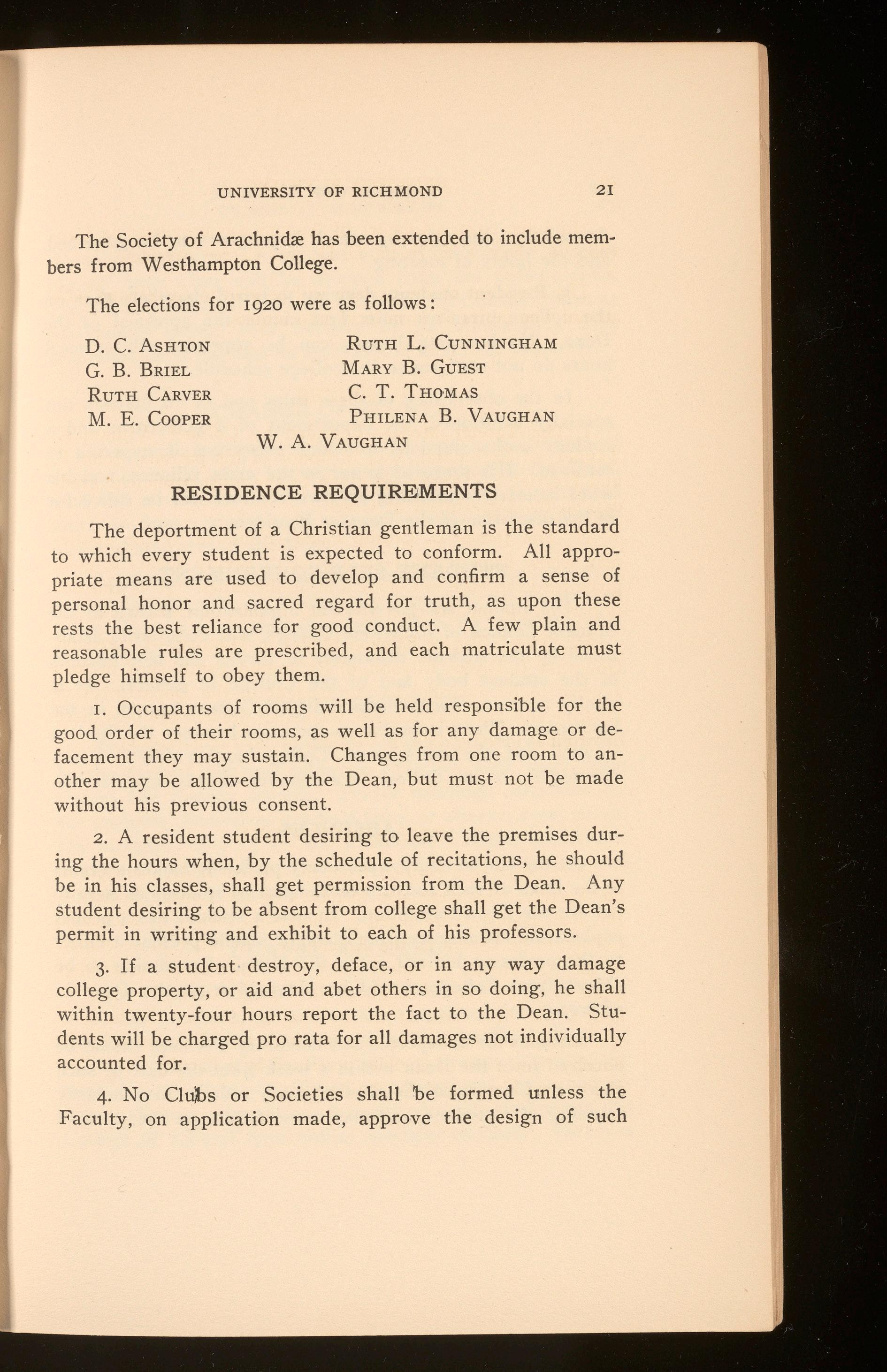
RUTH L. CUNNINGHAM
MARY B. GUEST
C. T. THOMAS
PHILENA B. VAUGHAN
w. A. VAUGHAN
The deportment of a Christian gentleman is the standard to which every student is expected to conform. All appropriate means are used to develop and confirm a sense of personal honor and sacred regard for truth, as upon these rests the best reliance for good conduct. A few plain and reasonable rules are prescribed, and each matriculate must pledge himself to obey them.
I. Occupants of rooms will be held responsible for the go od order of their rooms, as well as for any damage or defacement they may sustain. Changes from one room to another may be allowed by the Dean, but must not be made without his previous consent.
2. A resident student desiring to leave the premises during the hours when, by the schedule of recitations, he should be in his classes, shall get permission from the Dean . Any student desiring to be absent from college shall get the Dean's permit in writing and exhibit to each of his professors .
3. If a student destroy, deface, or in any way damage college property, or aid and abet others in so doing, he shall within twenty-four hours report the fact to the Dean. Students will be charged pro rata for all damages not individually accounted for.
4. No Clubs or Societies shall 'be formed unless the Faculty, on application made, approve the design of such

Association, the rules by which it proposes to be governed, and the hours of meeting.
5. Resident students desiring to board elsewhere than on the college premises must first obtain the approval of the Dean. No boarding houses can be approved whose meal hours do not conform to the college schedule.
In the observance of these rules and in all matters not specially mentioned, the deportment of a gentleman and a student is the standard to which every one is expected to conform. His sense of honor is the main reliance, and his word in matters touching his own conduct will be called for at the discretion of the Dean or President.
The student self-government organization, known as the Student Council of Richmond College, was voluntarily established by the students themselves to further the best interests of the student body and of the College in general. It is vitally concerned with maintaining the honor system in the institution. There is cordial co-operation between the Student Council and the constituted College authorities. Every matriculate of the College is a member of this organization.
At the end of every week every professor makes a report to the Dean of such absences on the part of students as seem to call for the Dean's attention. In case a student has a proper explanation for absence from class, he should present it either to the professor himself or to the Dean. Permission to be absent from College should be obtained from the Dean in advance.
Excuses for unexpected but necessary absences should be obtained from the Dean within a week from the date of such absence. Unexcused absences seriously reduce the scholastic standing of a student, and may cause failure on the work of
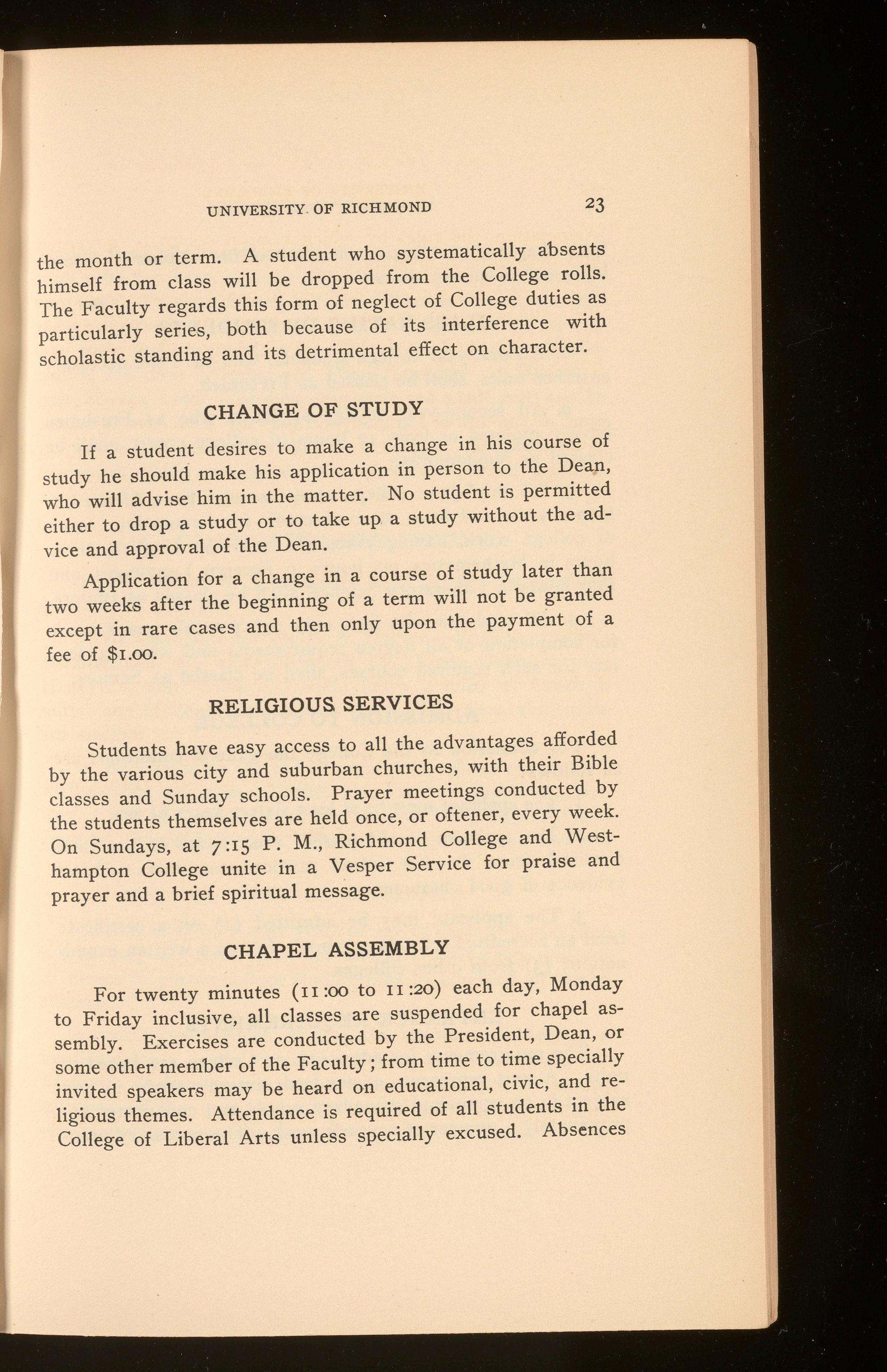
the month or term. A student who systematically absents himself from class will be dropped from the College rolls. The Faculty regards this form of neglect of College duties as particularly series, both because of its interference with scholastic standing and its detrimental effect on character.
If a student desires to make a change in his course of study he should make his application in person to the Dean, who will advise him in the matter. No student is permitted either to drop a study or to take up a study without the adv ice and approval of the Dean.
Application for a change in a course of study later than two weeks after the beginning of a term will not be granted except in rare cases and then only upon the payment of a fee of $1.00.
Students have easy access to all the advantages afforded by the various city and suburban churches, with their Bible classes and Sunday schools. Prayer meetings conducted by the students themselves are held once, or oftener, every week. On Sundays, at 7 :15 P. M., Richmond College and Westhampton College unite in a Vesper Service for praise and prayer and a brief spiritual message.
For twenty minutes (11 :oo to II :20) each day, Monday to Friday inclusive, all classes are suspended for chapel assembly. Exercises are conducted by the President, Dean, or some other member of the Faculty; from time to time specially invited speakers may be heard on educational, civic, and religious themes. Attendance is required of all students in the College of Liberal Arts unless specially excused. Absences
from chapel amounting to one-tenth of the number of assem- blies each term are allowed.
1. All first-year college students, who have the necessary entrance units, shall be classed as Freshmen.
2. All second-year college students, who as Freshmen have completed at least 12 hours of college credit, shall be classed as Sophomores.
3. All third-year college students who have fifteen en- trance units and have received credit for twenty-four hours of college work, having taken six hours in English, three hours in Mathematics, six hours in Foreign Languages, and four hours in Laboratory Science, shall be classed as Juniors.
4. All students who lack only one possible year's work for completion of all degree requirements and who matricu- late for such required courses, shall be classed as Seniors.
For admission to the College the general conditions are as follows:
1. The applicant must be at least sixteen years of age.
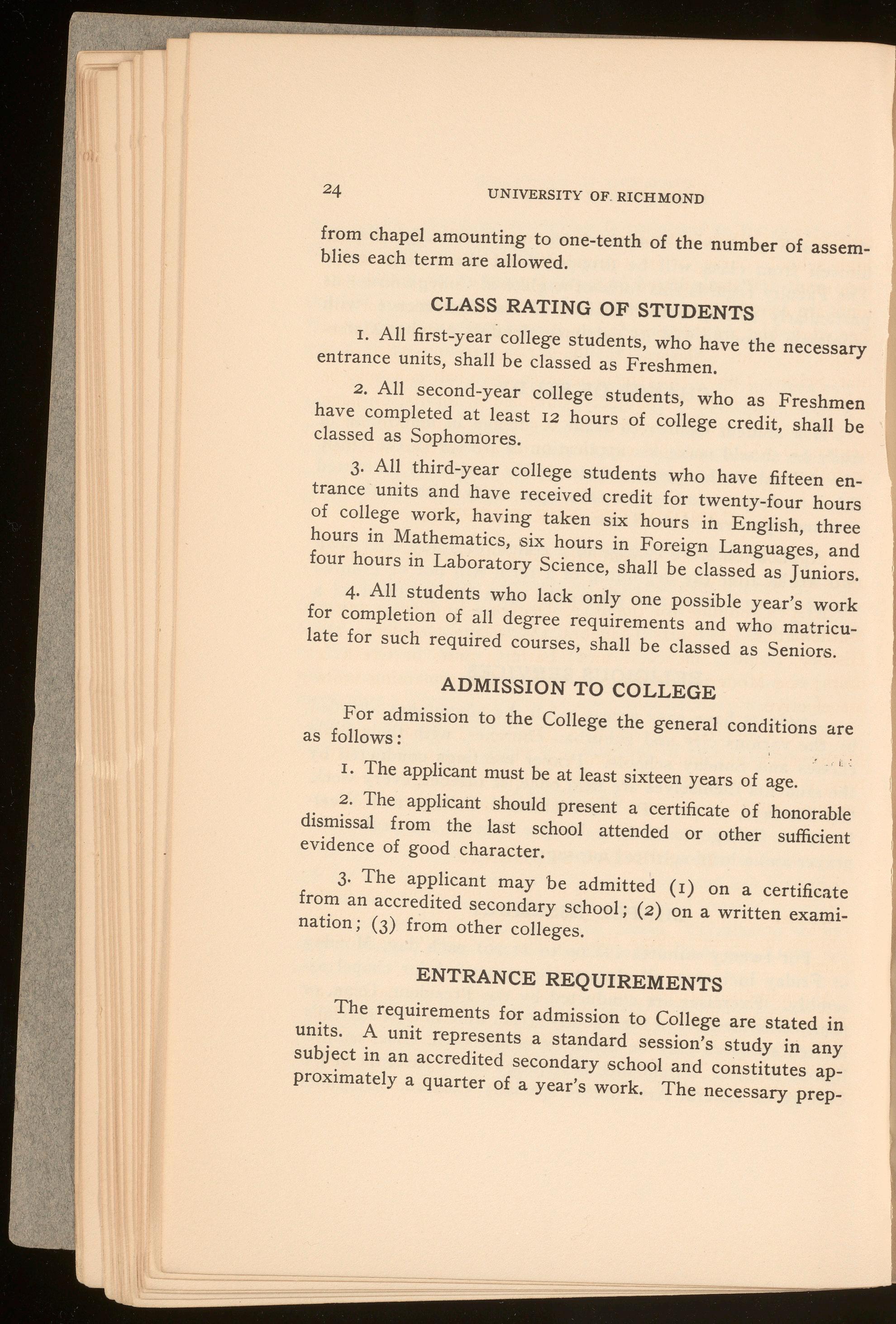
• . , 1.-:
2. The applicant should present a certificate of honorable dismissal from the last school attended or other sufficient evidence of good character.
3. The applicant may be admitted (1) on a certificate from an accredited secondary school; (2) on a written exami- nation; (3) from other colleges.
The requirements for admission to College are stated in units. A unit represents a standard session's study in any subject in an accredited secondary school and constitutes ap- proximately a quarter of a year's work. The necessary prep-
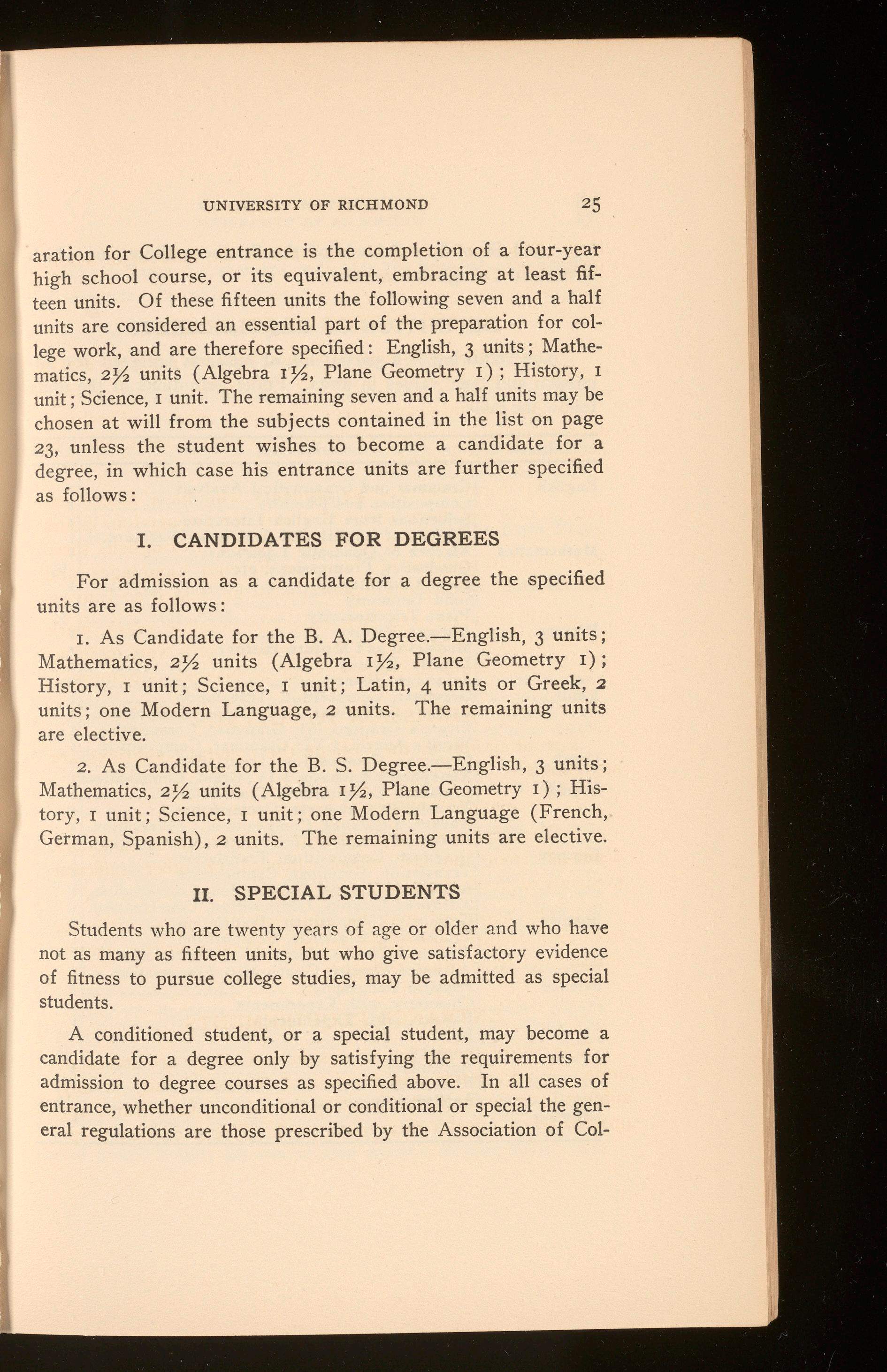
aration for College entrance is the completion of a four-year high school course, or its equivalent, embracing at least fifteen units. Of these fifteen units the following seven and a half units are considered an essential part of the preparation for college work, and are therefore specified: English, 3 units; Mathematics, 2¾ units (Algebra I¼, Plane Geometry 1); History, 1 unit; Science, I unit. The remaining seven and a half units may be chosen at will from the subjects contained in the list on page 23, unless the student wishes to become a candidate for a degree, in which case his entrance units are further specified as follows:
For admission as a candidate for a degree the specified units are as follows :
1. As Candidate for the B. A. Degree.-English, 3 units; Mathematics, 2¾ units (Algebra 1¼, Plane Geometry 1); History, I unit; Science, 1 unit; Latin, 4 units or Greek, 2 units; one Modern Language, 2 units. The remaining units are elective.
2. As Candidate for the B. S. Degree.-English, 3 units; Mathematics, 2 ¾ units ( Algebra 1 ¼, Plane Geometry 1) ; History, I unit; Science, I unit; one Modern Language (French, German, Spanish), 2 units. The remaining units are elective.
Students who are twenty years of age or older and who have not as many as fifteen units, but who give satisfactory evidence of fitness to pursue college studies, may be admitted as special students.
A conditioned student, or a special student, may become a candidate for a degree only by satisfying the requirements for admission to degree courses as specified above. In all cases of entrance, whether unconditional or conditional or special the general regulations are those prescribed by the Association of Col-

UNIVERSITY OF RICHMOND
leges and Secondary Schools of the Southern States, of which Richmond College is a member.
The following is a partial list of subjects accepted for admission and their values in units. Fuller definitions of the unit s follow the table .
Grammar and Grammatical Analysis. .
1 Composition and Rhetoric .................. I Selections from English Literature ........ I History of English and American Literature ... I Algebra to Quadratic Equations I Quadratics, Progressions, etc. .
Plane Geometry
1 ISolid Geometr y
Plane Trigonometry
Ancient History
1 Mediaeval and Modern History.
I English History
American History
Grammar, Composition, Translation
I Caesar's Gallic War, I-IV; Gram., Composition. I Cicero's Orations (6); Grammar, Composition . I Virgil's Aeneid, I-VI; Grammar, Composition .. 1 IGrammar, Composition, Translation
I Xenophon's Anabasis, I-IV; Gram., Composition 1 Grammar, Composition, Translation ....... I Translation, Grammar, Composition. .
I Advanced Classics, Composition, Conversation. I Advanced Classics, Composition, Conversation. I IGrammar, Composition, Translation I ITranslation, Grammar, Composition
I Advanced Classics, Composition, Conversation. I ! Advanced Classics, Composition, Conversation. I Grammar, Composition, Translation .
I Translation, Grammar, Composition ......
r !Advanced Classics, Composition, Conversation
,I Advanced Classics, Composition, Conversation. I Physical Geography .
I Chemistry, with Experiments ............ I Physics, with Experiments
I Botany
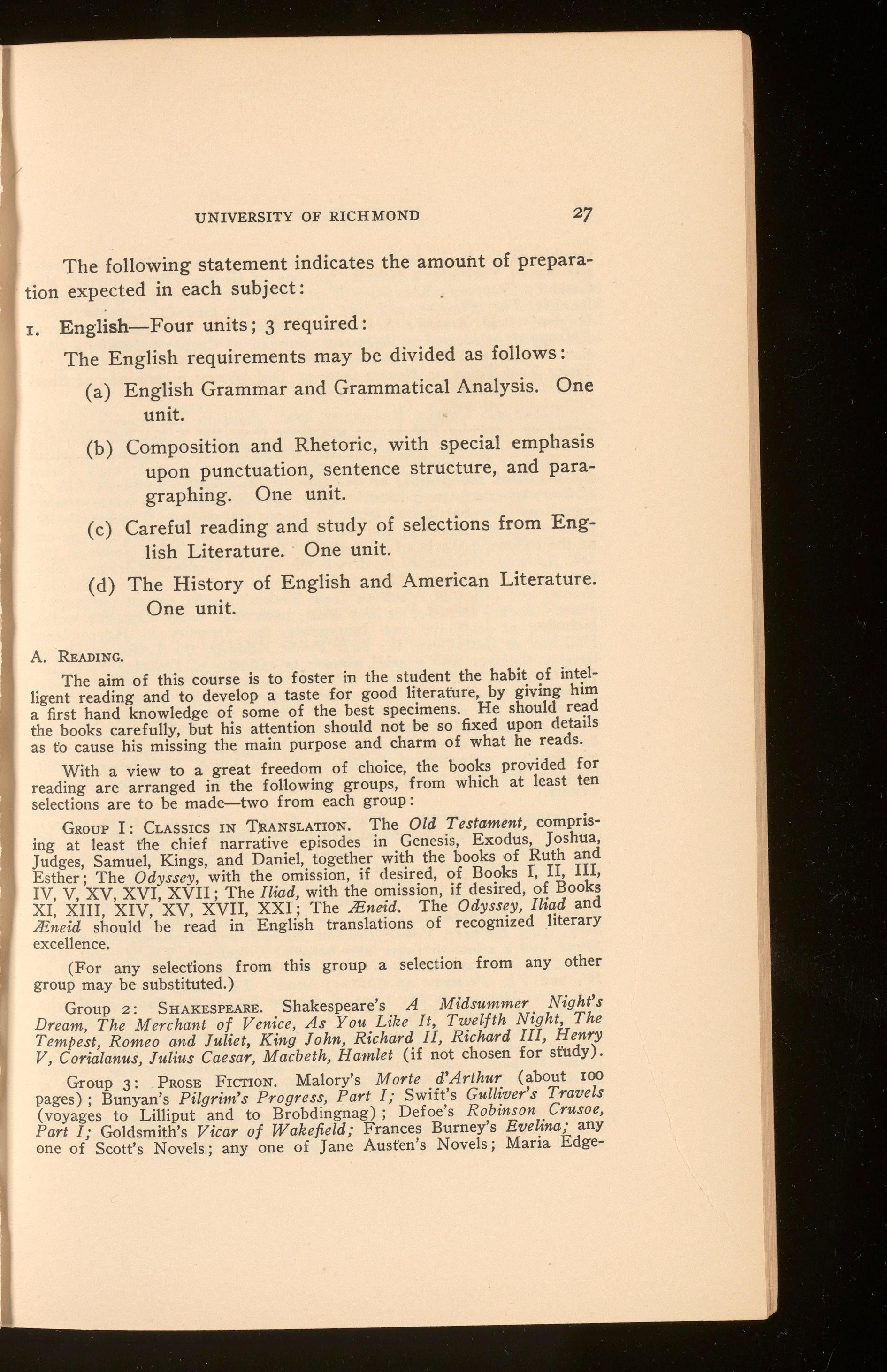
The following statement indicates the amount of preparation expected in each subject:
I. English-Four units; 3 required:
The English requirements may be divided as follows:
(a) English Grammar and Grammatical Analysis. One unit.
(b) Composition and Rhetoric, with special emphasis upon punctuation, sentence structure, and paragraphing. One unit.
( c) Careful reading and study of selections from English Literature. One unit.
(d) The History of English and American Literature. One unit.
A. READING.
The aim of this course is to foster in the student the habit of intelligent reading and to develop a taste for good literafure, by giving him a first hand knowledge of some of the best specimens. He should read the books carefully, but his attention should not be so fixed upon details as t'o cause his missing the main purpose and charm of what he reads.
With a view to a great freedom of choice, the books provided for reading are arranged in the following groups, from which at least ten selections are to be made-two from each group:
GROUPI: CLASSICSIN T;RANSLATION.The Old Testament, comprising at least t'he chief narrative episodes in Genesis, Exodus, Joshua, Judges, Samuel, Kings, and Daniel, together with the books of Ruth and Esther; The Odyssey, with the omission, if desired, of Books I, II, III, IV, V, XV, XVI, XVII ; The Iliad, with the omission, if desired, of Books XI, XIII, XIV, XV, XVII, XXI; The lEneid. The Odyssey, Iliad and AJ,neid should be read in English translations of recognized literary excellence.
(For any select'ions from this group a selection from any other group may be substituted.)
Group 2: SHAKESPEARE.Shakespeare's A Midsummer Night's Dream, The Merchant of Venice, As You Lilze It, Twelfth Night, The Tempest, Romeo and Juliet, King John, Richard II, Richard Ill, Henry V, Coria/anus, Julius Caesar, Macbeth, Hamlet (if not chosen for study).
Group 3: PROSE FICTION. Malory's Marte d'Arthur (about 100 pages); Bunyan's Pilgrim's Progress, Part I; Swift's Gulliver's Travels ( voyages to Lilliput and to Brobdingnag) ; Defoe's Robinson Crusoe, Part I; Goldsmith's Vicar of Wakefield; Frances Burney's Evelina; any one of Scott's Novels; any one of Jane Austen's Novels; Maria Edge-
UNIVERSITY OF RICHMOND
worth's Castle Rackrent, or The Absentee; any one of Dickens' Novels; any one of Thackeray's Novels; any one of George Eliot's Novels; Mrs . Gaskell's Cranford; Kingsley's Westward Ho! or Hereward, the Wake; Reade's The Cloister and the Hearth; Blackmore's Lorna Doane; Hughes' Tom Brown's Schooldays; Stevenson's Treasure', Island, or Kidnapped, or Master of Ballantrae; any one of Cooper's Novels; a selec- tion of Poe's Tales; Hawt'horne's The House of Seven Gables, or Twice Told Tales, or Mosses from an Old Manse; a collection of Short Stories by various standard writers.
Group 4: EssAYS, BIOGRAPHY,ETc. Addison and Steele's The Sir Roger de Coverley Papers; or selections from the Tatler and Spectator (about 200 pages); selections from Boswell's Life of Johnson (about 200 pages); FTanklin's Autobiography; selections from Irving's Sketch Book (about 200 pages), or his Life of Goldsmith; Southey's Life of Nelson; selections from Lamb's Essays of Elia (about 100 pages); selec- tions from Lockhart's Life of Scott (about 200 pages); Thackeray's lec- tures on Swift, Addison, and Steele in the English Humorists; any one of the following essays of Macaulay: Lord Clive, Warren Hastings, Mil- ton, Addison, Goldsmith, Frederick the Great, Madame d'Arblay; selec- tions from Trevelyan's Life of Macaulay (about 200 pages); Ruskin's Sesame and Lilies, or selections from Ruskin's works (about 150 pages); Dana's Two Years Before the Mast; selections from Lincoln's works, including at least the two Inaugurals, t'he Speeches in Independence Hall and at Gettysburg, the Last Public Address, the Letter to Horace Greeley, together with a brief memoir or esfimate of Lincoln; Parkman's The Oregon Trail; Thoreau's Walden; selections from Lowell's essays ( about 150 pages) ; Holmes' The Autocrat of the Breakfast Table ; Stevenson's An !,~land Voyage and Travels with a Donkey; Huxley's Autobiography and selections from Lay Sermons, including the addresses on Improving Natural Knowledge, A Liberal Education, and A Piece of Chalk; a collect'ion of Essays by Bacon, Lamb, DeQuincey, Hazlitt , Emerson and later writers; a collection of Letters by various standard writers,
Group 5: POETRY. Palgrave's Golden Treasury (First Series), Books II and Ill, with special attention to Dryden, Collins, Gray, Cow- ' per, and Burns; Palgrave's Golden Treasury (First Series), Book IV, with special att'ention to Wordsworth, Keats, and Shelley (if not chosen for study under B); Goldsmith's The Travelled and The Deserted Vil- lage; Pope's The Rape of the Lock; a collection of English and Scottish Ballads, as, for example, some Robin Hood ballads, The Battle of Otter- burn, King Estmere, Young Beichan, Bewick, and Grahame, Sir Patrick Spens, and a selection from lat'er ballads; Coleridge's The Ancient Mar- iner, Christabel, and Kubla Khan; Byron's Childe Harold, Canto Ill or IV, and The Prisoner of Chillon; Scott's The Lady of the Lake, or · Marmion; Macaulay's The Lays of Ancient Rome, The Battle of Naseby , the Armada, lvry; Tennyson's The Princess, or Gareth and Lynette , Lancelot and Elaine, and Passing of Arthur; Browning's Cavalier Tunes , The Lost Leader, How They Brought the Good News from Ghent to Afr, Home Thoughts from Abroad, Home Thoughts from the Sea, Incident of the French Camp, Herve Riel, Pheidippides, My Last Duchess, Up at a Villa-Down in the City, The Italian in England, The Patriot, The Pied Piper, "De Gustibus," Instans Tyrannus; Arnold's Sohrab and Rus- tum, and The Forsaken Merman; selections from American poetry, with special attention to Poe, Lowell, Longfellow, and Whittier.
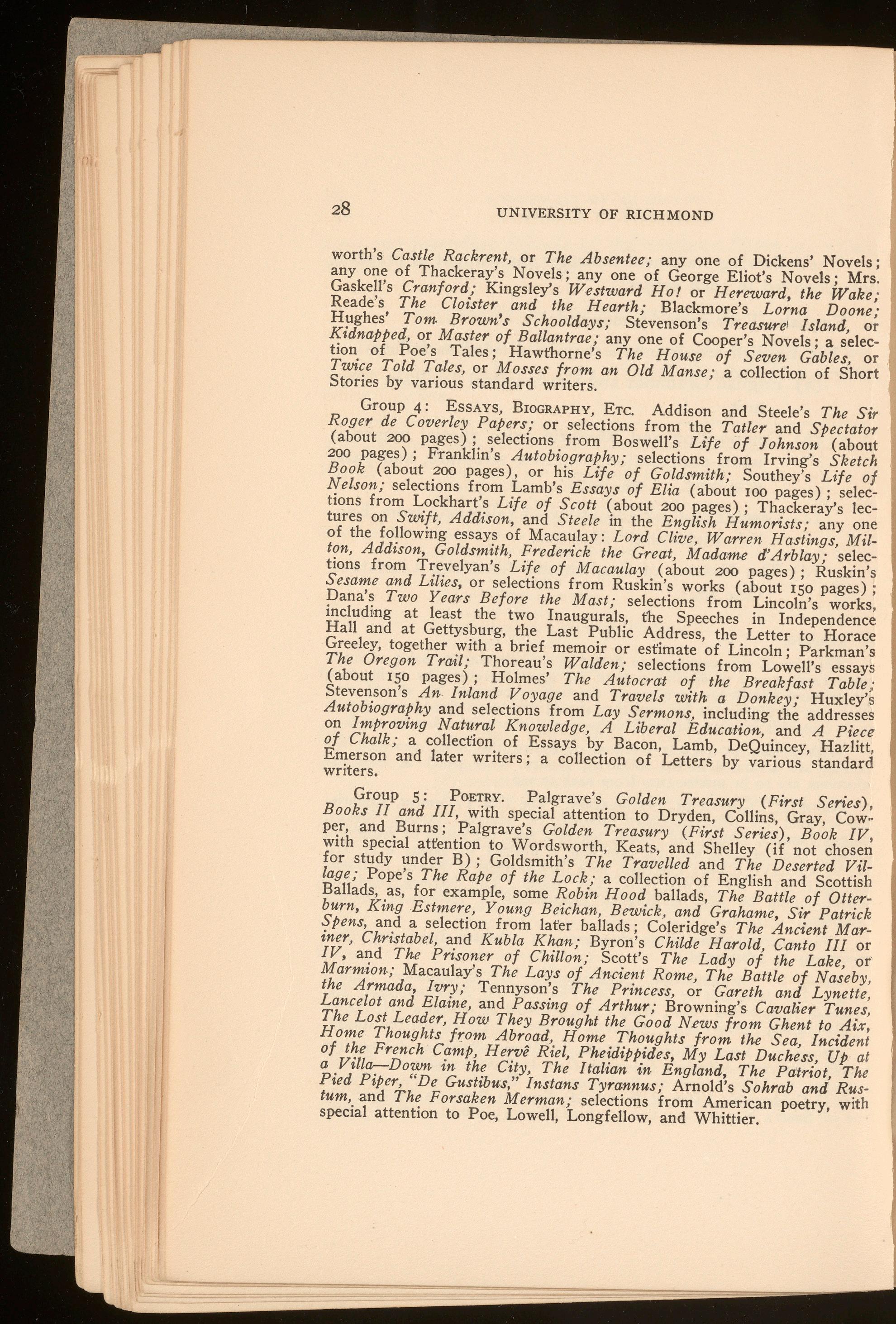

B STUDY.
This part of the requirement is intended as a natural and logical continuation of the student's earlier reading, with greater stress laid upon form and style, the exact meaning of words and phrases, and the understanding of allusions. The books provided for study are arranged in four groups, from each of which one selection is to be made.
Group I: DRAMA. Shakespeare's Julius Caesar, Macbeth, Hamlet.
Group 2 : POETRY. Milton's L'Allegro, II Penseroso, and eit'her Camus or Lycidas; Tennyson's The Coming of Arthur, The Holy Grail, and The Passing of Arthur; the selections from Wordsworth, Keats, and Shelley, in Book IV of Palgrave ' s Golden Treasury (First Seri es).
Group 3: ORATORY.Burke's Speech on Conciliation with America ; Macaulay's Speech on Copyright and Lincoln's Speech at Cooper Union; Washington's Farewell Address and Webster's First Bunker Hill Oration.
Group 4: EssAYS. Carlyle ' s Essay on Burns, with a selection from Bum's Poems; Macaulay's Life of Johnson; Emerson's Essay on Manners.
2. Mathematics-The first two and a half of the following units are required, the others optional:
(a) Algebra to Quadratics, one unit.
(b) Advanced Algebra, one-half unit.
(c) Plane Geometry, one unit.
(d) Solid Geometry, one-half unit.
(e) Trigonometry, one-half unit.
3. History-One unit required, the other optional.
(a) Ancient History, one unit.
(b) Mediaeval and Modern History, one unit.
(c) English History, one unit.
(d) American History, one unit.
4· Latin-Four units.
(a) Grammar and Composition, one unit.
(b) Caesar, four books, one unit.
( c) Cicero, six orations, one unit.
( d) Virgil's Aeneid, six books, or the equivalent of Ovid, or of Virgil and Ovid, one unit.
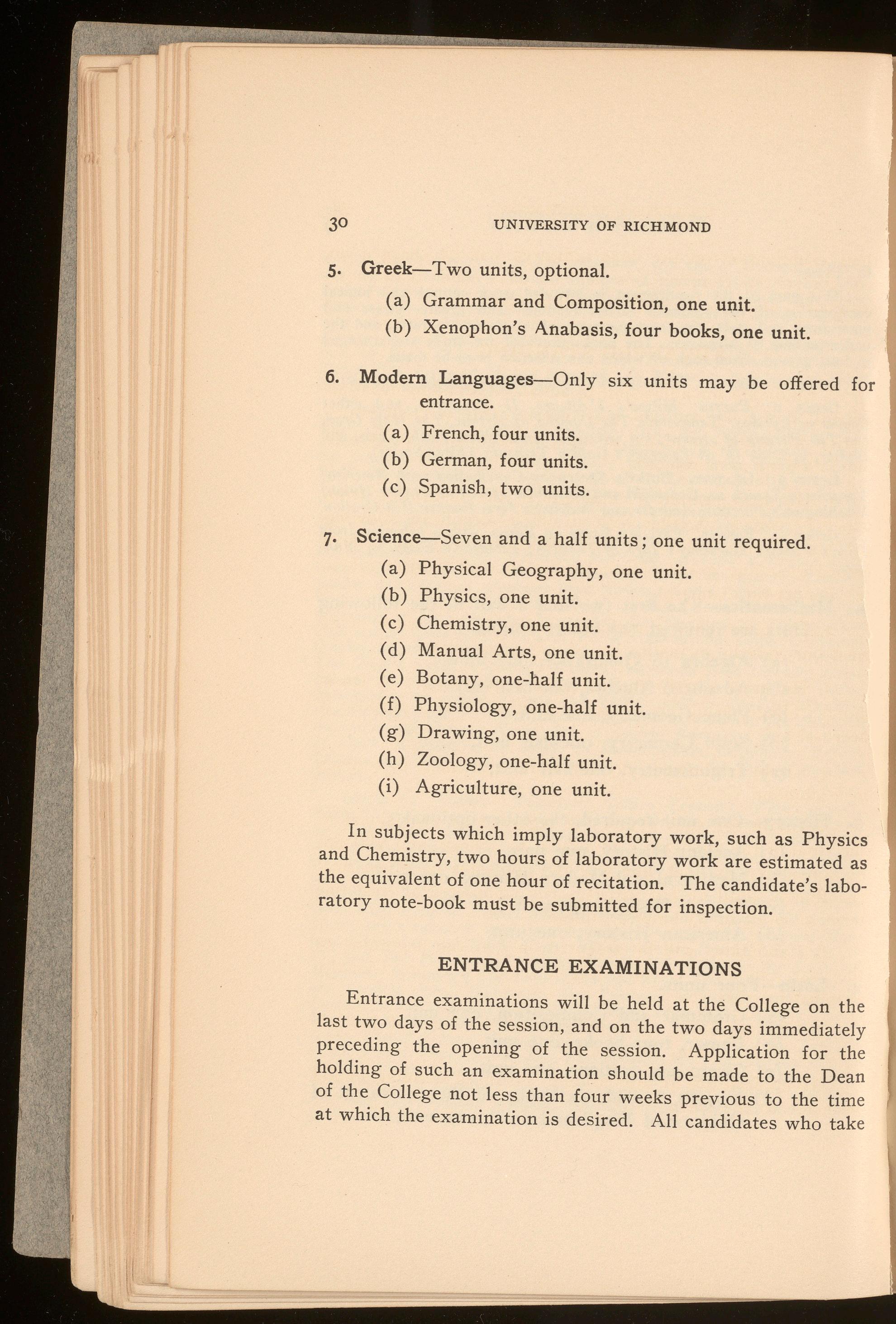
5. Greek-Two units, optional.
(a) Grammar and Composition, one unit.
(b) Xenophon's A.nabasis, four books, one unit.
6. Modem Languages-Only six units may be offered for entrance.
(a) French, four units.
(b) German, four units.
( c) Spanish, two units.
7. Science-Seven and a half units; one unit required.
(a) Physical Geography, one unit.
(b) Physics, one unit.
(
c) Chemistry, one unit.
(d) Manual Arts, one unit.
(e) Botany, one-half unit.
(f) Physiology, one-half unit.
(g) Drawing, one unit.
(h) Zoology, one-half unit.
(i) Agriculture, one unit.
In subjects which imply laboratory work, such as Physics and Chemistry, two hours of laboratory work are estimated as the equivalent of one hour of recitation. The candidate's laboratory note-book must be submitted for inspection.
Entrance examinations will be held at the College on the last two days of the session, and on the two days immediatel y preceding the opening of the session. Application for th e holding of such an examination should be made to the Dean of the College not less than four weeks previous to the tim e at which the examination is desired. All candidates who tak e
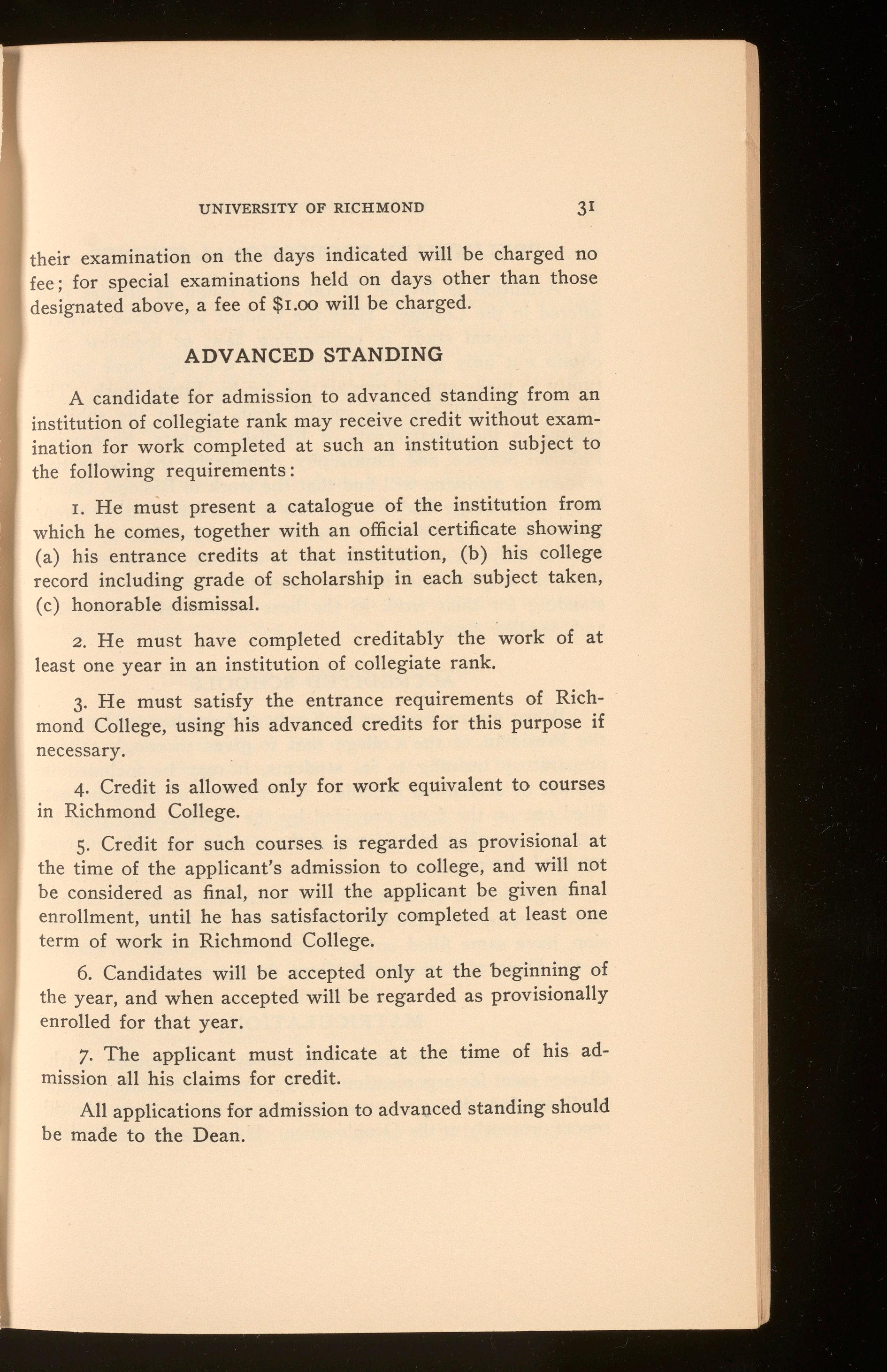
their examination on the days indicated will be charged no fee; for special examinations held on days other than those designated above, a fee of $1.00 will be charged.
A candidate for admission to advanced standing from an institution of collegiate rank may receive credit without examination for work completed at such an institution subject to the following requirements:
I. He must present a catalogue of the institution from which he comes, together with an official certificate showing (a) his entrance credits at that institution, (b) his college record including grade of scholarship in each subject taken, ( c) honorable dismissal.
2. He must have completed creditably the work of at least one year in an institution of collegiate rank.
3. He must satisfy the entrance requirements of Richmond College, using his advanced credits for this purpose if necessary.
4. Credit is allowed only for work equivalent to courses in Richmond College.
5 Credit for such courses . is regarded as provisional at the time of the applicant's admission to college, and will not be considered as final, nor will the applicant be given final enrollment, until he has satisfactorily completed at least one term of work in Richmond College.
6. Candidates will be accepted only at the beginning of the year, and when accepted will be regarded as provisionally enrolled for that year.
7. The applicant must indicate at the time of his admission all his claims for credit.
All applications for admission to advanced standing should be made to the Dean.
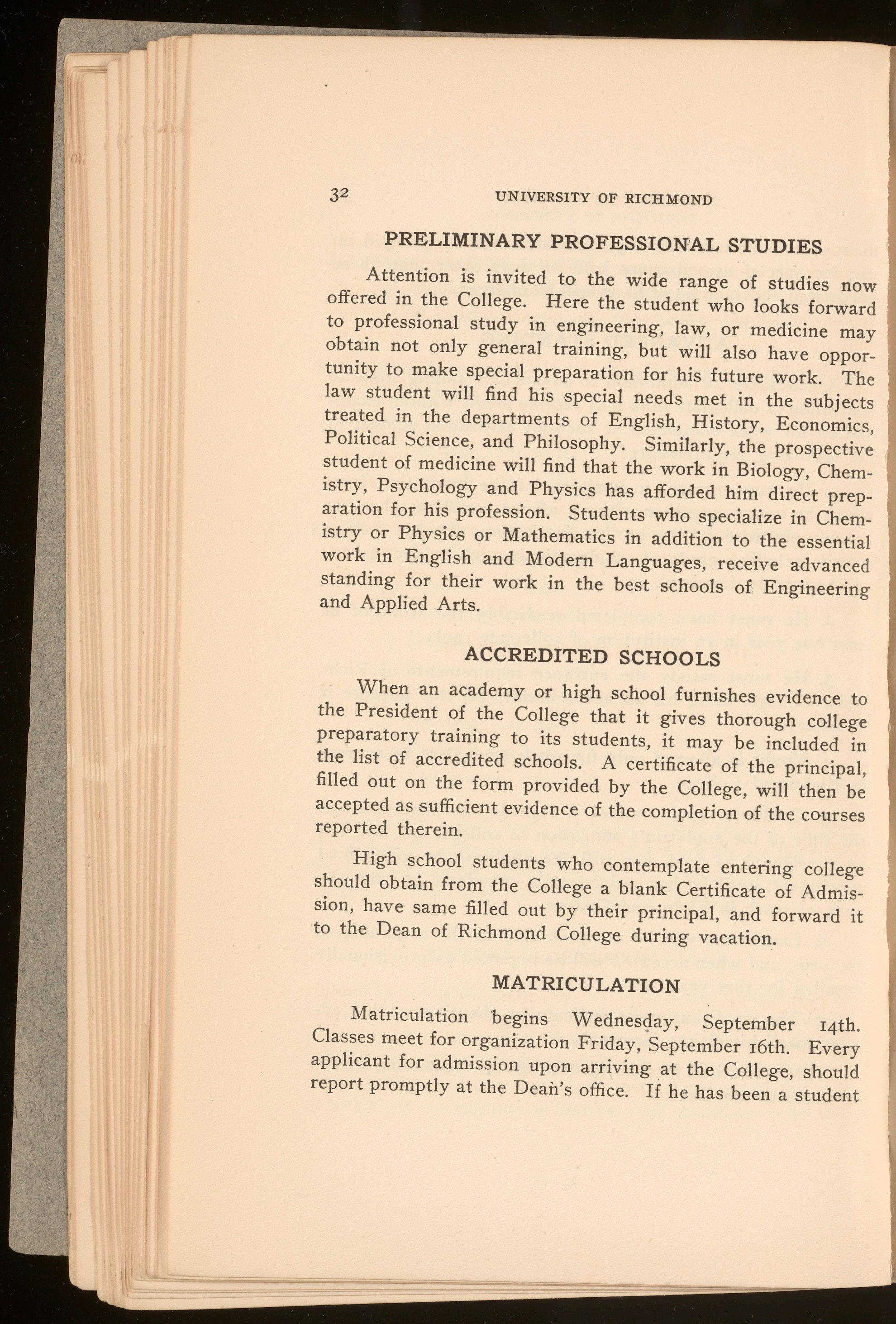
Attention is invited to the wide range of studies now offered in the College. Here the student who looks forward to professional study in engineering, law, or medicine may obtain not only general training, but will also have oppor- tunity to make special preparation for his future work. The law student will find his special needs met in the subjects treated in the departments of English, History, Economics , Political Science, and Philosophy. Similarly, the prospective student of medicine will find that the work in Biology, Chem- istry, Psychology and Physics has afforded him direct prep- aration for his profession. Students who specialize in Chem- istry or Physics or Mathematics in addition to the essential work in English and Modern Languages, receive advanced standing for their work in the best schools of Engineering and Applied Arts.
When an academy or high school furnishes evidence to the President of the College that it gives thorough college preparatory training to its students, it may be included in the list of accredited schools. A certificate of the principal , filled out on the form provided by the College, will then be accepted as sufficient evidence of the completion of the courses reported therein.
High school students who contemplate entering college should obtain from the College a blank Certificate of Admis- sion, have same filled out by their principal, and forward it to the Dean of Richmond College during vacation.
Matriculation begins Wednes1ay, September 14th. Classes meet for organization Friday, September 16th. Every applicant for admission upon arriving at the College, should report promptly at the Dean's office. If he has been a student

at any other college, he should present a detailed certificate of work accomplished there, as well as a statement in regard to his character. If he comes from an academy or high school, he should bring with him, in case he has not already sent it, an admission certificate duly filled out and signed by the principal of the school he last attended. Admission certificates 5hould be in the hands of the Dean, for reference to the proper committee, during the summer.
When the question of preparation for college has been settled affirmatively, the student in consultation with the Committee on Courses and Degrees decides upon a course of study and fills out the matriculation card. After this has been approved by the Dean it should be presented to the Treasurer and Registrar of the College, who, upon the payment of the required fees, will deliver to the student his registration card and record his name as a regular matriculate.
Students who fail to complete their matriculation by 12 :oo o'clock, noon, of the third day of the session, September the 18th, will be charged an extra fee of $2.00 for delayed matriculation.
Any student who is absent from classes on the first day of the second or third terms shall be fined $2.-00 and this fine must be paid before the student may resume the work of the course. The reasons for such absence may be submitted in writing to the Dean. If they are deemed satisfactory by the Faculty the fine will be returned.
College Fee.-Including matriculation, use of public rooms, attendance, and all college privileges, $35.00 This fee must be paid at entrance, is not subject to deduction, nor in any case refunded. Students entering after the fall term pay $25.00. Those who enter for the spring term pay only $15.00.
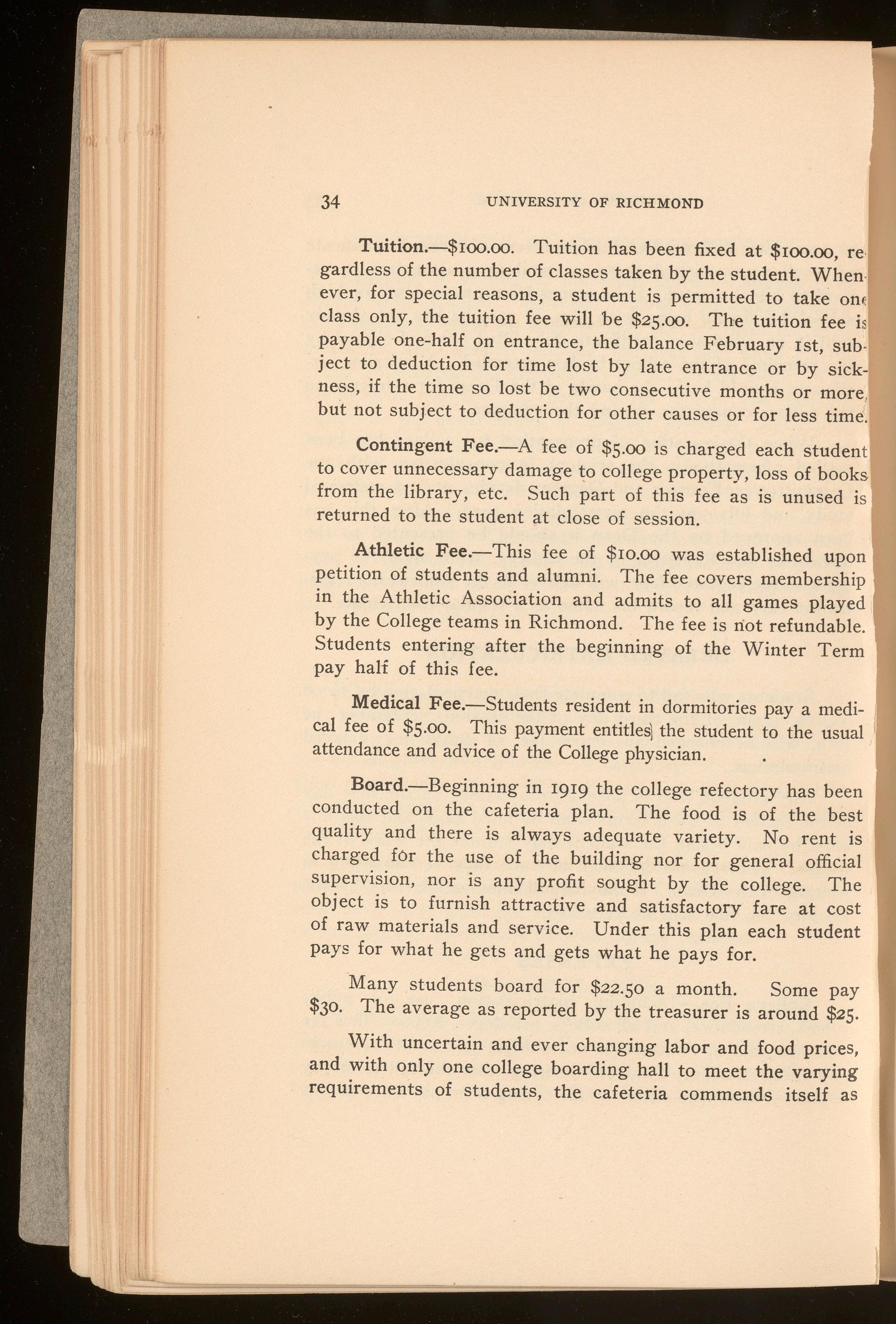
Tuition.-$rno.oo. Tuition has been fixed at $100.00, regardless of the number of classes taken by the student. Whenever, for special reasons, a student is permitted to take on f. class only, the tuition fee will be $25.00. The tuition fee is payable one-half on entrance, the balance February 1st, subject to deduction for time lost by late entrance or by sickness, if the time so lost be two consecutive months or more , but not subject to deduction for other causes or for less time .
Contingent Fee.-A fee of $5.00 is charged each studen t to cover unnecessary damage to college property, loss of book s from the library, etc. Such part of this fee as is unused 1s returned to the student at close of session.
Athletic Fee.-This fee of $rn.oo was established upon petition of students and alumni. The fee covers membershi p in the Athletic Association and admits to all games played by the College teams in Richmond. The fee is riot refundable . Students entering after the beginning of the Winter Term pay hali of this fee.
Medical Fee.-Students resident in dormitories pay a medical fee of $5.00. This payment entitles \ the student to the usual attendance and advice of the College physician.
Board.-Beginning in 1919 the college refectory has been conducted on the cafeteria plan. The food is of the best quality and there is always adequate variety. No rent is charged for the use of the building nor for general official supervision, nor is any profit sought by the college. The object is to furnish attractive and satisfactory fare at cost of raw materials and service. Under this plan each student pa y s for what he gets and gets what he pays for.
Many students board for $22.50 a month. Some pa y $30. The average as reported by the treasurer is around $25.
With uncertain and ever changing labor and food price s, and with only one college boarding hall to meet the varyin g requirements of students, the cafeteria commends itself a s
the best solution of a difficult problem. The cost of board for 1921-'22 will probably be less than last session.
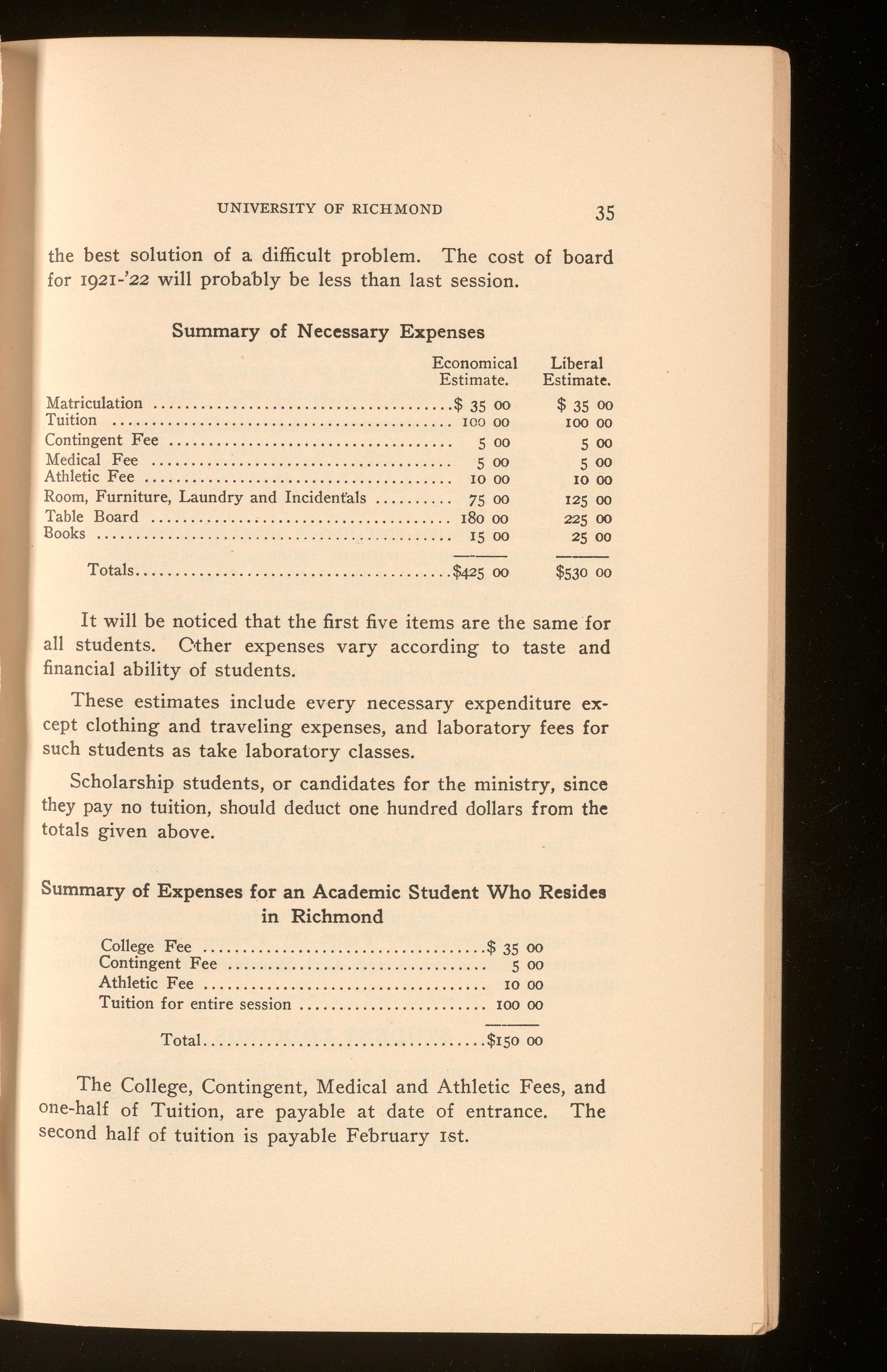
It will be noticed that the first five items are the same for all students. Other expenses vary according to taste and financial ability of students.
These estimates include every necessary expenditure except clothing and traveling expenses, and laboratory fees for such students as take laboratory classes.
Scholarship students, or candidates for the ministry, since they pay no tuition, should deduct one hundred dollars from the total s given above.
The College, Contingent, Medical and Athletic Fees, and one-half of Tuition, are payable at date of entrance. The second half of tuition is payable February 1st.

Diploma Fee.-For every Bachelor's Diploma awarded, the charge is $5.00. For a Master's Diploma and Hood the charge is $ro.oo.
Students who take degrees are required to pay for the Degree Diplomas. No honors are announced at Commencement unless all fees have been satisfactorily settled.
Laboratory Fees.-Students who take Chemistry, are required to pay a fee of $ro.oo for laboratory expenses; those who take Biology or Physics are required to pay a fee of $7.50. These fees are not refundable.
Students need not keep money about their persons or in their rooms, but may, without expense, deposit it for safekeeping with an officer of the College. Some students open an account with one of the city banks, and this plan is strongly commended by the College authorities.
Ministers of the Gospel of all denominations, and young men duly approved by their churches as candidates for the ministry, are admitted free of charge for tuition. They pay matriculation fee, and for fuel, light, board, etc., the same with other students.
The Education Board of the Virginia Baptist General Association will render further assistance to worthy young men recommended by churches which contribute to the Board, and accepted after examination. For further information on this matter address Mr. Frank T. Crump, Corresponding Secretary, Education Board, Old Dominion Trust Building, Richmond, Va.
Jeter Hall consists of a group of five non-communicating buildings under one roof. The five sections are designated by the letters A, B, C, D and E. Thomas Hall has four sections. The construction is of brick and stone with steel frame en-
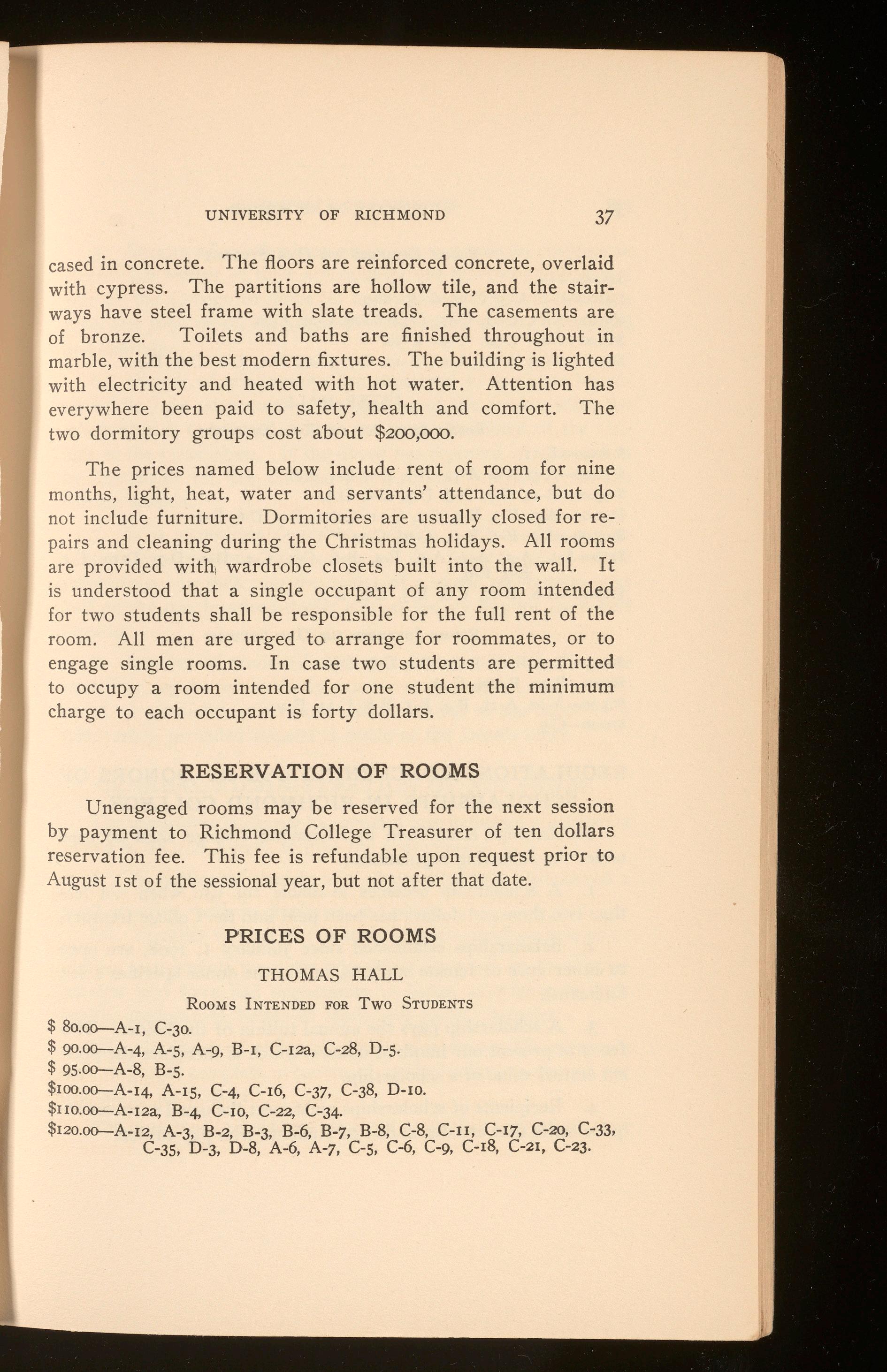
cased in concrete. The floors are reinforced concrete, overlaid with cy press. The partiti o ns are hollow tile, and the stairways ha v e steel frame with slate treads. The casements are of b r o nze. Toilets and baths are finished throughout in marb le , with the best modern fixtures. The building is lighted with electricity and heated with hot water. Attention has everyw h e re been paid to safety, health and comfort. The two d o rmitory groups cost about $200,000.
T he prices named below include rent of room for nine mont h s, light, heat, water and servants' attendance, but do not includ e furniture. Dormitories are usually closed for repairs a nd cleaning during the Christmas holidays. All rooms are p ro vi ded with, wardrobe cl osets built into the wall. It is u n d er s tood that a single occupant of any room intended for t wo students shall be responsible for the full rent of the roo m. All men are urged to arrange for roommates, or to enga ge single rooms. In case two students are permitted to occupy a room intended for one student the minimum charg e to each occupant is forty dollars.
Unengaged rooms may be reserved for the next session by payment to Richmond College Treasurer of ten dollars reserv ation fee. This fee is refundable upon request prior to Aug u st I st of the sessional year, but not after that date.
ROOMS INTENDED FOR Two STUDENTS
$ 8o.oo-A-1 , C-30.
$ 90.00-A-4 , A-s , A-9, B-1, C-1za, C-28, D-5.
$ 95.00-A-8, B-5
$rno.oo-A-14, A-15, C-4, C-16, C-37, C-38, D-rn.
$110.oo-A-12a, B-4, C-10, C-22, C-34.
$120.00-A-12 , A-3, B-2, B-3, B-6, B-7, B-8, C-8, C-11, C-17, C-20, C-33, C-35, D-3, D-8, A-6, A-7, C-5, C-6, C-9, C-18, C-21, C-23.
UNIVERSITY OF RICHMOND
ROOMS INTENDED FOR ONE STUDENT
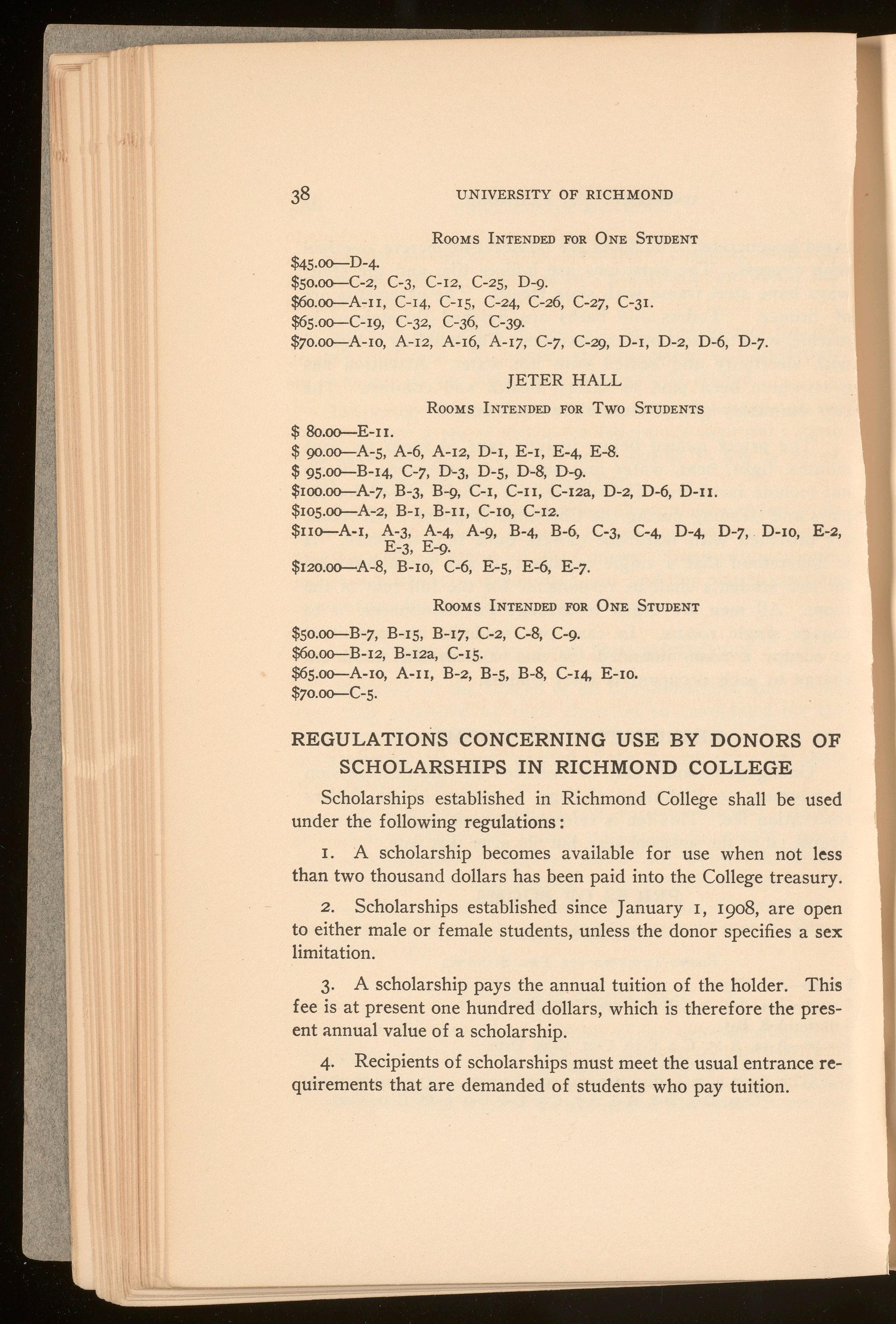
$45 oo---D-4-
$50.00-C-2 , C-3, C-12, C-25, D-9.
$6o.oo-A-n, C-14, C-15, C-24, C-26, C-27, C-31.
$65.00-C-19, C-32, C-36, C-39.
$70.00-A-ro, A-12, A-16, A-17, C-7, C-29, D-r, D-2, D-6, D-7.
ROOMS INTE N DED FOR Two STUDENTS
$ 8o.oo---E-n.
$ 90.00-A-5, A-6, A-12, D-r, E-r, E-4, E-8.
$ 95.00-B - 14, C-7, D-3, D-5, D-8, D-9.
$100.00-A-7 , B-3, B-9, C-1, C-n, C-12a, D-2, D-6, D-n.
$105.00---A-2, B-1, B-11, C-ro, C-12.
$110-A-1, A -3, A-4, A-9, B-4, B-6, C-3, C-4, D-4, D-7, D-ro, E-2, E-3, E-9.
$120.00-A-8, B-ro, C-6, E-5, E-6, E-7
ROOMS INTENDED FOR ONE STUDENT
$50 00---B-7, B-15, B-17, C-2, C-8, C-9.
$6o.oo-B-12, B-12a, C-15.
$65.00-A-10, A-II, B-2, B-5, B-8, C-14, E-10.
$70.00-C-5 .
Scholarships established in Richmond College shall be used under the following regulations:
I. A scholarship becomes available for use when not less than two thousand dollars has been paid into the College treasury.
2. Scholarships established since January I, 1908, are open to either male or female students, unless the donor specifies a sex limitation.
3 A scholarship pays the annual tuition of the holder. This fee is at present one hundred dollars, which is therefore the present annual value of a scholarship.
4. Recipients of scholarships must meet the usual entrance requirements that are demanded of students who pay tuition.
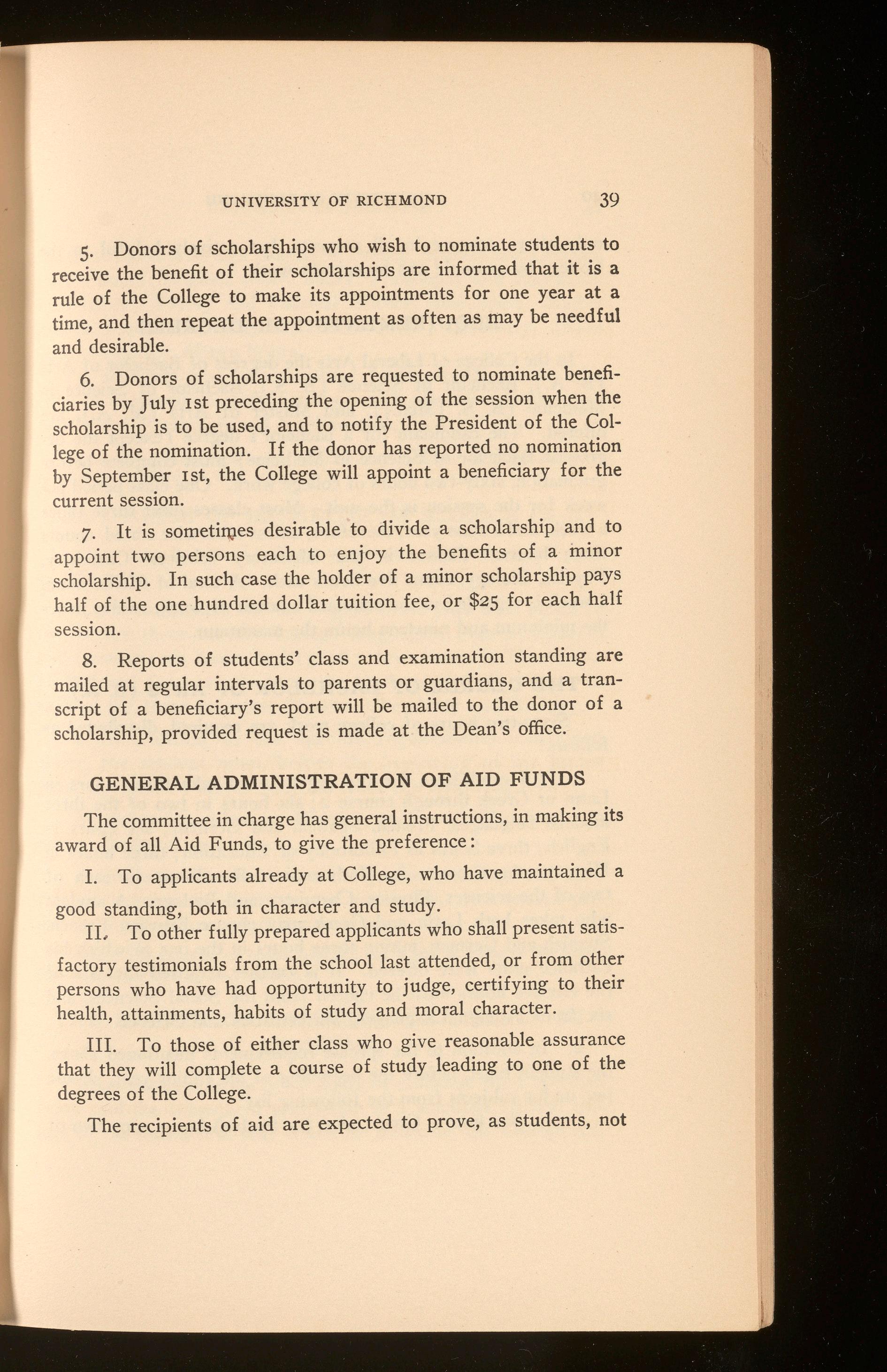
5. Donors of scholarships who wish to nominate students to receive the benefit of their scholarships are informed that it is a rule of the College to make its appointments for one year at a time, and then repeat the appointment as often as may be needful and desirable.
6. Donors of scholarships are requested to nominate beneficiarie s by July Ist preceding the opening of the session when the scholarship is to be used, and to notify the President of the College of the nomination. If the donor has reported no nomination by September Ist, the College will appoint a beneficiary for the cur rent session.
7 . It is sometiq;ies desirable to divide a scholarship and to appoi nt two persons each to enjoy the benefits of a ininor schola rship. In such case the holder of a minor scholarship pays half of the one hundred dollar tuition fee, or $25 for each half sess io n.
8 . Reports of students' class and examination standing are mailed at regular intervals to parents or guardians, and a transcript of a beneficiary's report will be mailed to the donor of a scholarship, provided request is made at the Dean's office.
The committee in charge has general instructions , in making its awa rd of all Aid Funds, to give the preference:
I. To applicants already at College, who have maintained a good standing, both in character and study.
II , To other fully prepared applicants who shall present satisfact ory testimonials from the school la st attended, or from other pers ons who have had opportunity to judge, certifying to their hea lth , a ttainments, habits of study and moral character .
III. To those of either class who gi ve reasonable assurance t hat they will complete a course of study leading to one of the degrees of the College.
The recipients of aid are expected to prove, as students, not
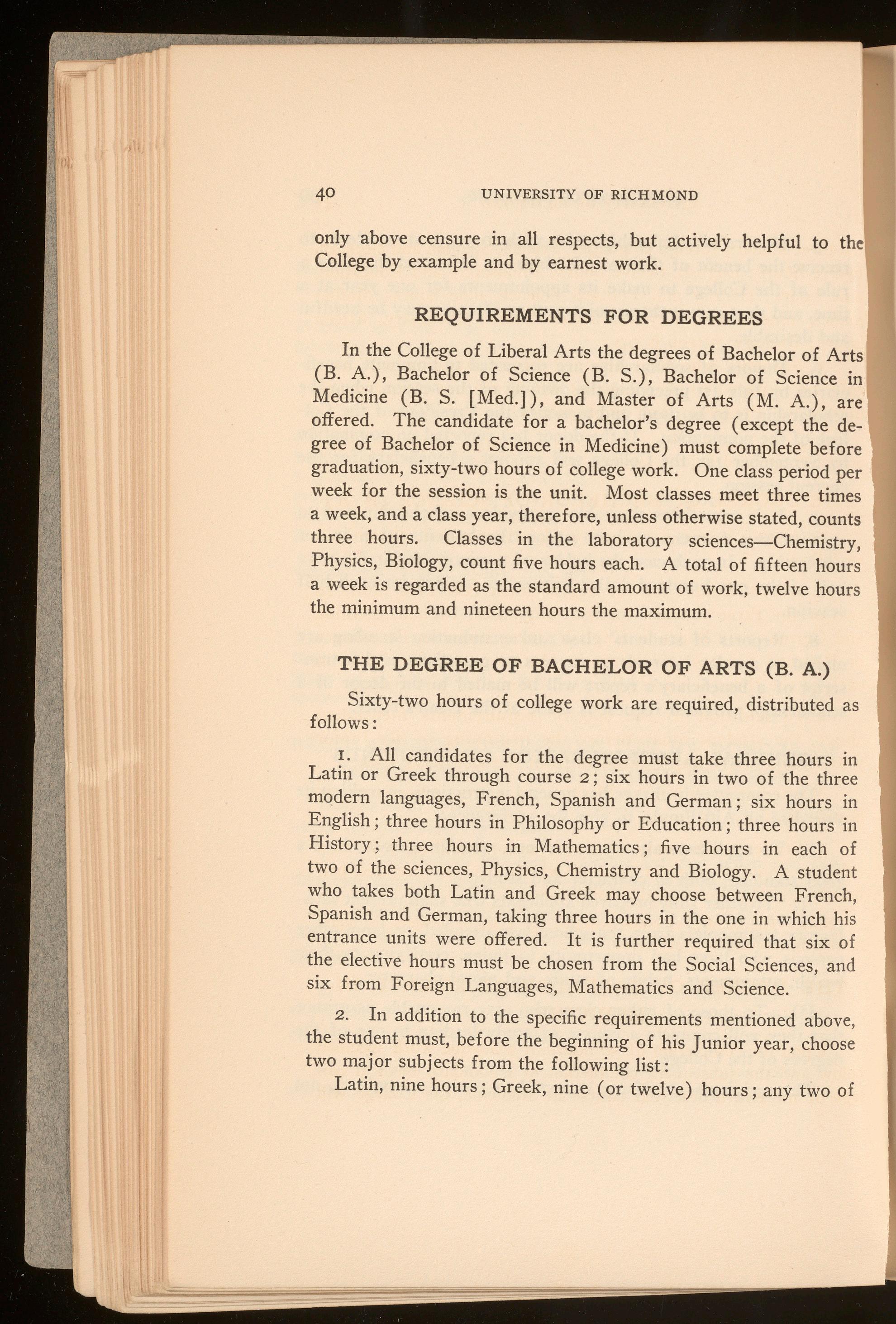
only above censure in all respects, but actively helpful to the College by example and by earnest work.
In the College of Liberal Arts the degrees of Bachelor of Arts ( B. A.), Bachelor of Science ( B. S.), Bachelor of Science in Medicine (B. S. [Med.]), and Master of Arts (M. A.), are offered. The candidate for a bachelor's degree ( except the degree of Bachelor of Science in Medicine) must complete before graduation, sixty-two hours of college work. One class period per week for the session is the unit. Most classes meet three times a week, and a class year, therefore, unless otherwise stated, counts three hours. Classes in the laboratory sciences-Chemistry, Physics, Biology, count five hours each. A total of fifteen hours a week is regarded as the standard amount of work, twelve hours the minimum and nineteen hours the maximum.
Sixty-two hours of college work are required, distributed as follows:
I. All candidates for the degree must take three hours in Latin or Greek through course 2; six hours in two of the three modern languages, French, Spanish and German ; six hours in English; three hours in Philosophy or Education; three hours in History; three hours in Mathematics; five hours in each of two of the sciences, Physics, Chemistry and Biology. A student who takes both Latin and Greek may choose between French, Spanish and German, taking three hours in the one in which his entrance units were offered. It is further required that six of the elective hours must be chosen from the Social Sciences, and six from Foreign Languages, Mathematics and Science.
2. In addition to the specific requirements mentioned above, the student must, before the beginning of his Junior year, choose two major subjects from the following list: Latin, nine hours; Greek, nine ( or twelve) hours ; any two of

the t hree modern foreign languages, French, Spanish and German, twelve hours ; English, twelve hours; Philosophy and Education, nine hours ; History and Political Science, nine hours ; Mathematics, nine hours; Physics, fifteen hours; Chemistry, fifteen hours ; Biology, fifteen hours.
3. Students who have attained Junior standing will, as a rule, be required to elect courses which are not intended primarily for Freshmen and Sophomores.
NoTE.-The number of hours required for a Major includes the hours previously specified in that subject.
S ix ty-two hours of college work are required, distributed as follows:
r. All candidates for the degree must take nine hours in two of the three modern foreign languages, French, Spanish and German; six hour.s in English; three hours in Economics or Po litical Science; six hours in Mathematics; five hours in each o f the three sciences, Physics, Chemistry and Biology.
2 In addition to the specific requirements mentioned above, the student must, before the beginning of his Junior year, choose two Major subjects from the following lists:
M athematics , 9 hours; Physics, 15 hours; Chemi stry, 15 hours ; Biology, 15 hours.
3. Students who have attained Junior standing will, as a rule, be required to elect courses which are not intended primari ly for Freshmen and Sophomores.
NoTE.-The number of hours required for a Major includes the hours previously specified in that subject.
Upon the completion of 50 hours of academic work specified below and the subsequent completion in a standard medical college of the entire first-year course in Medicine, the College will
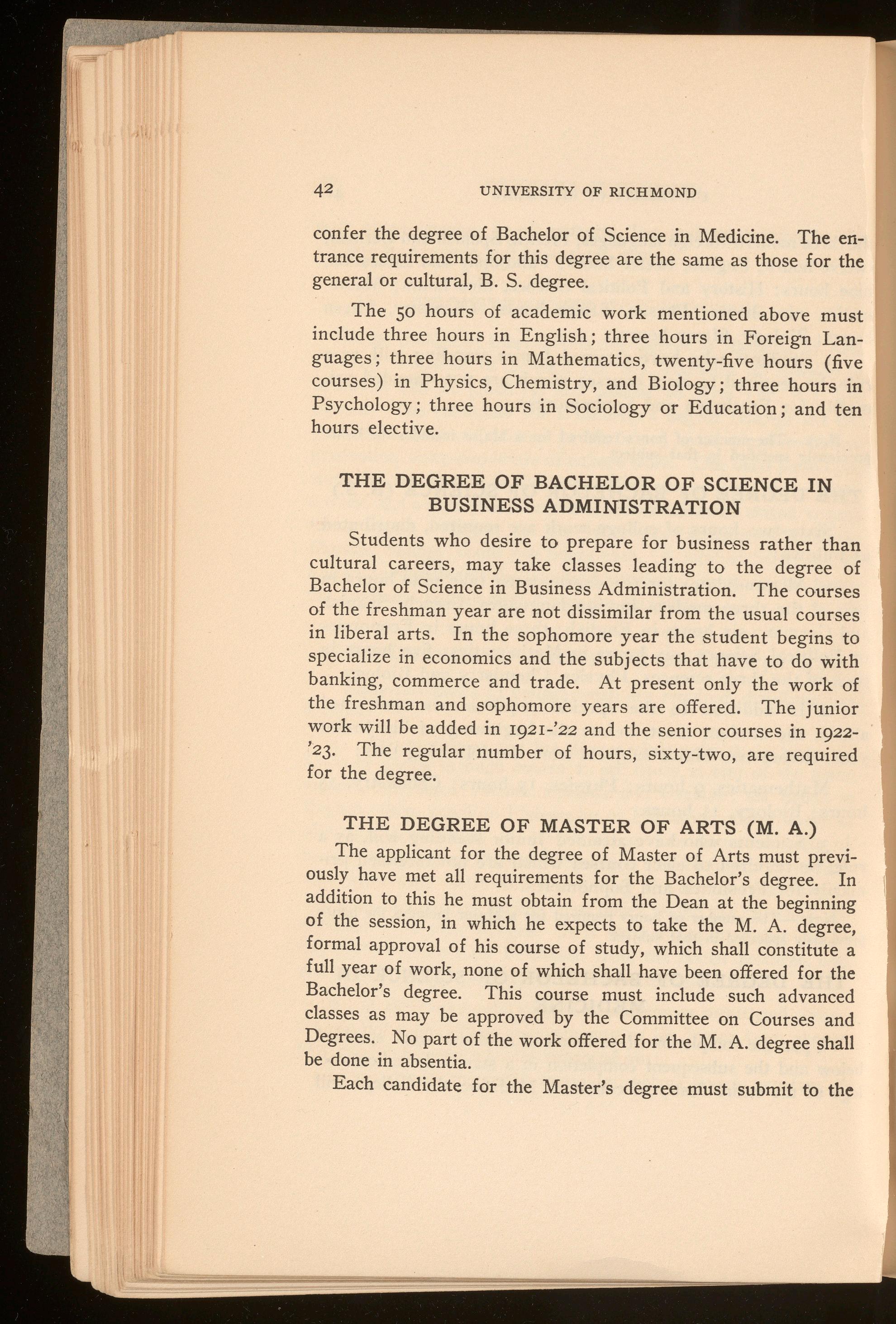
confer the degree of Bachelor of Science in Medicine. The entrance requirements for this degree are the same as those for the general or cultural, B. S. degree.
The 50 hours of academic work mentioned above must include three hours in English; three hours in Foreign Languages; three hours in Mathematics, twenty-five hours (five courses) in Physics, Chemistry, and Biology; three hours in Psychology; three hours in Sociology or Education; and ten hours elective.
Students who desire to prepare for business rather than cultural careers, may take classes leading to the degree of Bachelor of Science in Business Administration. The courses of the freshman year are not dissimilar from the usual courses in liberal arts. In the sophomore year the student begins to specialize in economics and the subjects that have to do with banking, commerce and trade. At present only the work of the freshman and sophomore years are offered. The junior work will be added in 1921-'22 and the senior courses in 1922'23. The regular number of hours, sixty-two, are required for the degree.
The applicant for the degree of Master of Arts must previously have met all requirements for the Bachelor's degree. In addition to this he must obtain from the Dean at the beginning of the session, in which he expects to take the M. A. degree, formal approval of his course of study, which shall constitute a full year of work, none of which shall have been offered for the Bachelor's degree. This course must include such advanced classes as may be approved by the Committee on Courses and Degrees. No part of the work offered for the M. A. degree shall be done in absentia.
Each candidate for the Master's degree must submit to the
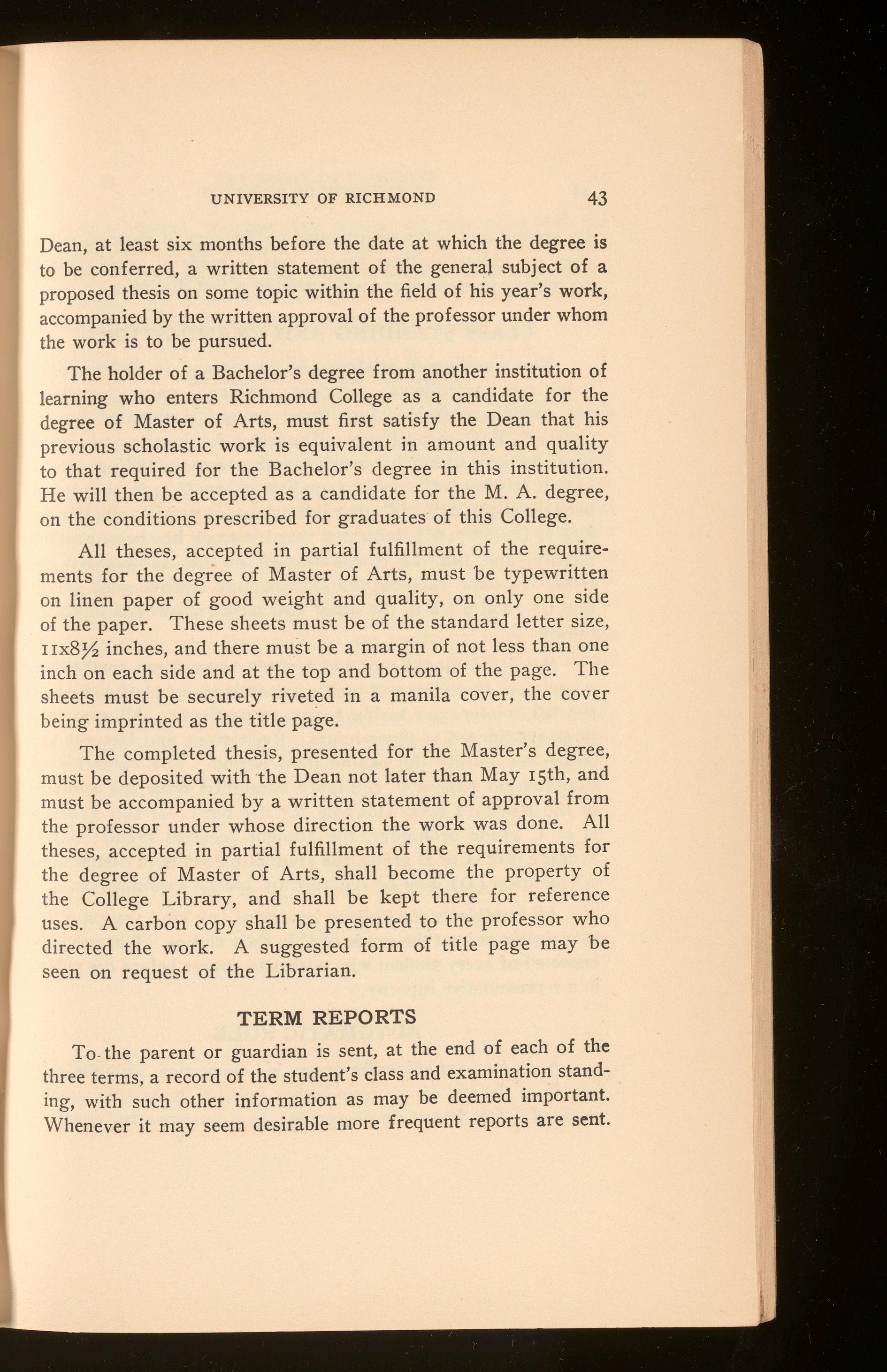
Dean, at least six months before the date at which the degree is to be conferred, a written statement of the general subject of a pro posed thesis on some topic within the field of his year's work, accompanied by the written approval of the professor under whom the work is to be pursued.
The holder of a Bachelor's degree from another institution of learning who enters Richmond College as a candidate for the degree of Master of Arts, must first satisfy the Dean that his prev ious scholastic work is equivalent in amount and quality to t hat required for the Bachelor's degree in this institution. He will then be accepted as a candidate for the M A. degree, on the conditions prescribed for graduates of this College.
All theses, accepted in partial fulfillm ent of the requireme nts for the degree of Master of Arts, mu s t be typewritten on linen paper of good weight and quality, on only one side of t he paper. These sheet s must be of the standard lett er size , nx8 ¼ inches, and there must be a margin of not less than one inc h on each side and at the top and bottom of the page. The sh eets must be securely riveted in a manila cover, the cover bei ng imprinted as the title page.
The completed thesis, presented for the Master's degree, m u st be deposited with the Dean not later than May 15th, and m u s t be accompanied by a written statement of approval from the professor under whose direction the work was done. All the s es, accepted in partial fulfillment of the requirements for the degree of Master of Arts, shall become the property of th e College Library, and shall be kept there for reference use s. A carbon copy shall be presented to the professor who di r ected the work. A suggested form of title page may be se en on request of the Librarian.
To - the parent or guardian is sent, at the end of each of the th ree terms, a record of the student's class and examination standing , with such other information as may be deemed important. W henever it may seem desirable more frequent reports are sent.

By prompt and judicious attention on the part of those to who they are addressed, these reports may be made of great vahte i promoting improvement and sustaining a just discipline.
The standing of students in classes and in examination is indicated as follows: Students making a passing grade i any study are divided into three groups, designated by th letters A, B, C, respectively. The letter A opposite a student' name indicates that his work for the term including examination, has been of excellent quality (95-100%); B, that it has been good (85-94 %) ; C, that it has been of passing grade, (7584 %) ; D, (65-74%), indicates that his work has been unsatisfactory, and that he is conditioned on the subject for the term. In some subjects the student may remove such condition by good work in the other two terms. Grade E indicates failure.
Besides frequent oral and written tests, there are held in every class three general written examinations at the close of the fall, winter, and spring terms, respectively. All examinations are limited to three hours. Recitations and lectures are suspended during the examination period. The valuation of examination papers is equitably combined with the average of the student's class standing for the term. If this average is of C grade or higher, the student receives credit; if the average is of A or B grade, the student passes with distinction. A condition (D) may be removed by special examination.
All candidates for College honors of any kind are expected to maintain at least the grade of C in their classes. This grade is expected of every student who wishes to appear before the public in a representative capacity.
A student automatically severs his connection with the college if, at the end of any term he has failed to make a minimum grade of C ( the lowest passing grade), in at least two full courses.
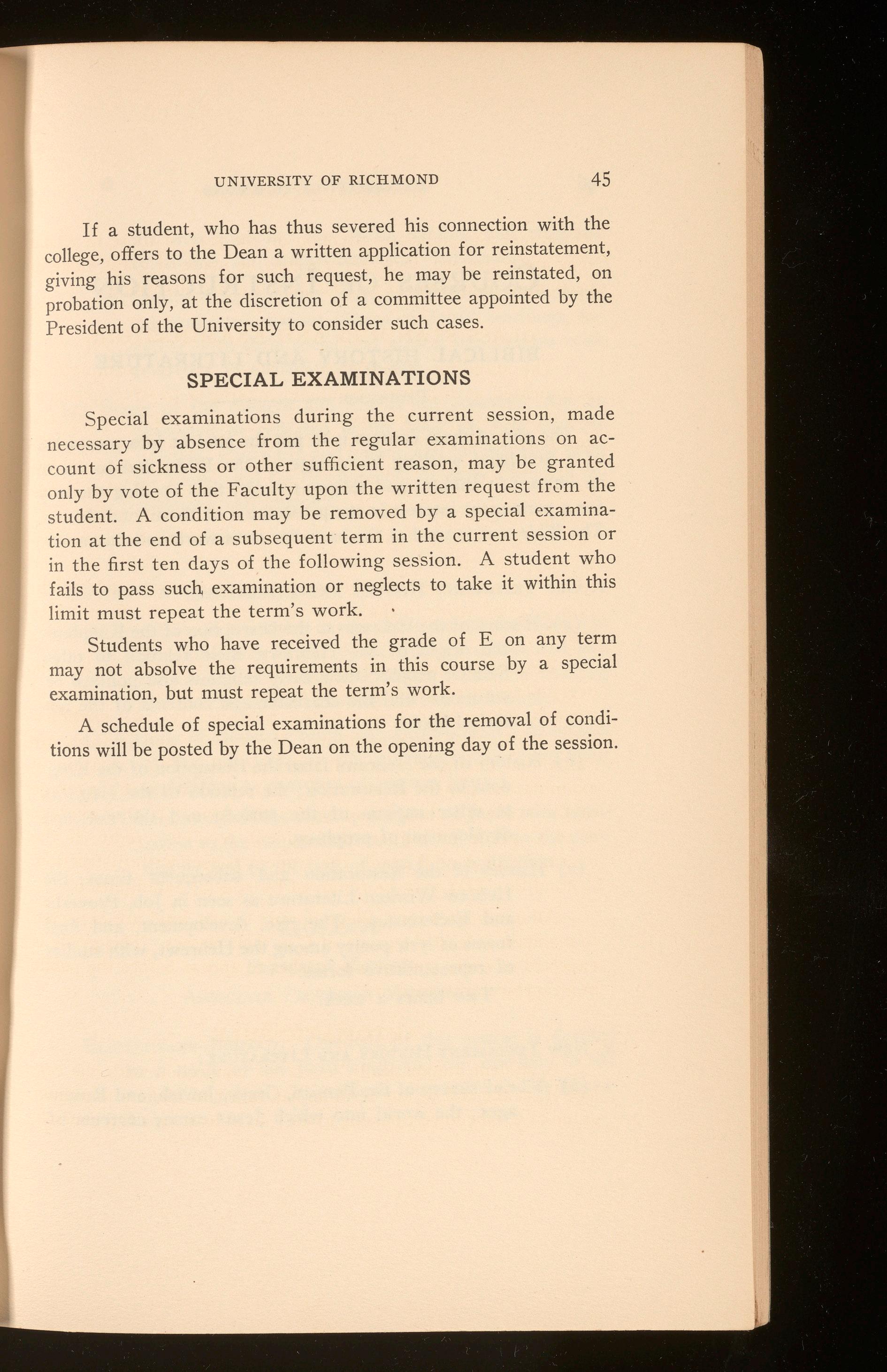
If a student, who has thus severed his connection with the college, offers to the Dean a written application for reinstatement, giving his reasons for such request, he may be reinstated, on probation only, at the discretion of a committee appointed by the Pres ident of the University to consider such cases .
Special examination s during the current session , made neces sary by absence from the regular examinations on account of si ckness or other sufficient reason, may be granted on ly by vote of the Faculty upon the written request frl"'m the st udent
A condition may be removed by a special examinatio n at the end of a subsequent term in the current session or in the fir s t ten days of the following ses s ion. A student who fails to pass such examination or neglects to take it within this lim it must repeat the term's work.
Students who have received the grade of E on any term may not absolve the requirements in this course by a special examination, but must repeat the term's work
A schedule of special examinations for the removal of conditi ons will be posted by the Dean on the opening day of the session .
UNIVERSITY OF RICHMOND
BIBLICAL HISTORY AND LITERATURE
PROFESSOR ------
The aim of these courses is to put the student into possession of a first-hand working knowledge of the Bible, and to create an interest in Biblical and religious study, thus opening the way for a permanent interest in the prosecution of these vital themes. The Bible text is used at the basis for class work and discussion.
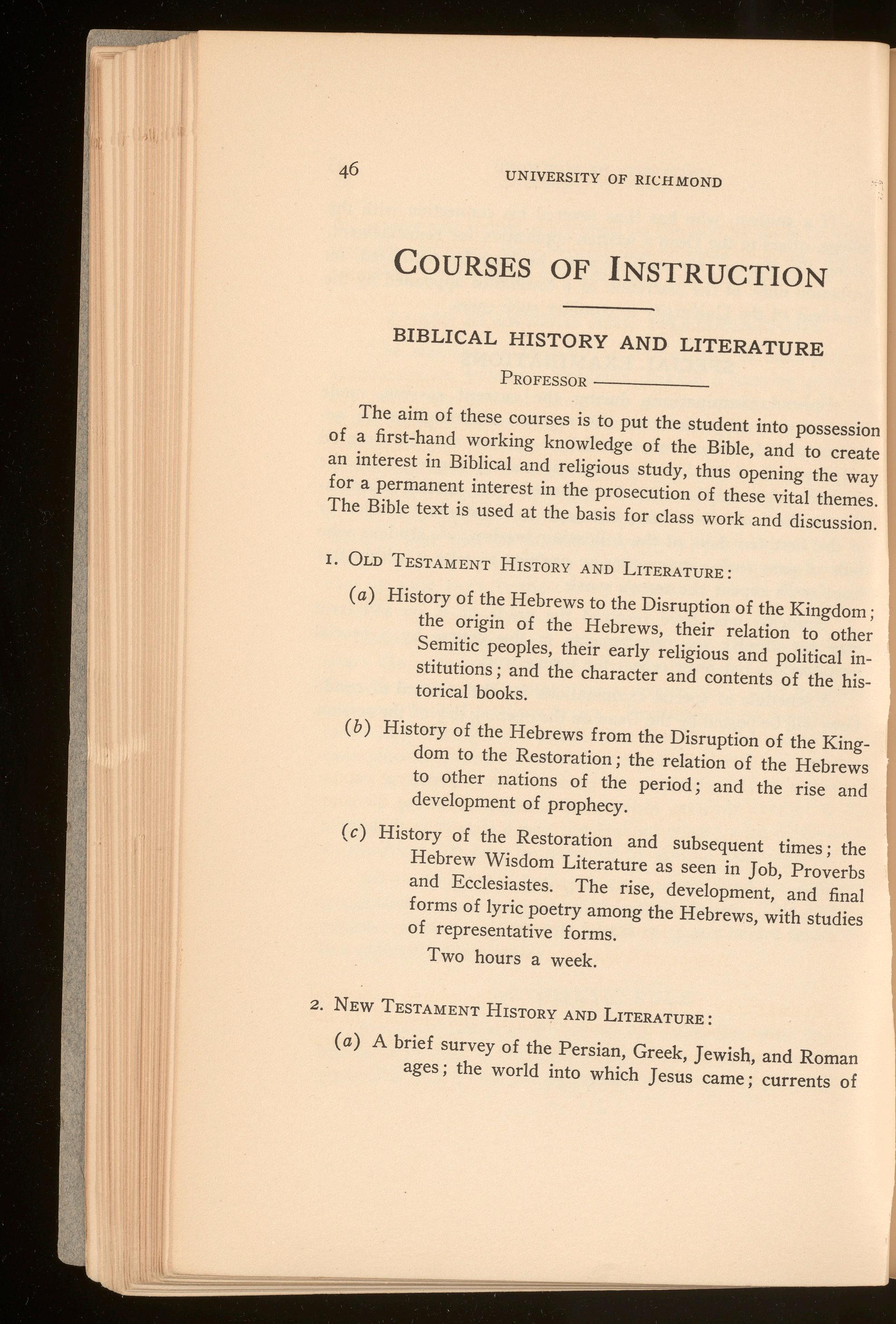
AND LITERATURE:
(a) History of the Hebrews to the Disruption of the Kingdom; the origin of the Hebrews, their relation to other Semitic peoples, their early religious and political in- stitutions; and the character and contents of the his- torical books.
(
b) History of the Hebrews from the Disruption of the King- dom to the Restoration; the relation of the Hebrews to other nations of the period; and the rise and development of prophecy.
( c) History of the Restoration and subsequent times; the Hebrew Wisdom Literature as seen in Job, Proverbs and Ecclesiastes. The rise, development, and final forms of lyric poetry among the Hebrews, with studies of representative forms. Two hours a week.
LITERATURE;
(a) A brief survey of the Persian, Greek, Jewish, and Roman ages; the world into which Jesus came; currents of
(
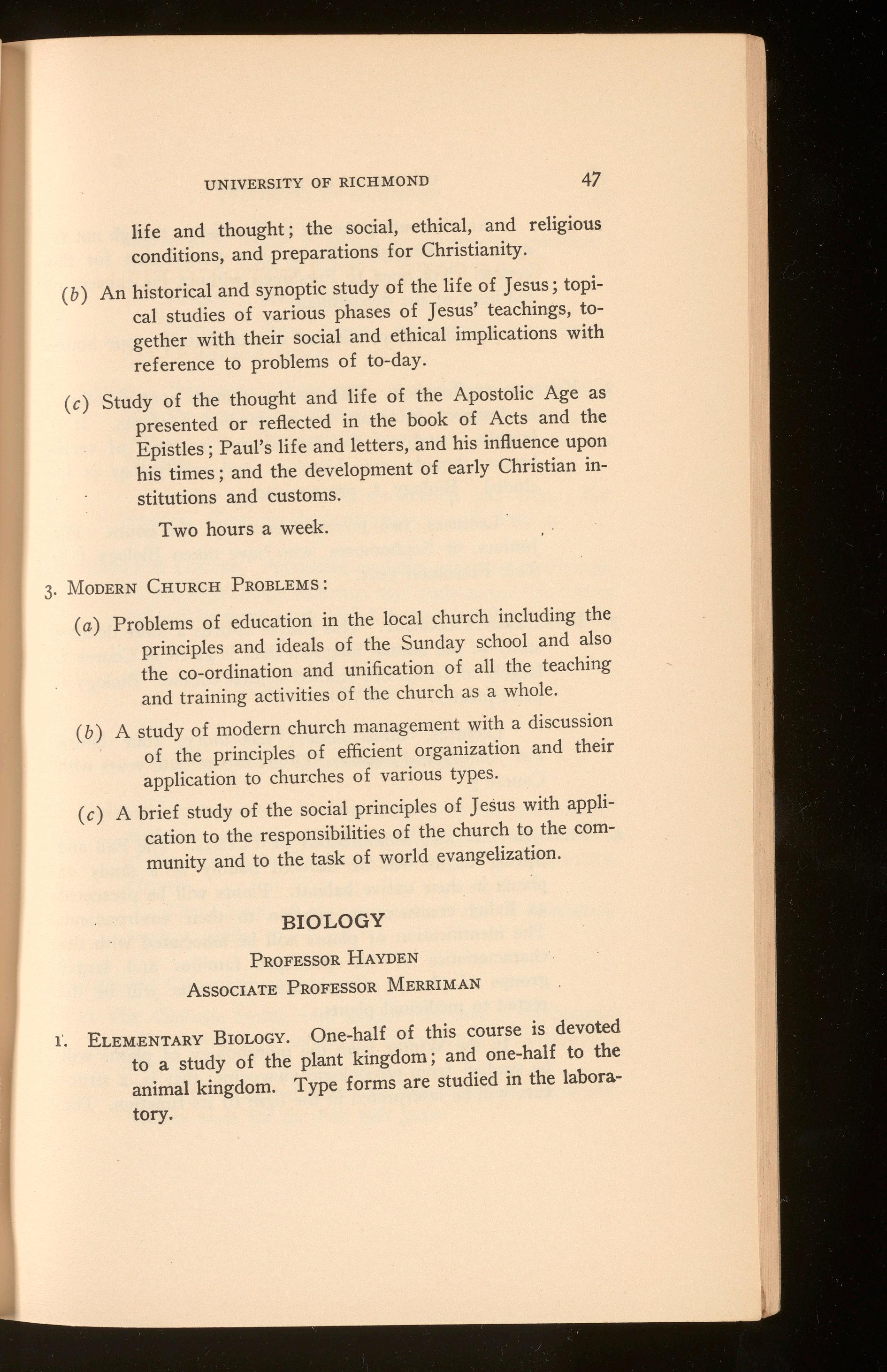
life and thought; the social, ethical, and religious conditions, and preparations for Christianity.
b) An historical and synoptic study of the life of Jesus; topical studies of various phases of Jesus' teachings, together with their social and ethical implications with reference to problems of to-day.
(c) Study of the thought and life of the Apostolic Age as presented or reflected in the book of Acts and the Epistles; Paul's life and letters, and his influence upon his times; and the development of early Christian institutions and customs.
Two hours a week.
3. MODERNCHURCH PROBLEMS:
(a) Problems of education in the local church including the principles and ideals of the Sunday school and also the co-ordination and unification of all the teaching and training activities of the church as a whole.
( b) A study of modern church management with a discussion of the principles of efficient organization and their application to churches of various types.
( c) A brief study of the social principles of Jesus with application to the responsibilities of the church to the community and to the task of world evangelization.
PROFESSORHAYDEN
ASSOCIATEPROFESSORMERRIMAN
r. ELEMENTARYBIOLOGY.
One-half of this course is devoted to a study of the plant kingdom; and one-half to the animal kingdom. Type forms are studied in the laboratory.
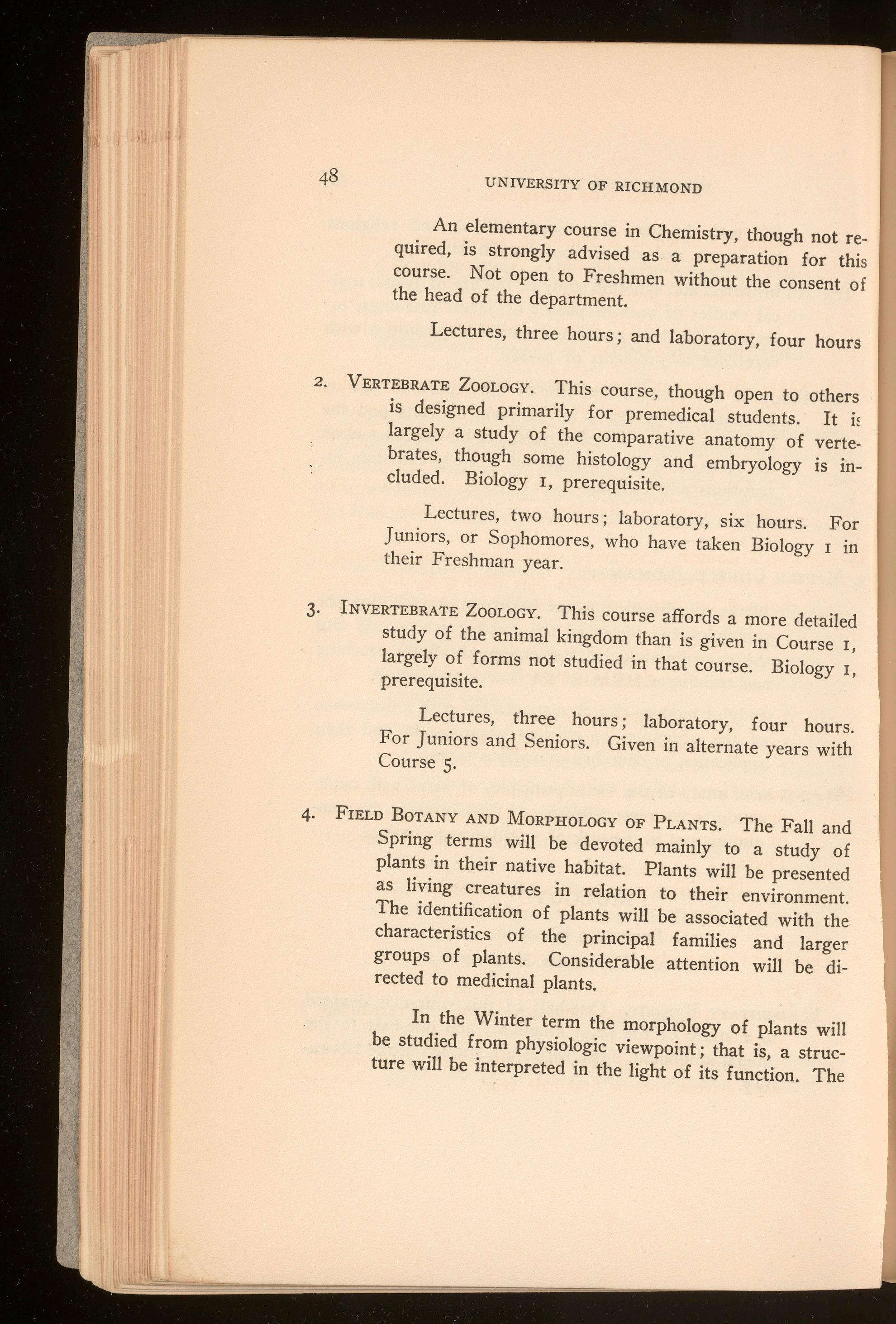
An elementary course in Chemistry, though not re- quired, is strongly advised as a preparation for this course. Not open to Freshmen without the consent of the head of the department.
Lectures, three hours; and laboratory, four hours
2. VERTEBRATEZOOLOGY.This course, though open to others is designed primarily for premedical students. It i! largely a study of the comparative anatomy of verte- brates, though some histology and embryology 1s m- cluded. Biology I, prerequisite.
Lectures, two hours; laboratory, six hours. For Juniors, or Sophomores, who have taken Biology I in their Freshman year.
3. INVERTEBRATEZOOLOGY.This course affords a more detailed study of the animal kingdom than is given in Course I, largely of forms not studied in that course. Biology I, prerequisite.
Lectures, three hours; laboratory, four hours. For Juniors and Seniors. Given in alternate years with Course 5.
4. FIELD BOTANYANDMORPHOLOGYOF PLANTS. The Fall and Spring terms will be devoted mainly to a study of plants in their native habitat. Plants will be presented as living creatures in relation to their environment. The identification of plants will be associated with the characteristics of the principal families and larger groups of plants. Considerable attention will be di- rected to medicinal plants.
In the Winter term the morphology of plants will be studied from physiologic viewpoint; that is, a struc- ture will be interpreted in the light of its function. The
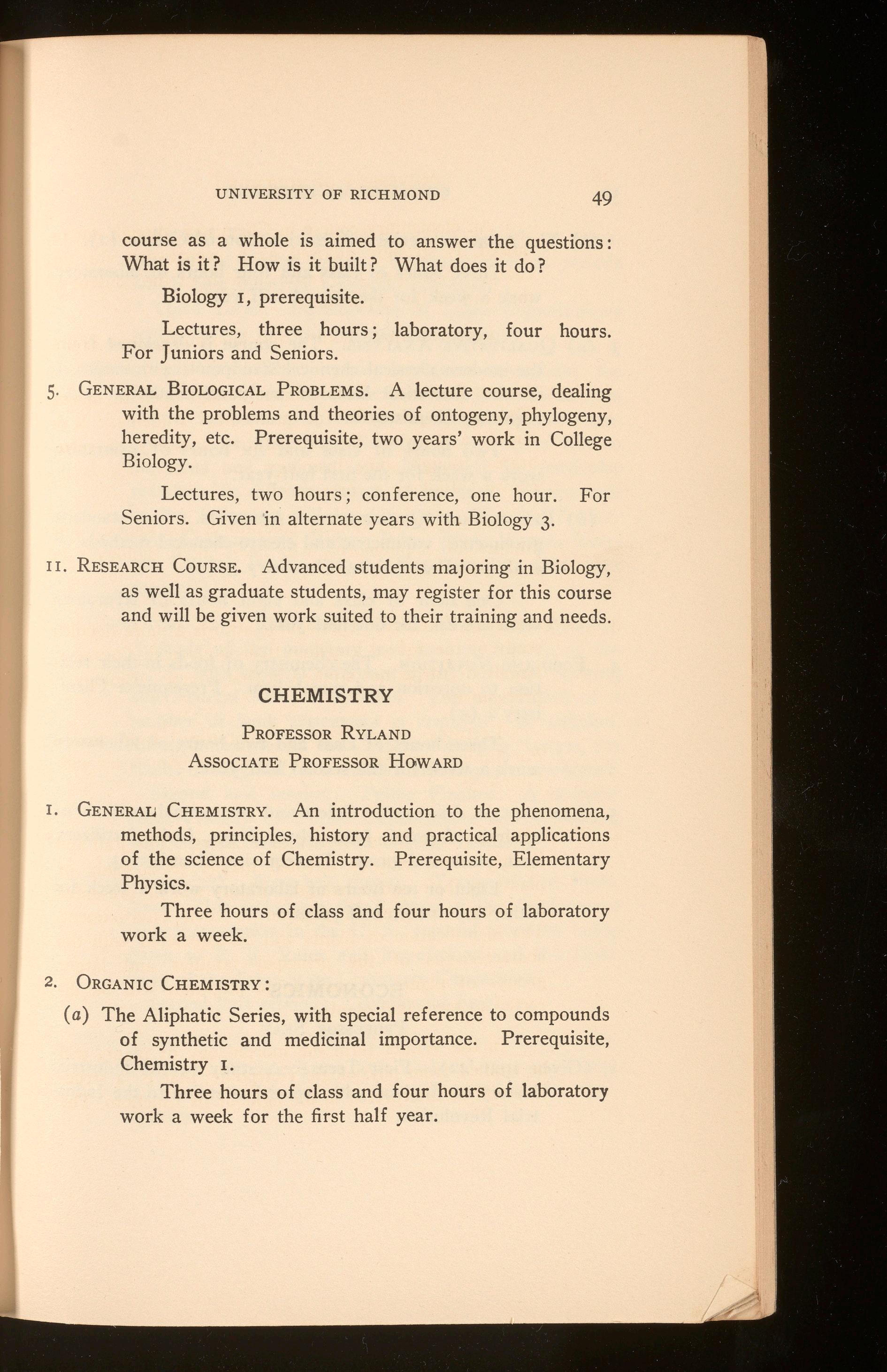
course as a whole is aimed to answer the questions: What is it? How is it built? What does it do?
Biology I, prerequisite.
Lectures, three hours; laboratory, four hours. For Juniors and Seniors.
5. GENERALBIOLOGICALPROBLEMS. A lecture course, dealing with the problems and theories of ontogeny, phylogeny, heredity, etc. Prerequisite, two years' work in College Biology.
Lectures, two hours; conference, one hour. For Seniors. Given in alternate years with Biology 3.
II. RESEARCHCouRSE. Advanced students majoring in Biology, as well as graduate students, may register for this course and will be given work suited to their training and needs.
PROFESSORRYLAND
AssocIATE PROFESSORHow ARD
I. GENERALJCHEMISTRY. An introduction to the phenomena, methods, principles, history and practical applications of the science of Chemistry. Prerequisite, Elementary Physics.
Three hours of class and four hours of laboratory work a week.
2. ORGANICCHEMISTRY:
( a) The Aliphatic Series, with special reference to compounds of synthetic and medicinal importance. Prerequisite, Chemistry I.
Three hours of class and four hours of laboratory work a week for the first half year.

(b) The Aromatic Series. A continuation of Course (a).
Three hours of class and four hours of laboratory work a week for the second half year.
3. (a) QUALITATIVEANALYSIS. The course is developed from the modern physical chemical standpoint, with emphasi s on the theoretical basis of analytical methods. Prerequisite, Chemistry 1.
Two hours of class and six hours of laboratory work a week for the first half year.
(b) ELEMENTARYQUANTITATIVEANALYSIS. The standard gravimetric, volumetric and electro-chemical methods of analysis. Prerequisite, Chemistry 3 (a) .
One hour of class and eight hours of laboratory work a week for one-half year.
4. FooD ANDNUTRITION. The chemistry of foods in their relation to nutrition and metabolism. Prerequisite Chemistry 2 (a) .
Three hours of class and two hours of laboratory work a week for the second half year .
5. COMMERCIALANALYSIS. Select and commercial methods of analysis of water, foods, dyes, drugs, fuels, fertilizers, ores, steels and gases. Prerequisite, Chemistry 3.
Eight or ten hours of laboratory work a week for either one or both half years.
1. (Given 1921-'22). First Term: A study of the industrial history of England with especial attention to the Industrial Revolution.
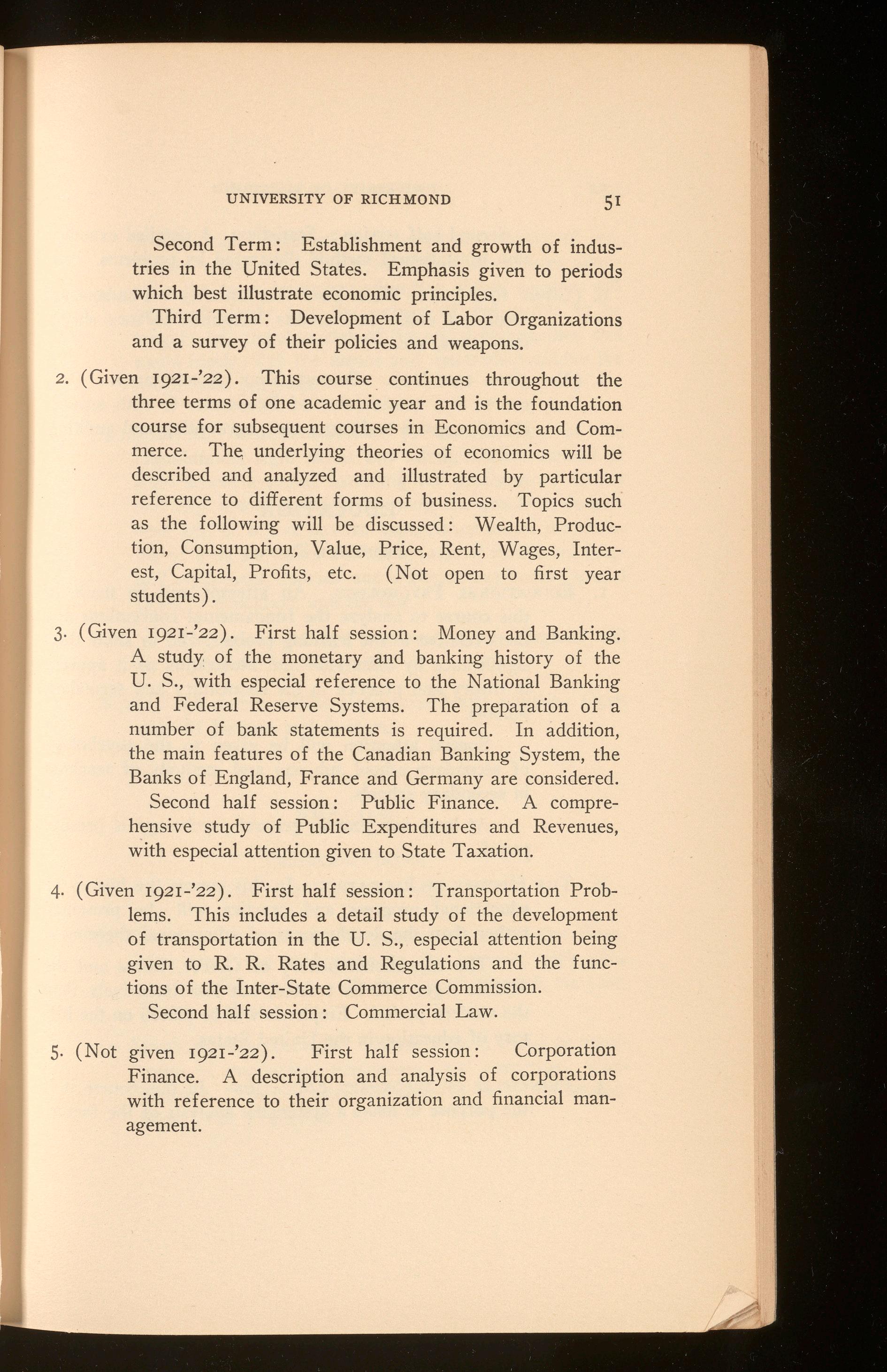
Second Term: Establishment and growth of industries in the United States. Emphasis given to periods which best illustrate economic principles.
Third Term: Development of Labor Organizations and a survey of their policies and weapons.
2. ( Given 1921-'22). This course continues throughout the three terms of one academic year and is the foundation course for subsequent courses in Economics and Commerce. The . underlying theories of economics will be described and analyzed and illustrated by particular reference to different forms of business. Topics such as the following will be discussed : Wealth , Production, Consumption, Value, Price, Rent, Wages, Interest, Capital, Profits, etc. (Not open to first year students).
3. ( Given 1921-'22). First half session: Money and Banking. A study of the monetary and banking history of the U S , with especial reference to the National Banking and Federal Reserve Systems. The preparation of a number of bank statements is required. In addition, the main features of the Canadian Banking System, the Banks of England, France and Germany are considered.
Second half session: Public Finance. A comprehensive study of Public Expenditures and Revenues, with especial attention given to State Taxation.
4. (Given 1921-'22). First half session: Transportation Problems . This includes a detail study of the development of transportation in the U . S., especial attention being given to R. R. Rates and Regulations and the functions of the Inter-State Commerce Commission.
Second half session: Commercial Law
5. (Not given 1921-'22). First half session: Corporation Finance. A description and analysis of corporations with reference to their organization and financial management.
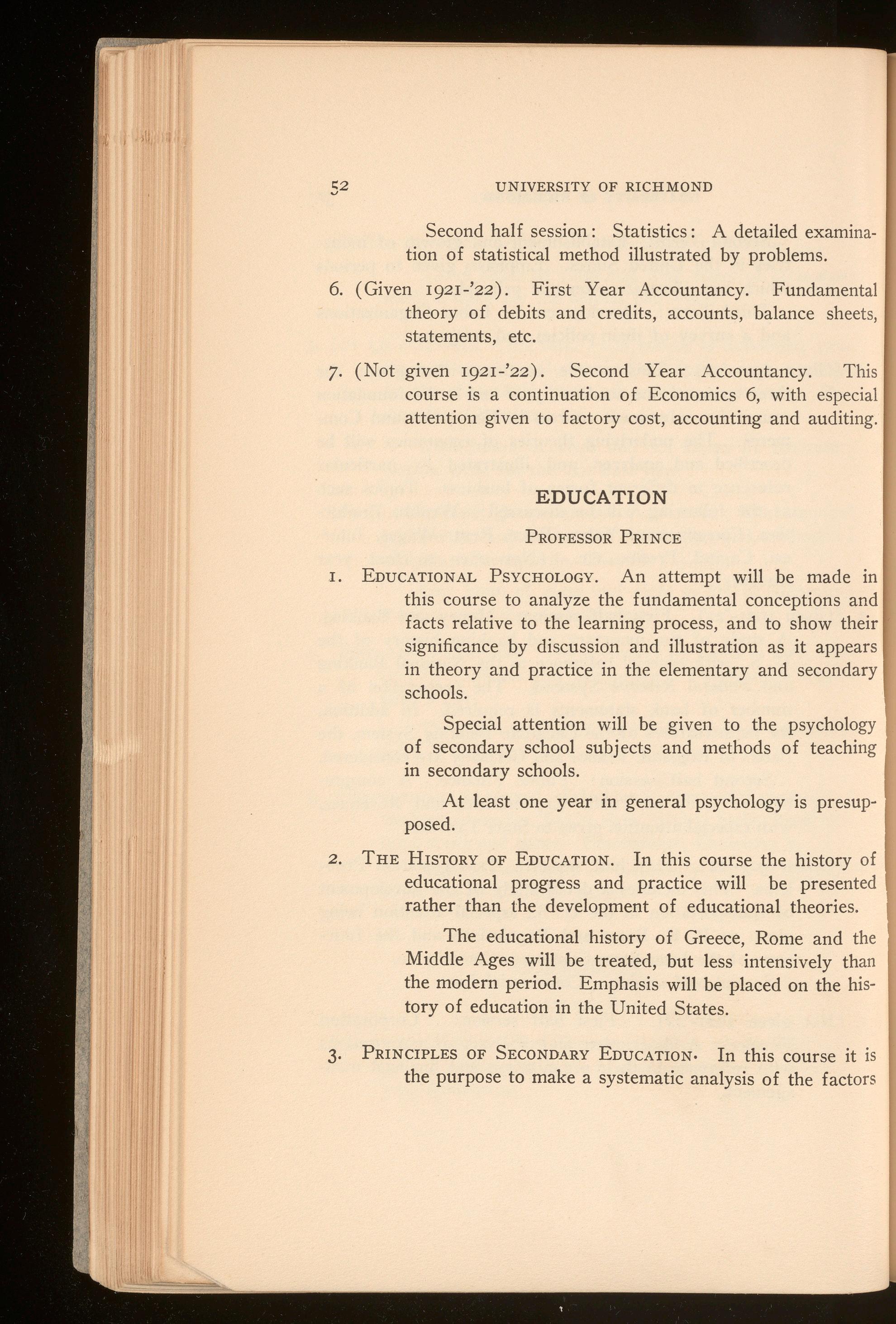
Second half session: Statistics: A detailed exami nation of statistical method illustrated by problems.
6. (Given 1921-'22) . First Year Accountancy. Fundamen tal theory of debits and credits, accounts , balance sheets, statements, etc.
7. (Not given 1921-'22) Second Year Accountancy . Th is course is a continuation of Economics 6, with esp ecial attention given to factory cost, accounting and auditin g.
r. EDUCATIONALPSYCHOLOGY.An attempt will be made in this course to analyze the fundamental conceptions and facts relative to the learning process, and to show their significance by di scussion and illustration as it appear s in theory and practice in the elementary and secondar y schools .
Special attention will be given to the psycholo gy of secondary school subjects and methods of teachin g in secondary schools.
At least one year in general psychology is presupposed.
2. THE HISTORYOF EDUCATION In this course the history of educational progress and practice will be present ed rather than the development of educational theories .
The educational history of Greece , Rome and t he Middle Ages will be treated, but less intensively th an the modern period. Emphasis will be placed on the history of education in the United States.
3. PRINCIPLESOF SECONDARYEDUCATION• In this course it is the purpose to make a systematic analysis of the facto rs
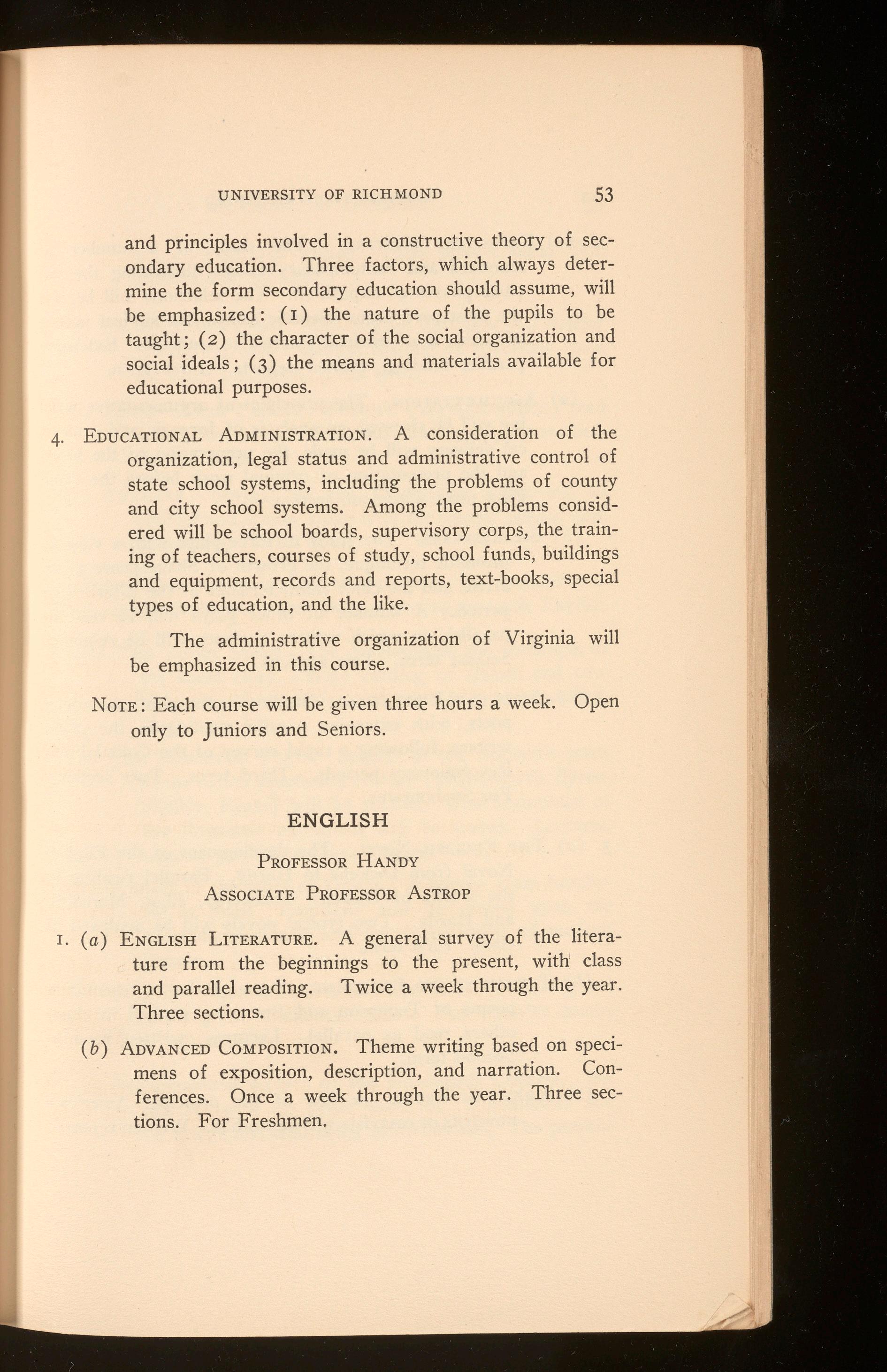
and principles involved in a constructive theory of secondary education. Three factors, which always determine the form secondary education should assume, will be emphasized : (I) the nature of the pupils to be taught; ( 2) the character of the social organization and social ideals; (3) the means and materials available for educational purposes.
4. EDUCATIONALADMINISTRATION. A consideration of the organization, legal status and administrative control of state school systems, including the problems of county and city school systems. Among the problems considered will be school boards, supervisory corps, the training of teachers, courses of study, school funds, buildings and equipment, records and reports, text-books, special types of education, and the like.
The administrative organization of Virginia will be emphasized in this course.
NOTE: Each course will be given three hours a week. Open only to Juniors and Seniors.
ASSOCIATEPROFESSORAsTROP
I. (a) ENGLISH LITERATURE. A general survey of the literature from the beginnings to the present, with ' class and parallel reading. Twice a week through the year. Three sections.
(b) ADVANCEDCOMPOSITION.Theme writing based on specimens of exposition, description, and narration. Conferences. Once a week through the year. Three sections. For Freshmen.
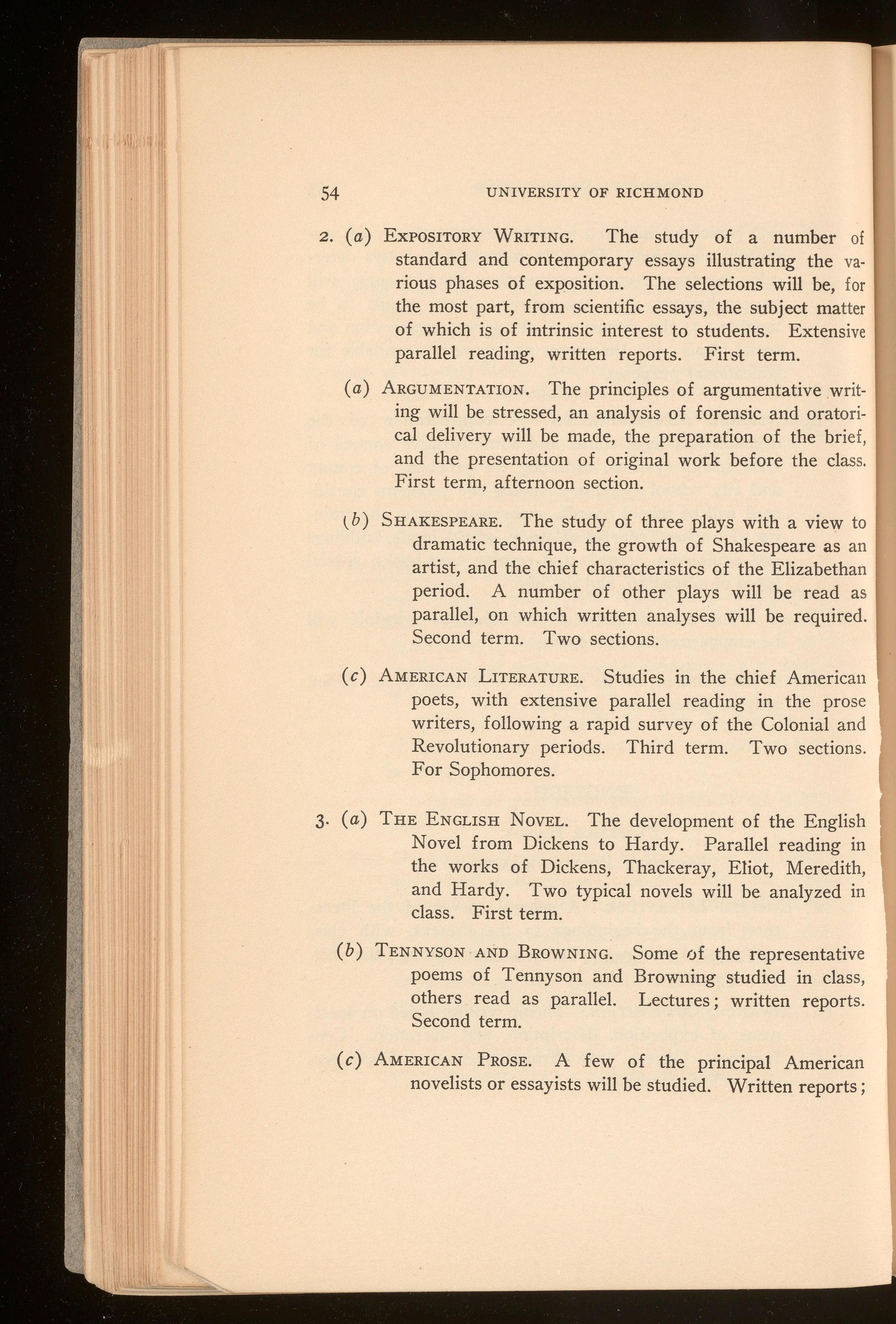
2. (a) ExPOSITORYWRITING. The study of a number of standard and contemporary essays illustrating the various phases of exposition. The selections will be, for the most part, from scientific essays, the subject matter of which is of intrinsic interest to students. Extensive parallel reading, written reports. First term.
(a) ARGUMENTATION.The principles of argumentative writing will be stressed, an analysis of forensic and oratorical delivery will be made, the preparation of the brief , and the presentation of original work before the class. First term, afternoon section.
lb) SHAKESPEARE.The study of three plays with a view to dramatic technique, the growth of Shakespeare as an artist, and the chief characteristics of the Elizabethan period. A number of other plays will be read as parallel, on which written analyses will be required . Second term. Two sections.
(c) AMERICANLITERATURE. Studies in the chief American poets, with extensive parallel reading in the prose writers, following a rapid survey of the Colonial and Revolutionary periods. Third term. Two sections. For Sophomores.
3. (a) THE ENGLISH NovEL. The development of the English Novel from Dickens to Hardy. Parallel reading in the works of Dickens, Thackeray, Eliot, Meredith, and Hardy. Two typical novels will be analyzed in class. First term.
( b) TENNYSONAND BROWNING. poems of Tennyson and others read as parallel. Second term.
Some of the representative Browning studied in class, Lectures ; written reports .
( c) AMERICAN PROSE. A few of the principal American novelists or essayists will be studied. Written reports;

extensive parallel reading. Three times a week For Juniors and Seniors.
4. (a) ANGLO-SAXONPROSE. Old English Grammar and Reader (Smith's), with collateral reading of selections from the prose literature. First term.
(b) ANGLO-SAXONPOETRY. Beowulf (Wyatt's edition) read entire, and several hundred lines critically studied. Second term.
(c) CHAUCER. Several of the Canterbury Tales will be studied and others, along with the shorter poems, read as parallel. Third term.
N oTE-This course is designed primarily for students preparing for graduate work and those expecting to teach English .
5. (a ) THE SHORTSTORY. The development and technique of the short story. Wide reading of classic and contemporary short stories, and exercise in story writing. First term .
( b) THE ROMANTICPOETS
Several of the Romantic poets of the earlier nineteenth century (Wordsworth, Byron, Shelley, Keats) will be studied. The beginnings of the Romantic movement will be traced. Lectures, reports, parallel reading. Second term
( c) A study of the types of Drama. A survey from Aeschylus to Ibsen. Emphasis will be placed upon the Elizabethan period and the development of modern Drama.
For Juniors, Seniors and Graduates. Courses 3 and 5 are given irt alternate years. For 1920- ' 21 course 5 will be given.
6. ( a) Representative writers of the Nineteenth Century . Beginning with the prose work of Wordsworth and Coleridge and continuing to Swinburne. The purpose
7.

of this course will be to study excerpts of literat ure that reveal the English political, economic, social and religious thought of the period. Extensive readi ng and frequent reports.
( b) Literature of the Bible. With the Old Testament as an introduction, general types of literature will be considered, with emphasis placed upon the prophets a nd their messages as well as upon the main philosoph ic ideas of the wisdom-literature of the Hebrews .
( c) Methods and Materials of Literary Criticism. The lyr ic, epic and allied forms of poetry will be examine d. Students who desire to find in the critical process a discipline, an aim, or a profession , will profit by thi s course . Primarily for Seniors and Graduates. Given in 1921-'22. Consent of Department must be obtaine d.
Intended for students with special aims. Business English, feature writing and newspape r criticism, articles for the particular occasion , techniqu e of the short-story, leading to submission of work to magazine editors, experimentation in versification, in dramatic endeavor, and in the art of biography will be studied. For students, primarily, juniors, senior s and graduates, who are planning to make literary work a profession. One hour a week throughout sesston. Frequent consultations.
A survey of literature from r66o to r 78o, emphasizing, ( r) changes in national life an d manners, ( 2) the growth of philosophic and political systems, (3) certain characteristic literary forms, such as comedy , the essay and the novel. Fall and winter terms:
( b) Recent American Literature. A consideration of prose , specifically papers of state, recent biography and maga-
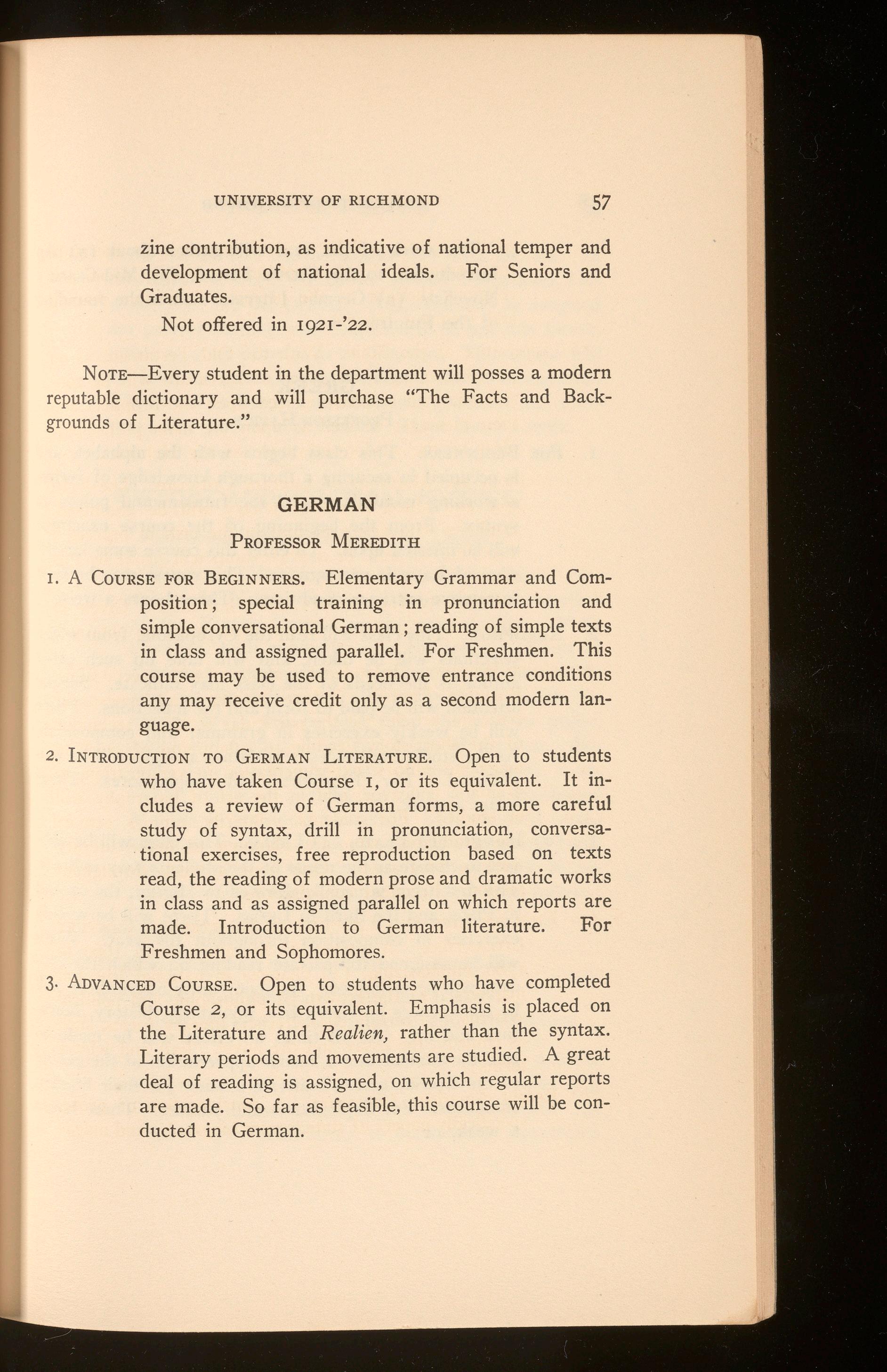
zine contribution, as indicative of national temper and development of national ideals. For Seniors and Graduates.
Not offered in 1921-'22.
Norn-Every student in the department will posses a modern reputable dictionary and will purchase "The Facts and Backgrounds of Literature."
GERMAN
PROFESSORMEREDITH
I. A CounsE FORBEGINNERS. Elementary Grammar and Composition; special training in pronunciation and simple conversational German; reading of simple texts in class and assigned parallel. For Freshmen. This course may be used to remove entrance conditions any may receive credit only as a second modern language.
2. INTRODUCTIONTO GERMAN LITERATURE. Open to students who have taken Course 1, or its equivalent. It includes a review of German forms, a more careful study of syntax, drill in pronunciation, conversational exercises, free reproduction based on texts read, the reading of modern prose and dramatic works in class and as assigned parallel on which reports are made. Introduction to German literature. For Freshmen and Sophomores.
3- ADVANCEDCouRSE. Open to students who have completed Course 2, or its equivalent. Emphasis is placed on the Literature and Realien, rather than the syntax. Literary periods and movements are studied. A great deal of reading is assigned, on which regular reports are made. So far as feasible, this course will be conducted in German.
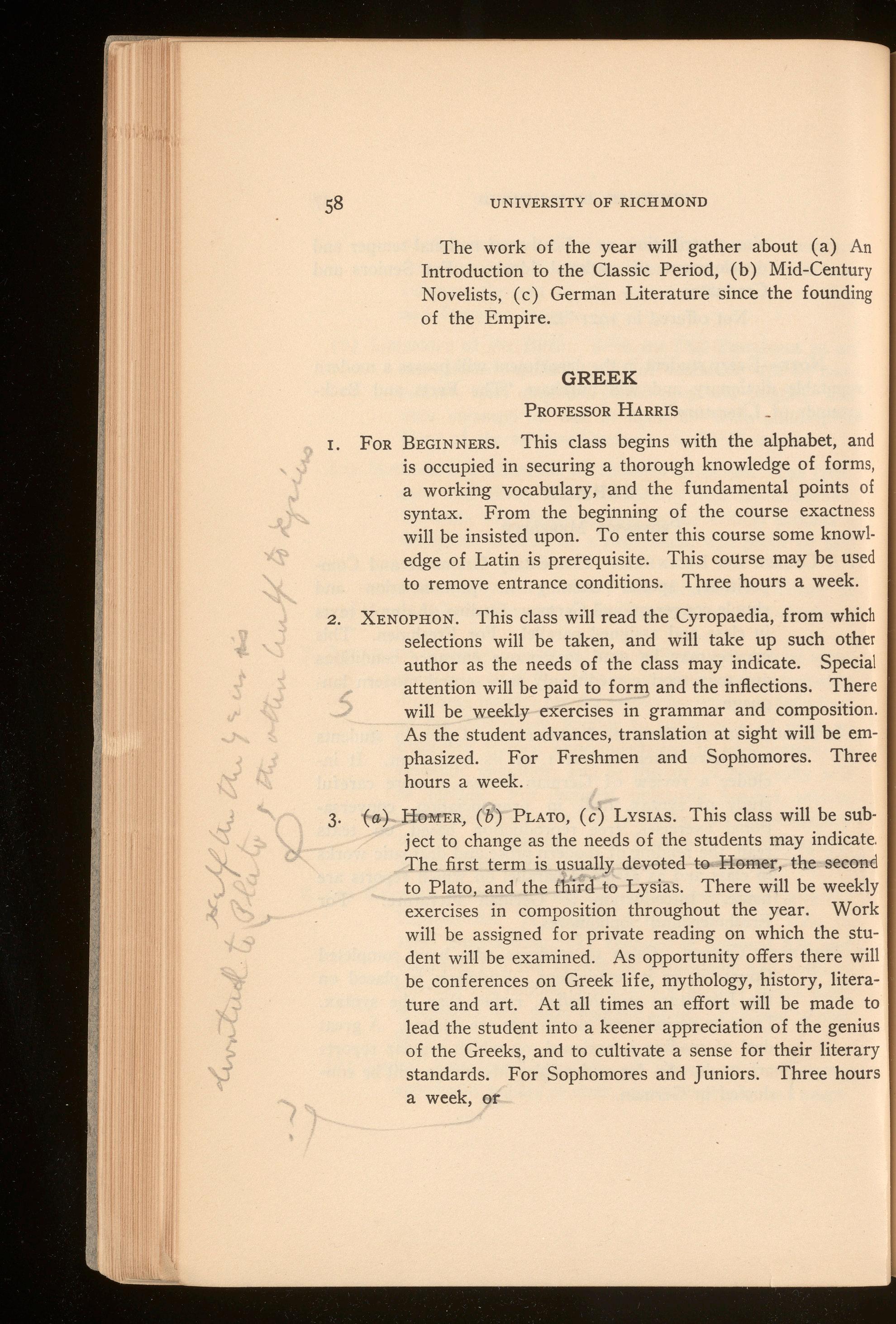
The work of the year will gather about (a) An Introduction to the Classic Period, (b) Mid-Centu ry Novelists, ( c) German Literature since the foundi ng of the Empire.
1. FoR BEGINNERS. This class begins with the alphabet, a nd is occupied in securing a thorough knowledge of form s, a working vocabulary, and the fundamental points of syntax. From the beginning of the course exactne ss will be insisted upon. To enter this course some know ledge of Latin is prerequisite. This course may be used to remove entrance conditions. Three hours a week.
2. s XENOPHON. This class will read the Cyropaedia, from which selections will be taken, and will take up such other author as the needs of the class may indicate. Specia l attention will be paid to for~ and the inflections . Ther e will be weekly exercises in grammar and composition . As the student advances, translation at sight will be emphasized. For Freshmen and Sophomores. Three hours a week .
3. (a) HOMER, (b) PLATO,(c) LYSIAS. This class will be subject to change as the needs of the students may indicate . The first term is usually devoted to Homer, the second to Plato, and the f1itrd to Lysias There will be weekl y exercises in composition throughout the year. Work will be assigned for private reading on which the student will be examined. As opportunity offers there will be conferences on Greek life, mythology, history, literature and art. At all times an effort will be made to lead the student into a keener appreciation of the geniu s of the Greeks, and to cultivate a sense for their literar y standards. For Sophomores and Juniors. Three hours a week, or
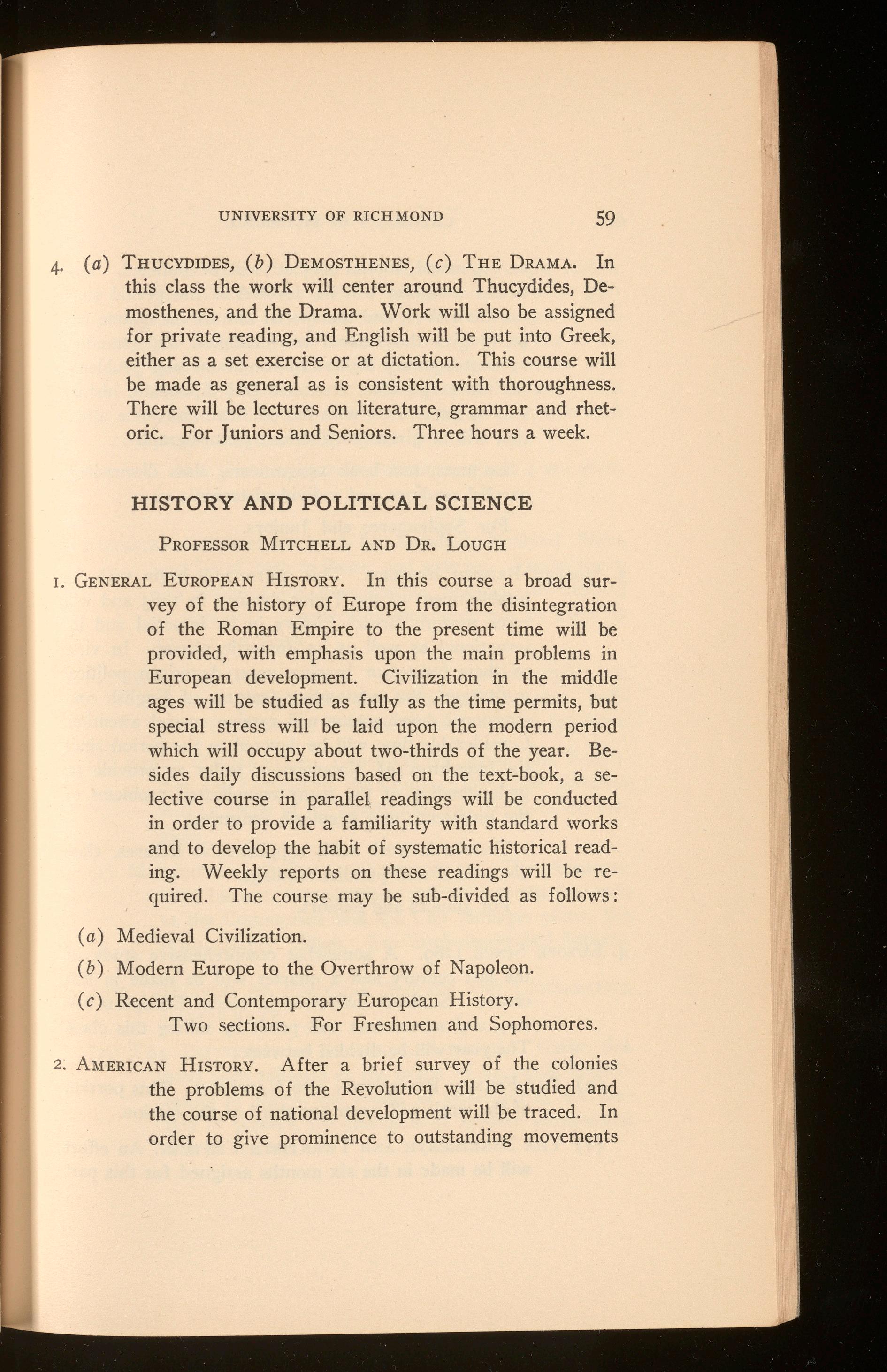
4. ( a) THUCYDIDES,(b) DEMOSTHENES,(c) THE DRAMA. In this class the work will center around Thucydides, Demosthenes, and the Drama. Work will also be assigned for private reading, and English will be put into Greek, either as a set exercise or at dictation This course will be made as general as is consistent with thoroughness There will be lectures on literature, grammar and rhetoric. For Juniors and Seniors. Three hours a week
PROFESSORMITCHELLAND DR. LOUGH
1. GENERALEUROPEANHISTORY. In this course a broad survey of the history of Europe from the disintegration of the Roman Empire to the present time will be provided, with emphasis upon the main problems in European development. Civilization in the middle ages will be studied as fully as the time permits, but special stress will be laid upon the modern period which will occupy about two-thirds of the year Besides daily discussions based on the text-book , a selective course in parallel readings will be conducted in order to provide a familiarity with standard works and to develop the habit of systematic historical reading. Weekly reports on these readings will be required The course may be sub-divided as follows:
(a ) Medieval Civilization.
( b ) Modern Europe to the Overthrow of Napoleon.
(c ) Recent and Contemporary European History. Two sections. For Freshmen and Sophomores.
2: A MERICANHISTORY. After a brief survey of the colonies the problems of the Revolution will be studied and the course of national development will be traced In order to give prominence to outstanding movements
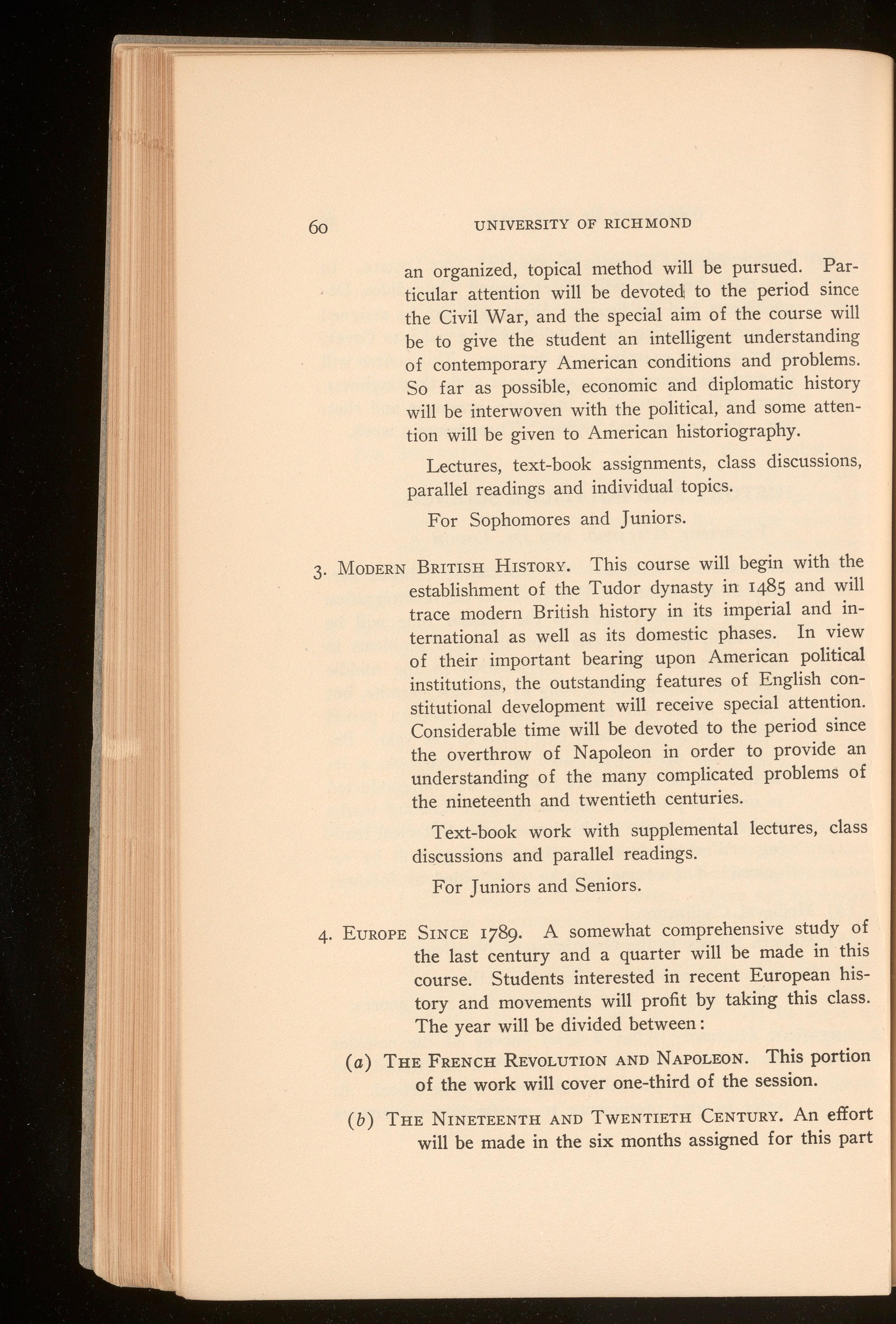
an organized, topical method will be pursued. Particular attention will be devoted to the period since the Civil War, and the special aim of the course will be to give the student an intelligent understanding of contemporary American conditions and problems. So far as possible, economic and diplomatic history will be interwoven with the political, and some attention will be given to American historiography.
Lectures, text-book assignments, class discussions, parallel readings and individual topics.
For Sophomores and Juniors.
3. MODERNBRITISH HISTORY. This course will begin with the establishment of the Tudor dynasty in 1485 and will trace modern British history in its imperial and international as well as its domestic phases. In view of their important bearing upon American political institutions, the outstanding features of English constitutional development will receive special attention. Considerable time will be devoted to the period since the overthrow of Napoleon in order to provide an understanding of the many complicated problems of the nineteenth and twentieth centuries.
Text-book work with supplemental lectures, class discussions and parallel readings.
For Juniors and Seniors.
4. EUROPE SINCE 1789. A somewhat comprehensive study of the last century and a quarter will be made in this course. Students interested in recent European history and movements will profit by taking this class. The year will be divided between :
(a) THE FRENCH REVOLUTIONANDNAPOLEON. This portion of the work will cover one-third of the session.
(b) THE NINETEENTHANDTWENTIETHCENTURY.An effort will be made in the six months assigned for this part
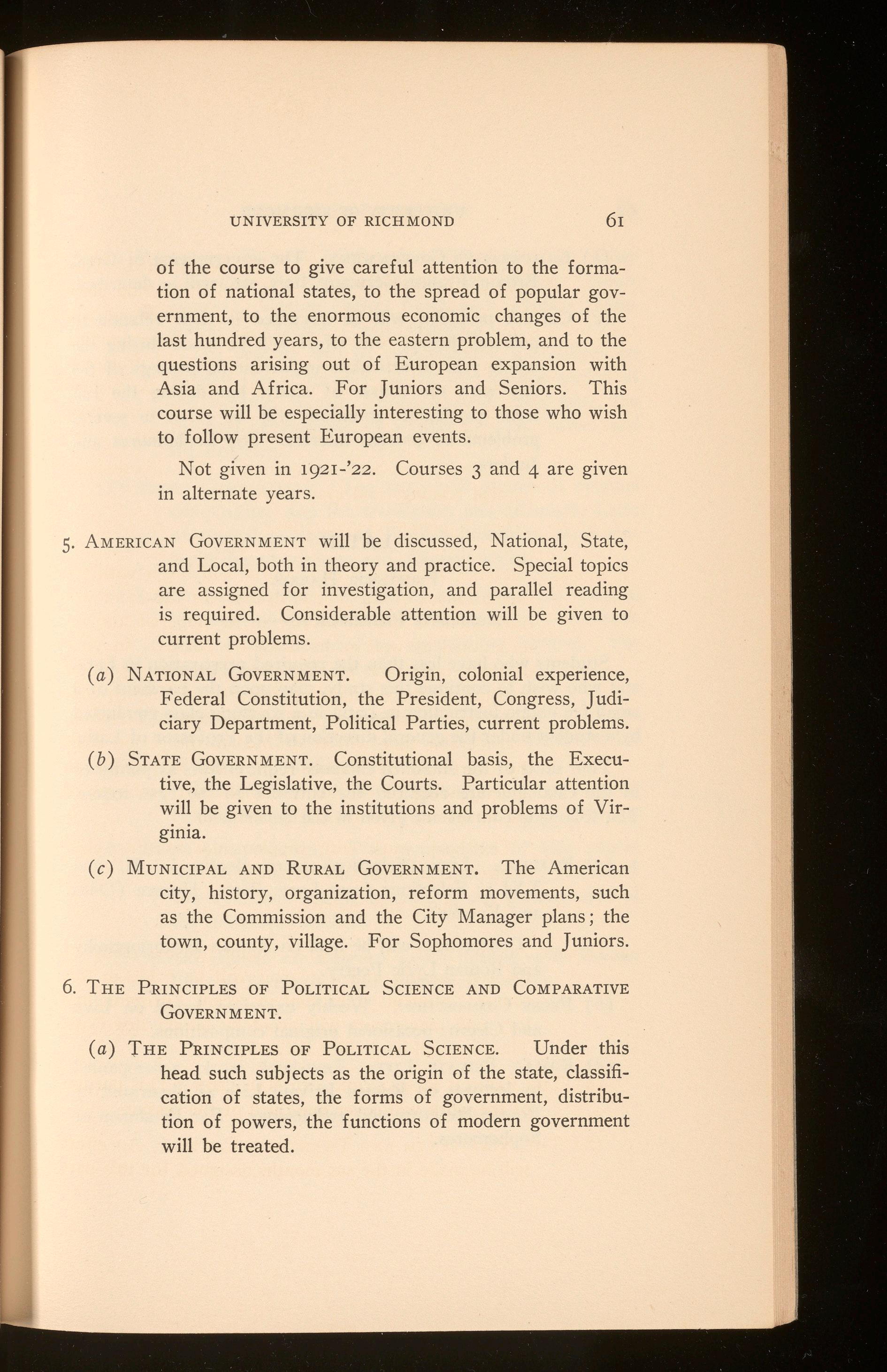
of the course to give careful attention to the formation of national states, to the spread of popular government, to the enormous economic changes of the last hundred years, to the eastern problem, and to the questions arising out of European expansion with Asia and Africa. For Juniors and Seniors. This course will be especially interesting to those who wish to follow present European events.
Not given in 1921-'22. Courses 3 and 4 are given in alternate years.
5. AMERICANGovERNMENTwill be discussed, National, State, and Local, both in theory and practice. Special topics are assigned for investigation, and parallel reading is required. Considerable attention will be given to current problems.
(a) NATIONALGOVERNMENT. Origin, colonial experience, Federal Constitution, the President, Congress, Judiciary Department, Political Parties, current problems.
(b) STATE GovERNMENT. Constitutional basis, the Executive, the Legislative, the Courts. Particular attention will be given to the institutions and problems of Virgm1a.
(c) MUNICIPAL AND RuRAL GOVERNMENT.The American city, history, organization, reform movements, such as the Commission and the City Manager plans ; the town, county, village. For Sophomores and Juniors.
6. THE PRINCIPLESOF POLITICALSCIENCE AND COMPARATIVE GOVERNMENT.
(a) THE PRINCIPLESOF PoLITICAL SCIENCE. Under this head such subjects as the origin of the state, classification of states, the forms of government, distribution of powers, the functions of modern government will be treated.
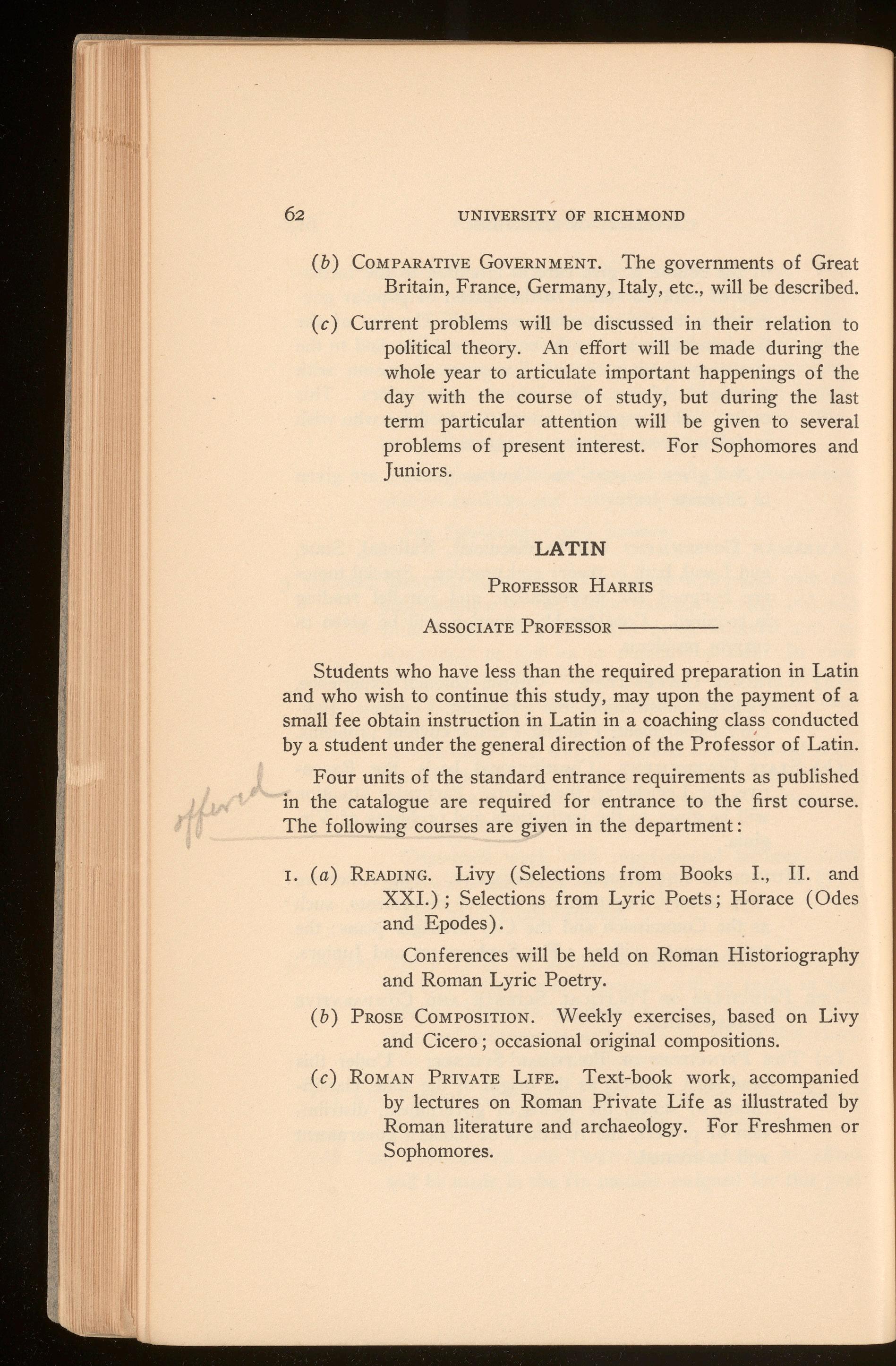
(b) COMPARATIVEGOVERNMENT.The governments of Great Britain, France, Germany, Italy, etc., will be described.
( c) Current problems will be discussed in their relation to political theory. An effort will be made during the whole year to articulate important happenings of the day with the course of study, but during the last term particular attention will be given to several problems of present interest. For Sophomores and Juniors.
PROFESSORHARRIS
ASSOCIATEPROFESSOR-----
Students who have less than the required preparation in Latin and who wish to continue this study, may upon the payment of a small fee obtain instruction in Latin in a coaching class conducted by a student under the general direction of the Professor of Latin. Four units of the standard entrance requirements as published in the catalogue are required for entrance to the first course. The following courses are given in the department :
I. (a) READING. Livy ( Selections from Books I., II. and XXI.) ; Selections from Lyric Poets; Horace ( Odes and Epodes).
Conferences will be held on Roman Historiography and Roman Lyric Poetry.
( b) PROSE COMPOSITION.Weekly exercises, based on Livy and Cicero ; occasional original compositions.
(c) RoMAN PRIVATE LIFE. Text-book work, accompanied by lectures on Roman Private Life as illustrated by Roman literature and archaeology. For Freshmen or Sophomores.
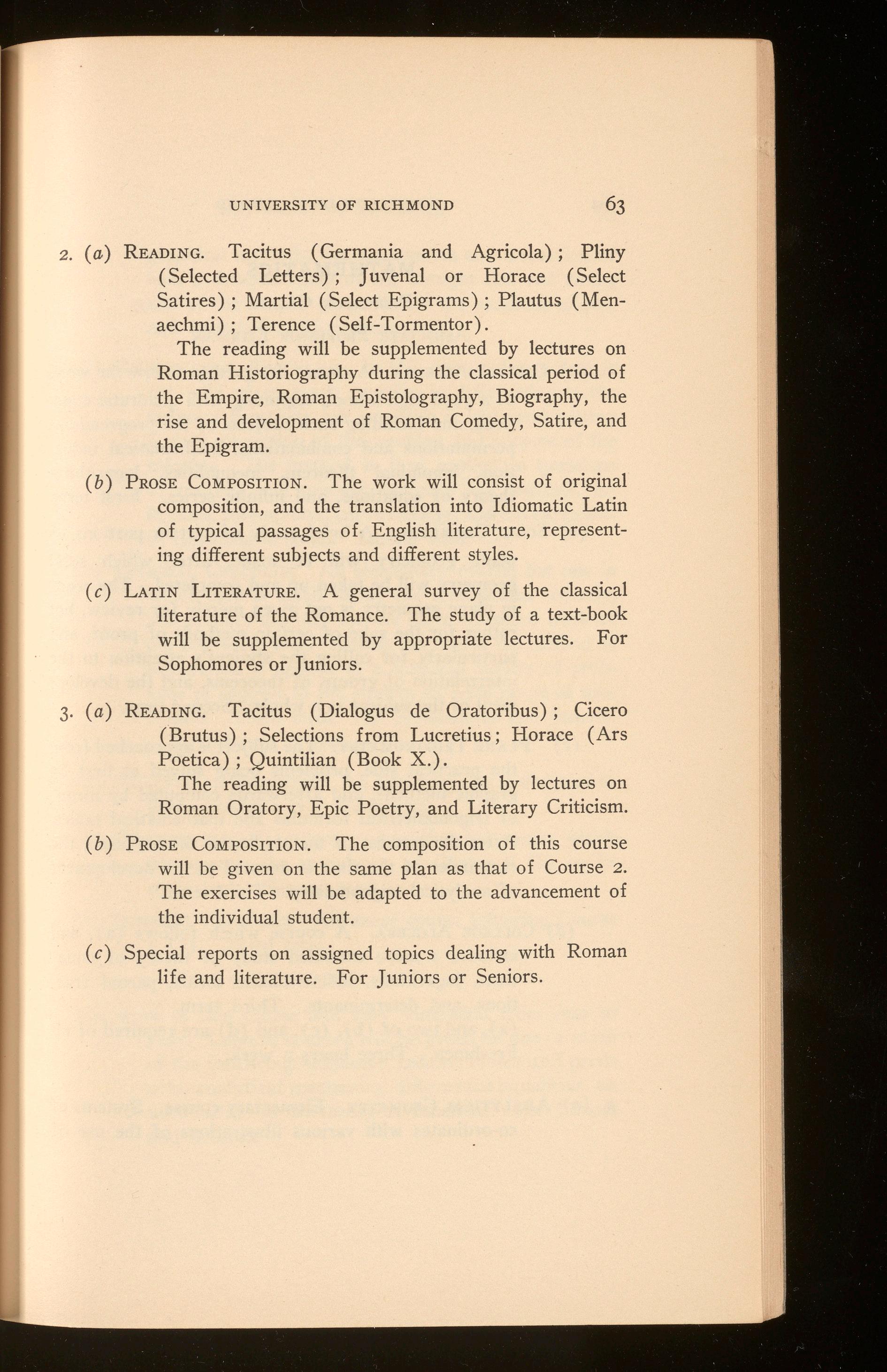
2. (a) READING. Tacitus ( Germania and Agricola) ; Pliny ( Selected Letters) ; Juvenal or Horace ( Select Satires) ; Martial ( Select Epigrams); Plautus (Menaechmi) ; Terence (Self-Tormentor) .
The reading will be supplemented by lectures on Roman Historiography during the classical period of the Empire, Roman Epistolography, Biography, the rise and development of Roman Comedy, Satire, and the Epigram.
( b) PROSE COMPOSITION.The work will consist of original composition, and the translation into Idiomatic Latin of typical passages of English literature, representing different subjects and different styles.
( c) LATIN LITERATURE. A general survey of the classical literature of the Romance. The study of a text-book will be supplemented by appropriate lectures. For Sophomores or Juniors.
3. (a) READING. Tacitus ( Dialogus de Ora tori bus) ; Cicero (Brutus); Selections from Lucretius; Horace (Ars Poetica) ; Quintilian ( Book X.).
The reading will be supplemented by lectures on Roman Oratory, Epic Poetry, and Literary Criticism.
( b) PROSE COMPOSITION. The composition of this course will be given on the same plan as that of Course 2. The exercises will be adapted to the advancement of the individual student.
( c) Special reports on assigned topics dealing with Roman life and literature. For Juniors or Seniors.

UNIVERSITYOF RICHMOND
PROFESSORGAINES
ASSOCIATEPROFESSOREHRMAN
I (a) COLLEGEALGEBRA.A course designed to follow the wo rk of a good high school, beginning with quadratic equations, and including such subjects as the progressio ns, permutations and combinations, mathematical ind uction, binominal theorem, inequalities, logarith ms, theory of equations, and infinite series. First ter m.
( b) Soun GEOMETRY. A brief study of certain portions of plane geometry will be made, after which solid geometry will be taken up and completed. The wo rk in plane geometry is not given merely for review, but rather for the sake of certain methods of proof, an d particularly for calling the student's attention to t he interrelation of groups of theorems, and the develo pment of the subject as a whole. Second term.
( c) PLANETRIGONOMETRY.The subject is approached fro m the practical side, problems being solved at first by graphic methods, and afterwards computed by mea ns of trigonometrical formulas and mathematical table s. After the interest of the student is thu.s secured, the remainder of the time is devoted to the developmen t of analytical trigonometry Third term
(d) COLLEGEALGEBRA. A course which follows (a), an d includes a more extended study of theory of equations, logarithm s, indeterminate forms , partial fractions , and determinants. Third term. (a), and two of (b), (c), and (d) are required of a ll Freshmen. Three hours a week.
2. (a) ANALYTICALGEOMETRY.Elementary course. Systems o f co-ordinates with various illustrations of the use o f
(

graphical methods, the construction and discussion of loci, a detailed study of the straight line and circle, and of the simpler properties of the parabola, ellipse, and hyperbola. First term.
b) DIFFERENTIALCALCULUS. In this course the student is not only given much practice in differentiating the ordinary functions, but emphasis is laid upon getting a clear conception of t'he meaning and ' purpose of the calculus. The method is then applied to questions of maxima and minima, tangents and normals, inflexions, assymptotes, curve tracings, and the expansion of functions in series. Second term.
(
c) INTEGRALCALCULUS. An elementary course, but one in which care is taken to lay the foundations securely, and prepare the way for the more advanced work of the following year. During the course the method of integration is applied to a sufficient variety of problems to suggest to the student its wide range of usefulness. Third term. For Sophomores and Juniors. Three hours a week.
3. (a) ANALYTICALGEOMETRY.An advanced course designed to follow course 2 (a). First term.
( b) DIFFERENTIALCALCULUS. An advanced course which presupposes the completion of Course 2 (b) or its equivalent. Second term.
( c) INTEGRALCALCULUS.Advanced course following Course 2 ( c). Third term.
Three hours a week.
4. The work of this course will vary somewhat from year to year. Lecture courses will be given on one or more of the following subjects: Infinite series and products, analytical mechanics, differential equations, an introduction to the theory of functions. For Juniors and Seniors.
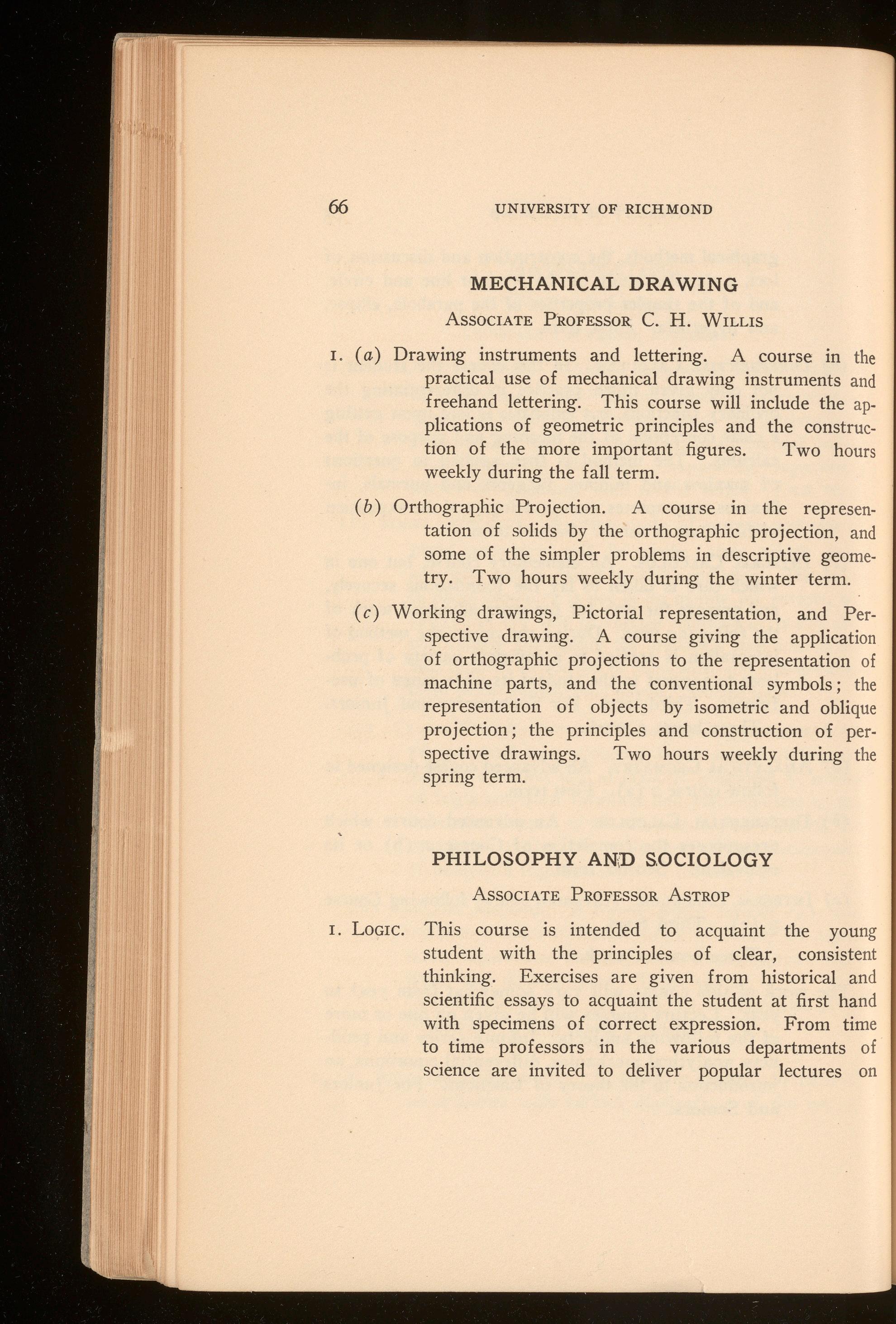
ASSOCIATEPROFESSOR,C. H WILLIS
I. (a) Drawing instruments and lettering. A course in the practical use of mechanical drawing instruments and freehand lettering. This course will include the applications of geometric principles and the const ruction of the more import ant figures. Two h ours weekly during the fall term.
( b) Orthographic Projection. A course in the repre sentation of solids by the orthogr aphic projection, and some of the simpler pr oblems in descriptive geo metry. Two hours weekly during the winter term .
( c) Working drawings, Pictorial representation, and P erspective drawing. A course giving the applicat ion of orthographic projections to the representation of machine parts, and the conventional symbols ; the representation of objects by isometric and obli que projection; the principles and construction of perspective drawings. Two hours weekly during the spring term.
ASSOCIATE PROFESSORASTROP
I. LOGIC. This course is intended to acquaint the you ng student with the principles of clear, consist ent thinking. Exercises are given from historical a nd scientific essays to acquaint the student at first ha nd with specimens of correct expression. From ti me to time professors in the various departments of science are invited to deliver popular lectures on
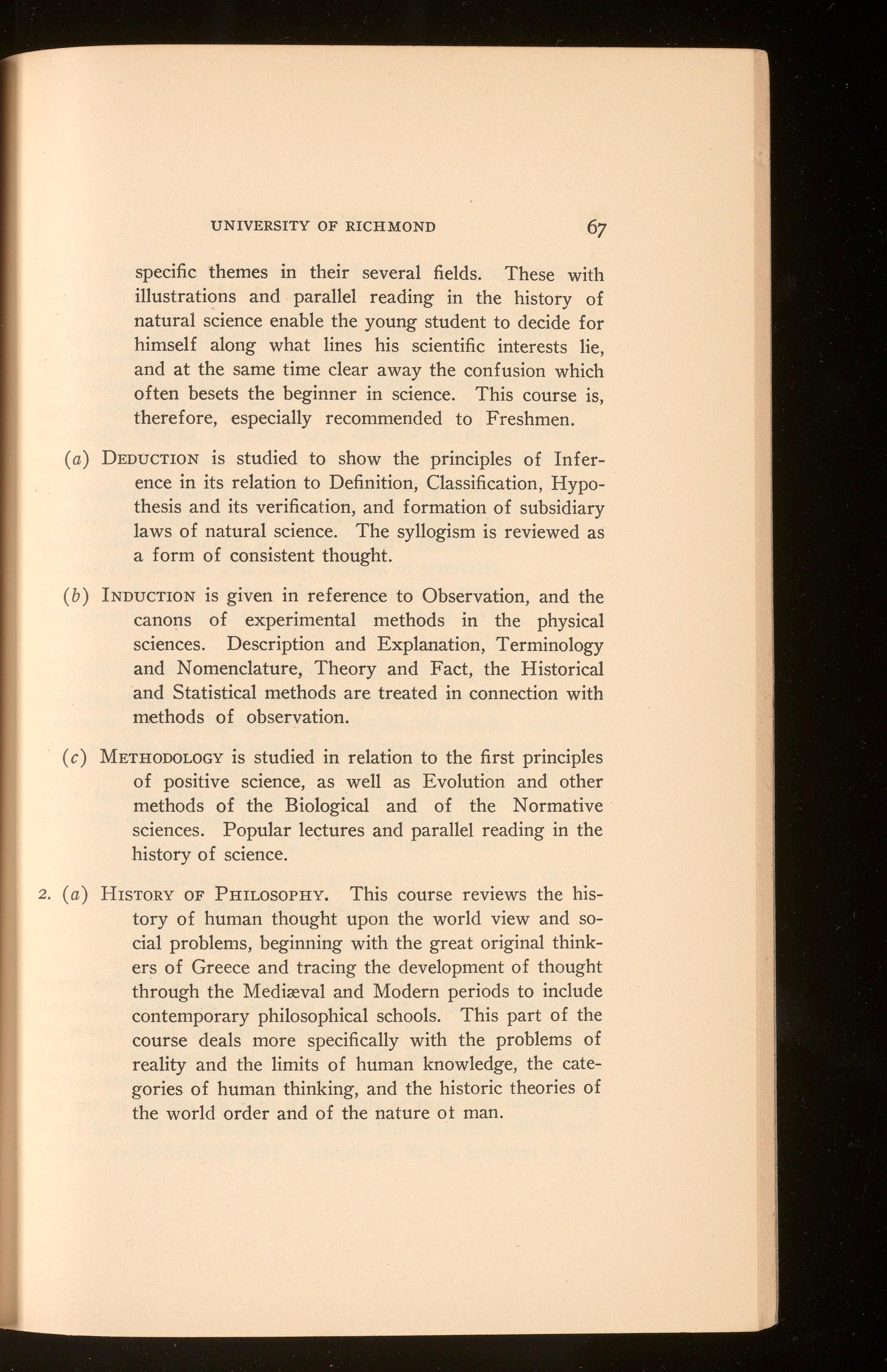
specific themes in their several fields. These with illustrations and • parallel reading in the history of natural science enable the young student to decide for himself along what lines his scientific interests lie, and at the same time clear away the confusion which often besets the beginner in science. This course is, therefore, especially recommended to Freshmen.
(a) DEDUCTIONis studied to show the principles of Inference in its relation to Definition, Classification, Hypothesis and its verification, and formation of subsidiary laws of natural science. The syllogism is reviewed as a form of consistent thought.
( b) INDUCTIONis given in reference to Observation, and the canons of experimental methods in the physical sciences. Description and Explanation, Terminology and Nomenclature, Theory and Fact, the Historical and Statistical methods are treated in connection with methods of observation.
( c) METHODOLOGY is studied in relation to the first principles of positive science, as well as Evolution and other methods of the Biological and of the Normative sciences . Popular lectures and parallel reading in the history of science.
2. (a) HISTORYOF PHILOSOPHY. This course reviews the history of human thought upon the world view and social problems, beginning with the great original thinkers of Greece and tracing the development of thought through the Medireval and Modern periods to include contemporary philosophical schools. This part of the course deals more specifically with the problems of reality and the limits of human knowledge, the categories of human thinking, and the historic theories of the world order and of the nature ot man.
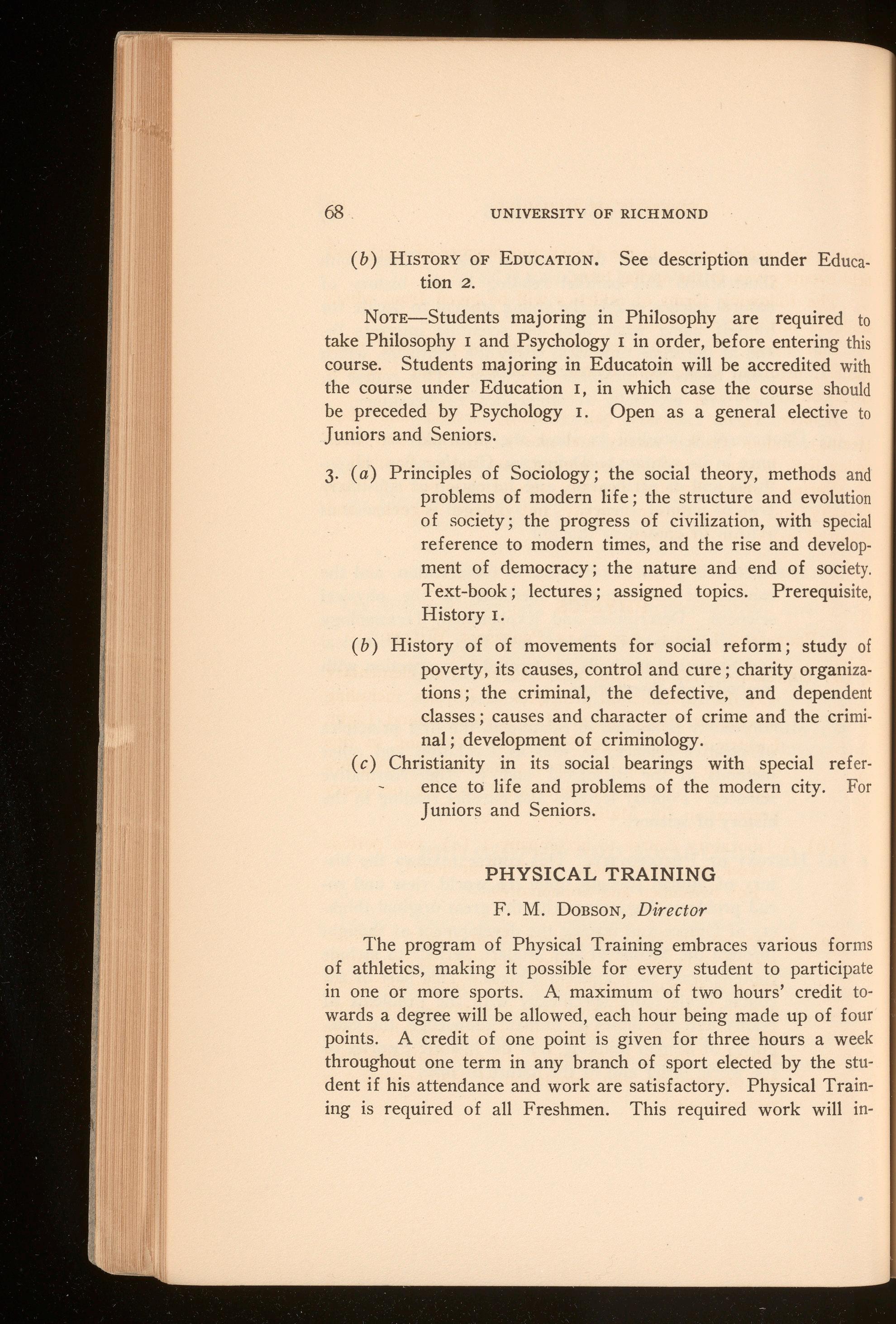
(b) HISTORYOF EDUCATION. See description under Edu cation 2.
NOTE-Students majoring in Philosophy are required to take Philosophy I and Psychology I in order, before entering this course. Students majoring in Educatoin will be accredited with the course under Education I, in which case the course should be preceded by Psychology I. Open as a general electiv e to Juniors and Seniors.
3. (a) Principles of Sociology; the social theory, methods and problems of modern life; the structure and evolut ion of society; the progress of civilization, with special reference to modern times, and the rise and deve lopment of democracy; the nature and end of society. Text-book; lectures; assigned topics. Prerequis ite, History I.
(
b) History of of movements for social reform; study of poverty, its causes, control and cure; charity organ izations; the criminal, the defective, and depend ent classes ; causes and character of crime and the cri minal; development of criminology.
( c) Christianity in its social bearings with special re ference to life and problems of the modern city. For Juniors and Seniors.
F. M. DonsoN, Director
The program of Physical Training embrace s various for ms of athletics, making it possible for every student to particip ate in one or more sports . A, maximum of two hours' credit t owards a degree will be allowed, each hour being made up of fo ur points A credit of one point is given for three hours a we ek throughout one term in any branch of sport elected by the st udent if his attendance and work are satisfactory. Physical Trai ning is required of all Freshmen. This required work will in-
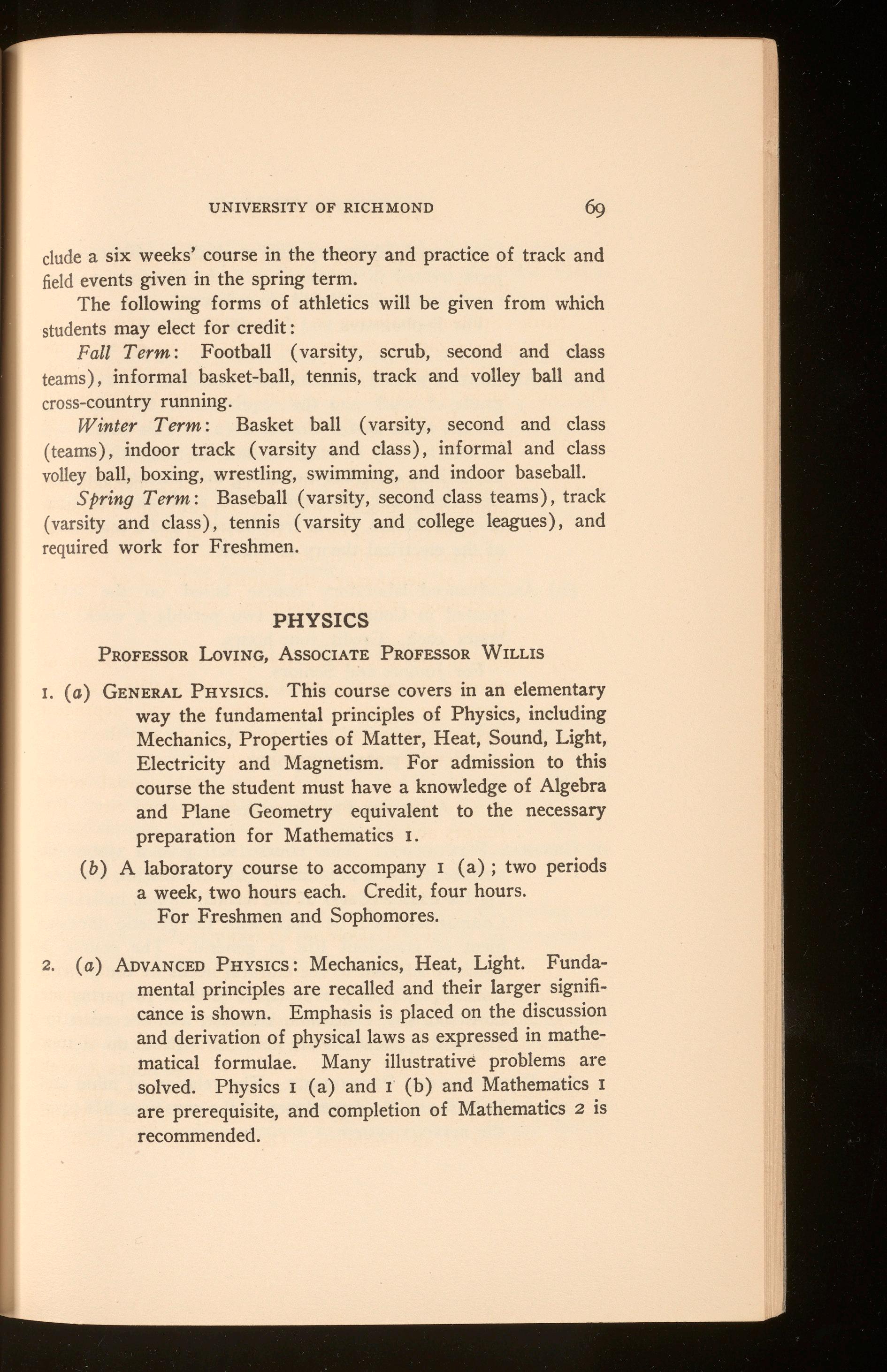
elude a six weeks' course in the theory and practice of track and field events given in the spring term.
T he following forms of athletics will be given from which students may elect for credit:
Fall Term: Football ( varsity , scrub, second and class teams), informal basket-ball, tennis, track and volley ball and cross-country running.
W inter Term : Basket ball (varsity, second and class (teams ), indoor track ( varsity and class), informal and class volley ball, boxing, wrestling, swimming, and indoor baseball.
S pring Term: Baseball (varsity, second class teams) , track (varsity and class), tennis ( varsity and college leagues), and required work for Freshmen.
I. (a ) GENERALPHYSICS. This course covers in an elementary way the fundamental principles of Physics, including Mechanics, Properties of Matter, Heat, Sound, Light, Electricity and Magnetism. For admission to this course the student must have a knowledge of Algebra and Plane Geometry equivalent to the necessary preparation for Mathematics I.
( b) A laboratory course to accompany I (a) ; two periods a week, two hours each. Credit, four hours. For Freshmen and Sophomores.
2. ( a) ADVANCEDPHYSICS: Mechanics, Heat, Light. Fundamental principles are recalled and their larger significance is shown. Emphasis is placed on the discussion and derivation of physical laws as expressed in mathematical formulae. Many illustrative problems are solved. Physics I (a) and r (b) and Mathematics I are prerequisite, and completion of Mathematics 2 is recommended.
UNIVERSITYOF RICHMOND
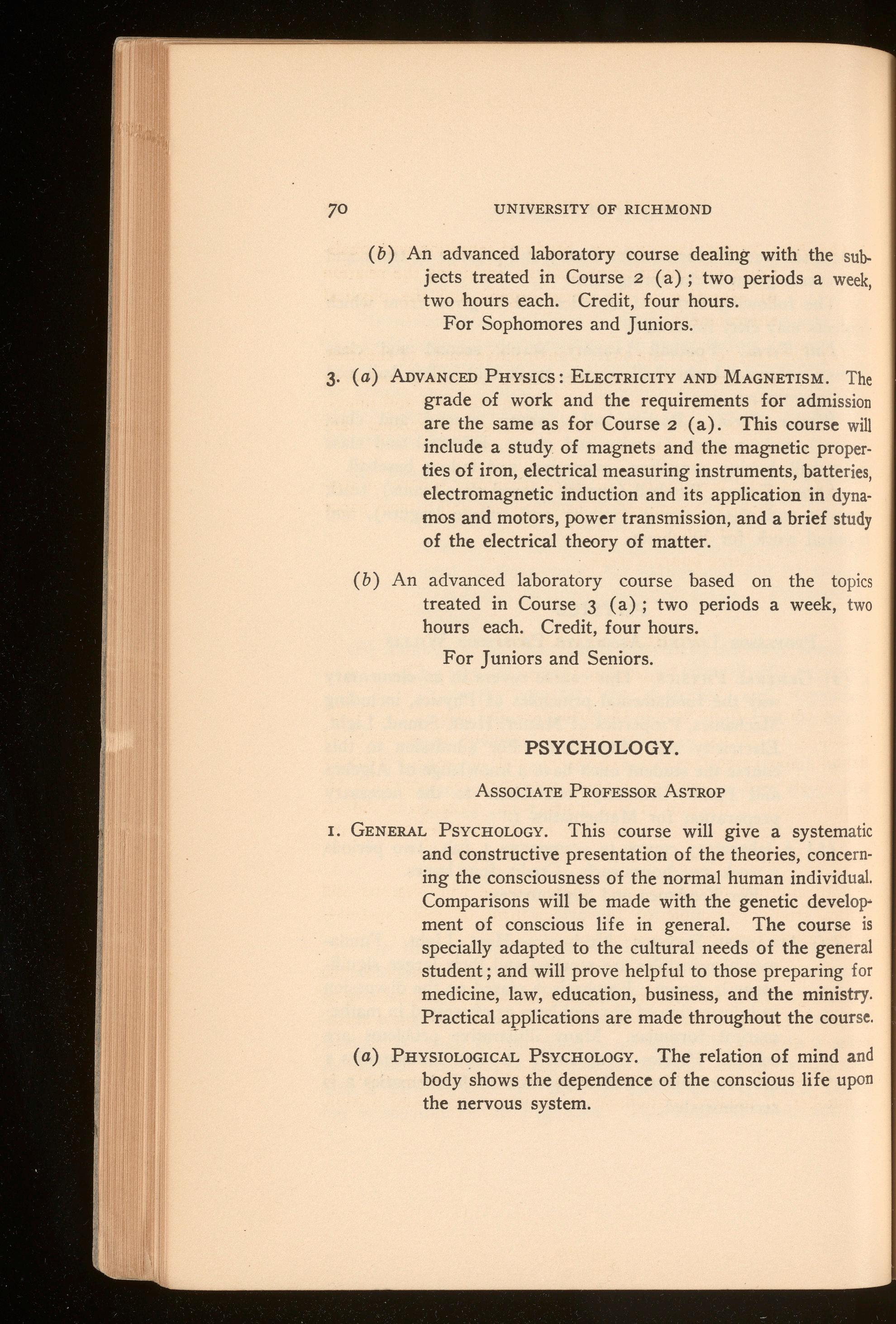
(
b) An advanced laboratory course dealing with the subjects treated in Course z (a) ; two periods a week, two hours each. Credit, four hours
For Sophomores and Juniors .
3. (a) ADVANCEDPHYSICS: ELECTRICITYANDMAGNETISM . The grade of work and the requirements for admi ssion are the same as for Course z (a). This course will include a study of magnets and the magnetic pro perties of iron, electrical measuring instruments, batte ries, electromagnetic induction and its application in dynamos and motors, power transmission, and a brief study of the electrical theory of matter.
( b) An advanced laboratory course based on the t opics treated in Course 3 (a) ; two periods a week, two hours each. Credit, four hours.
For Juniors and Seniors . PSYCHOLOGY.
ASSOCIATEPROFESSORASTROP
I GENERALPSYCHOLOGY.This course will give a system atic and constructive presentation of the theories, conc erning the consciousness of the normal human individ ual. Comparisons will be made with the genetic devel o{>" ment of conscious life in general. The course is specially adapted to the cultural needs of the gen eral student; and will prove helpful to those preparing for medicine, law, education, business, and the minis try. Practical applications are made throughout the cou rse.
(a) PHYSIOLOGICALPSYCHOLOGY.The relation of mind and body shows the dependence of the conscious life up on the nervous system.
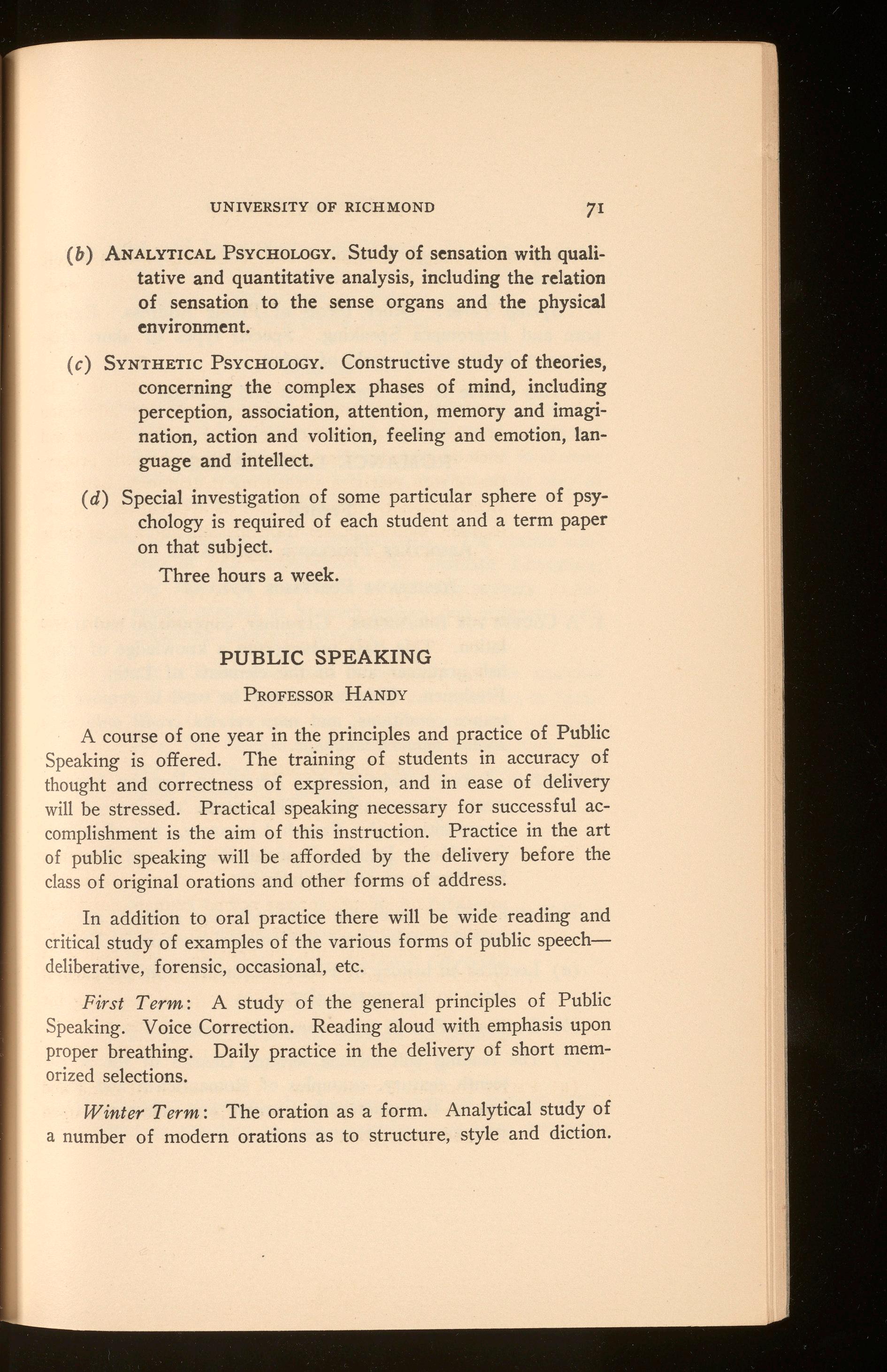
(b) ANALYTICALPSYCHOLOGY.Study of sensation with qualitative and quantitative analysis, including the relation of sensation to the sense organs and the physical environment.
(
c) SYNTHETICPSYCHOLOGY.Constructive study of theories, concerning the complex phases of mind, including perception, association, attention, memory and imagination, action and volition, feeling and emotion, language and intellect.
(
d) Special investigation of some particular sphere of psychology is required of each student and a term paper on that subject.
Three hours a week.
A course of one year in the principles and practice of Public Speaking is offered. The training of students in accuracy of thought and correctness of expression, and in ease of delivery will be stressed. Practical speaking necessary for successful accomplishment is the aim of this instruction. Practice in the art of public speaking will be afforded by the delivery before the class of original orations and other forms of address.
In addition to oral practice there will be wide reading and critical study of examples of the various forms of public speechdeliberative, forensic, occasional, etc.
First Term: A study of the general principles of Public Speaking. Voice Correction. Reading aloud with emphasis upon proper breathing. Daily practice in the delivery of short memorized selections.
Winter Term: The oration as a form. Analytical study of a number of modern orations as to structure, style and diction.
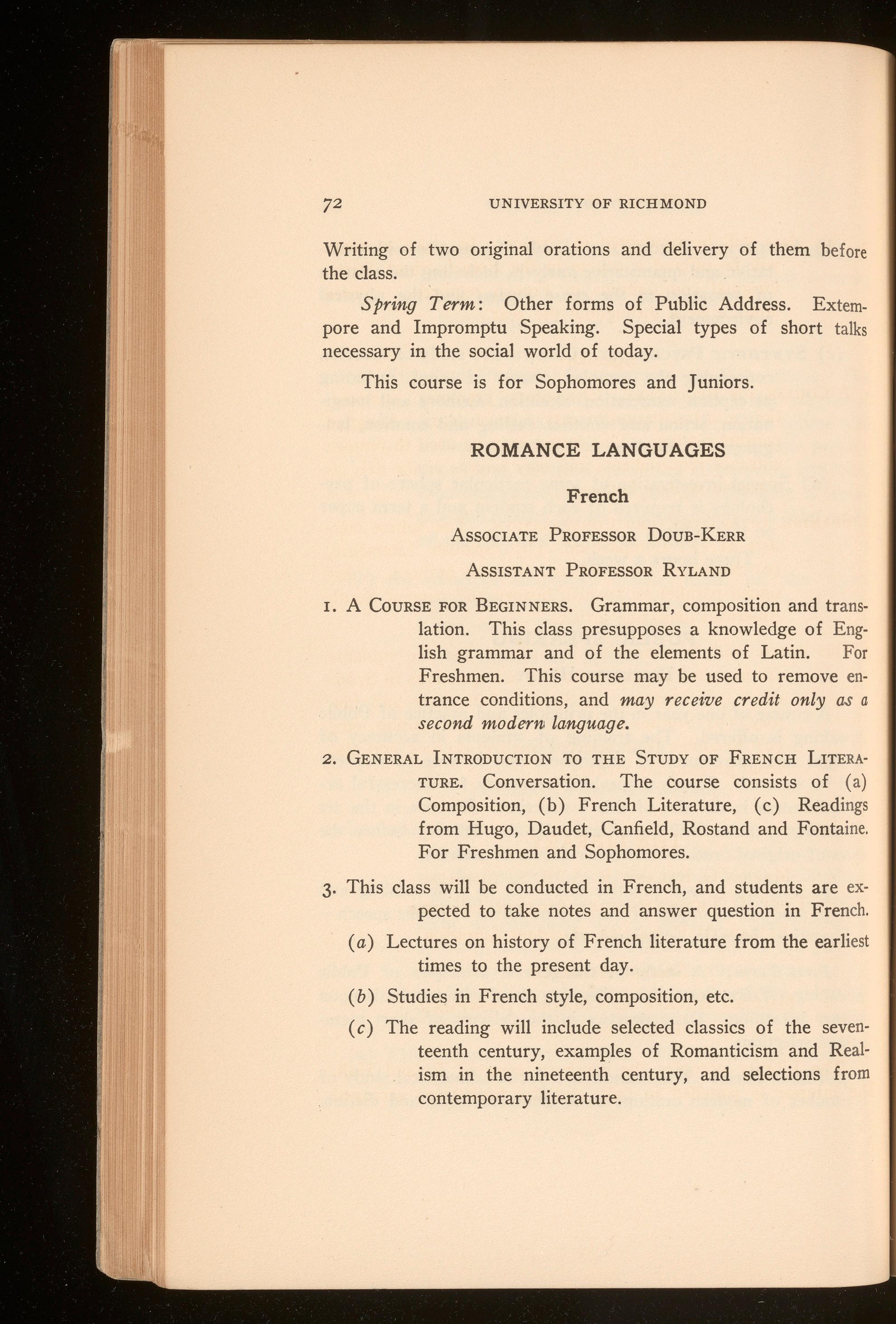
Writing of two original orations and delivery of them b efore the class.
Spring Term: Other forms of Public Address. Ext empore and Impromptu Speaking. Special types of short talks necessary in the social world of today.
This course is for Sophomores and Juniors.
French
I. A CouRSE FORBEGINNERS. Grammar, composition and tr anslation. This class presupposes a knowledge of E nglish grammar and of the elements of Latin. For Freshmen. This course may be used to remove entrance conditions, and may receive credit only as a second modern language.
2. GENERALINTRODUCTIONTO THE STUDYOF FRENCH LITERATURE. Conversation. The course consists of (a ) Composition, (b) French Literature, ( c) Readi ngs from Hugo, Daudet, Canfield, Rostand and Fonta ine. For Freshmen and Sophomores.
3. This class will be conducted in French, and students are expected to take notes and answer question in Fre nch.
(a) Lectures on history of French literature from the earl iest times to the present day.
( b) Studies in French style, composition, etc.
( c) The reading will include selected classics of the seventeenth century, examples of Romanticism and Re alism in the nineteenth century, and selections fr om contemporary literature.
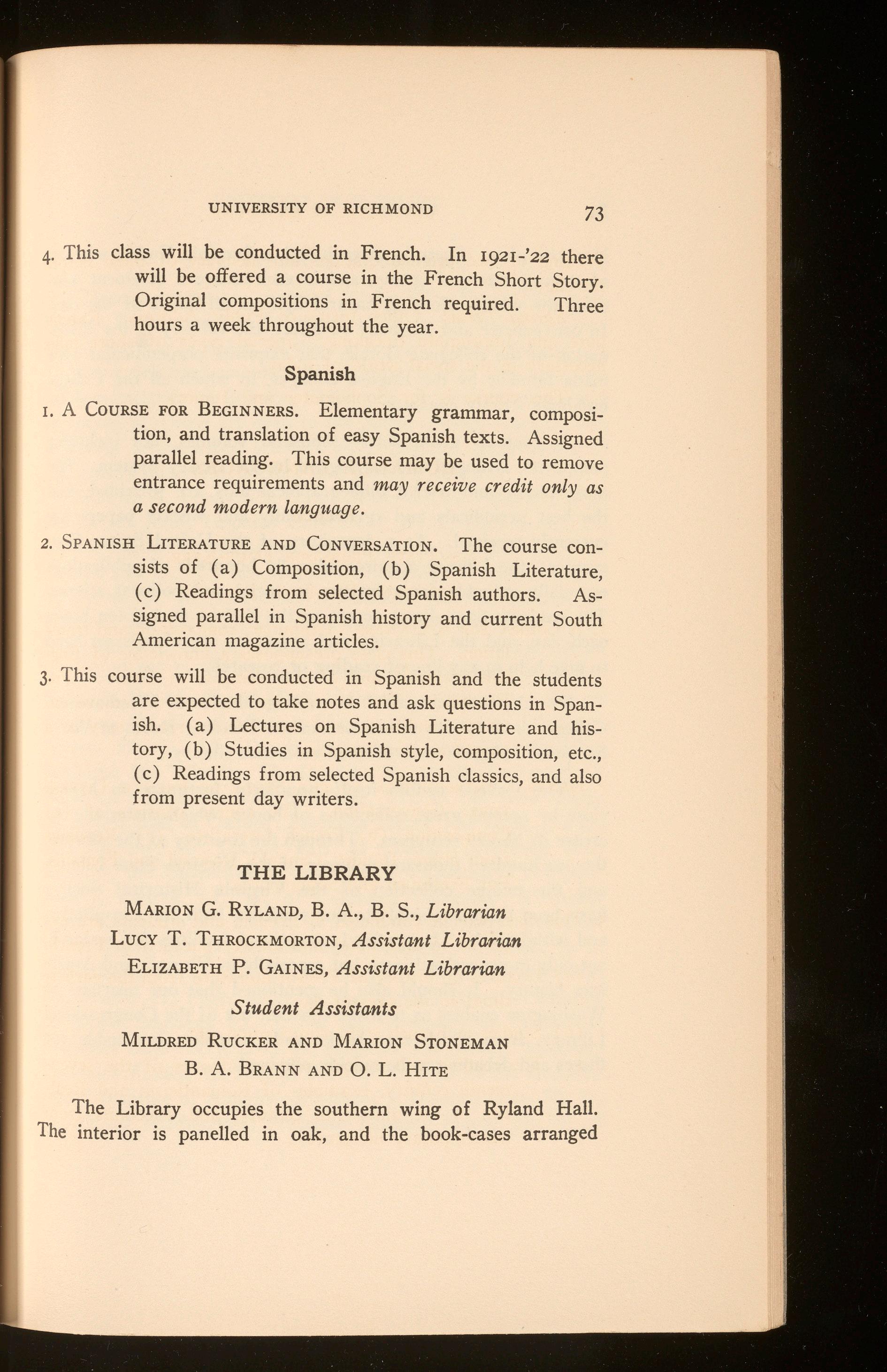
4. Thi s class will be conducted in French. In 1921-'22 there will be offered a course in the French Short Story. Original compositions in French required. Three hours a week throughout the year.
1. A CouRSE FOR BEGINNERS. Elementary grammar, composition, and translation of easy Spanish texts. Assigned parallel reading. This course may be used to remove entrance requirements and may receive credit only as a second modern language.
2. SPANISH LITERATUREAND CONVERSATION.The course consists of (a) Composition, ( b) Spanish Literature, ( c) Readings from selected Spanish authors. Assigned parallel in Spanish history and current South American magazine articles.
3. This course will be conducted in Spanish and the students are expected to take notes and ask questions in Spanish. (a) Lectures on Spanish Literature and history, (b) Studies in Spanish style, composition, etc., ( c) Readings from selected Spanish classics, and also from present day writers.
MARIONG. RYLAND,B. A., B. S., Librarian
LucY T. THROCKMORTON,Assistant Librarian
ELIZABETHP. GAINES, Assistant Librarian
Student Assistants
MILDREDRUCKER AND MARION STONEMAN
B. A. BRANN AND0. L. HITE
The Library occupies the southern wing of Ryland Hall. The interior is panelled in oak, and the book-cases arranged
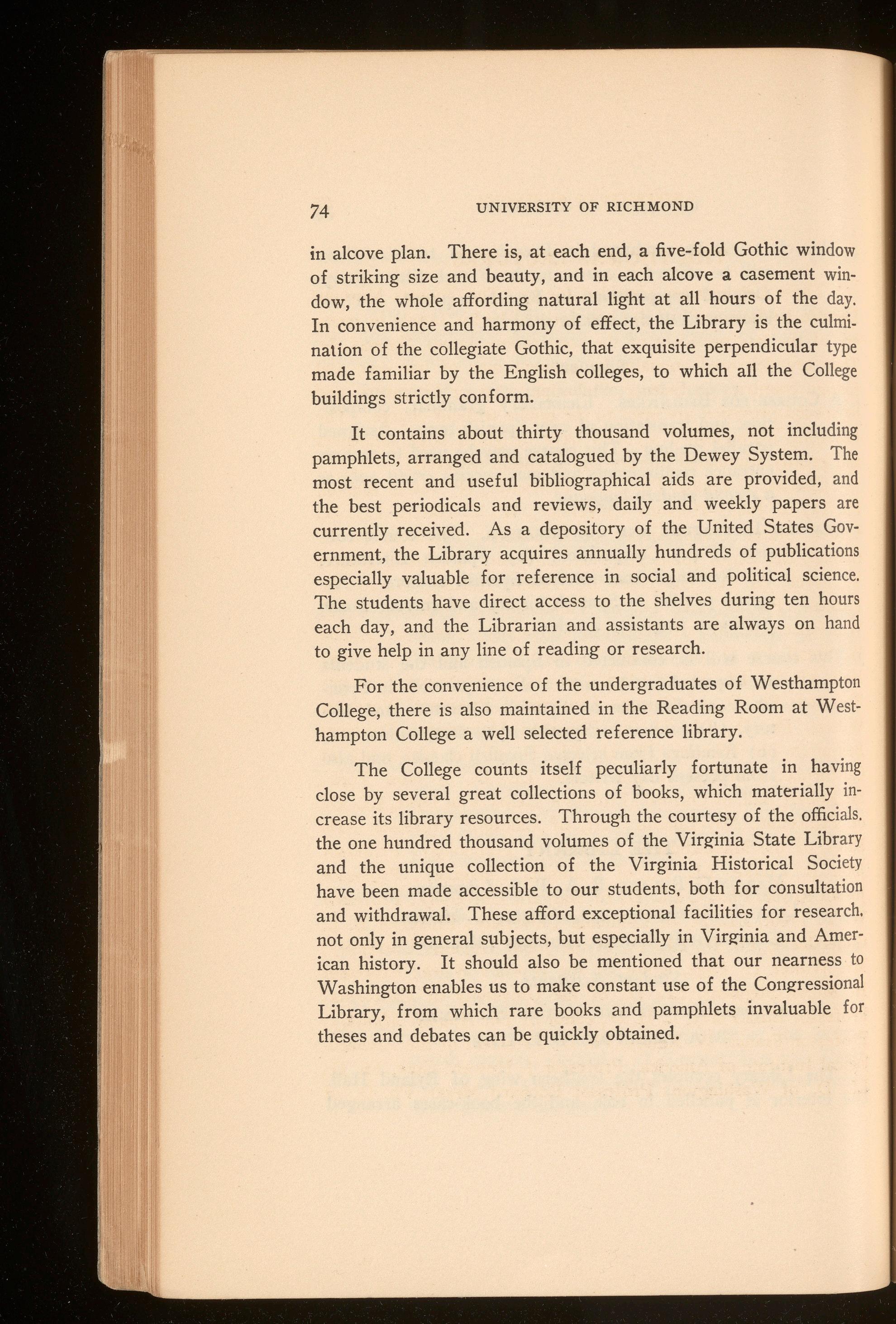
in alcove plan. There is, at each end, a five-fold Gothic window of striking size and beauty, and in each alcove a casement window, the whole affording natural light at all hours of the day. In convenience and harmony of effect, the Library is the culmination of the collegiate Gothic, that exquisite perpendicular type made familiar by the English colleges, to which all the College buildings strictly conform.
It contains about thirty thousand volumes, not including pamphlets, arranged and catalogued by the Dewey System. The most recent and useful bibliographical aids are provided, and the best periodicals and reviews, daily and weekly papers are currently received. As a depository of the United States Government, the Library acquires annually hundreds of publicat ions especially valuable for reference in social and political science. The students have direct access to the shelves during ten hours each day, and the Librarian and assistants are always on hand to give help in any line of reading or research .
For the convenience of the undergraduates of Westhamp ton College, there is also maintained in the Reading Room at W esthampton College a well selected reference library.
The College counts itself peculiarly fortunate in ha ving close by several great collections of books, which materially increase its library resources. Through the courtesy of the officials. the one hundred thousand volumes of the Virginia State Libr ary and the unique collection of the Virginia Historical Society have been made accessible to our students, both for consulta tion and withdrawal. These afford exceptional facilities for resea rch. not only in general subjects, but especially in Virginia and Am erican history . It should also be mentioned that our nearness to Washington enables us to make constant use of the Congressio nal Library, from which rare books and pamphlets invaluable for theses and debates can be quickly obtained.
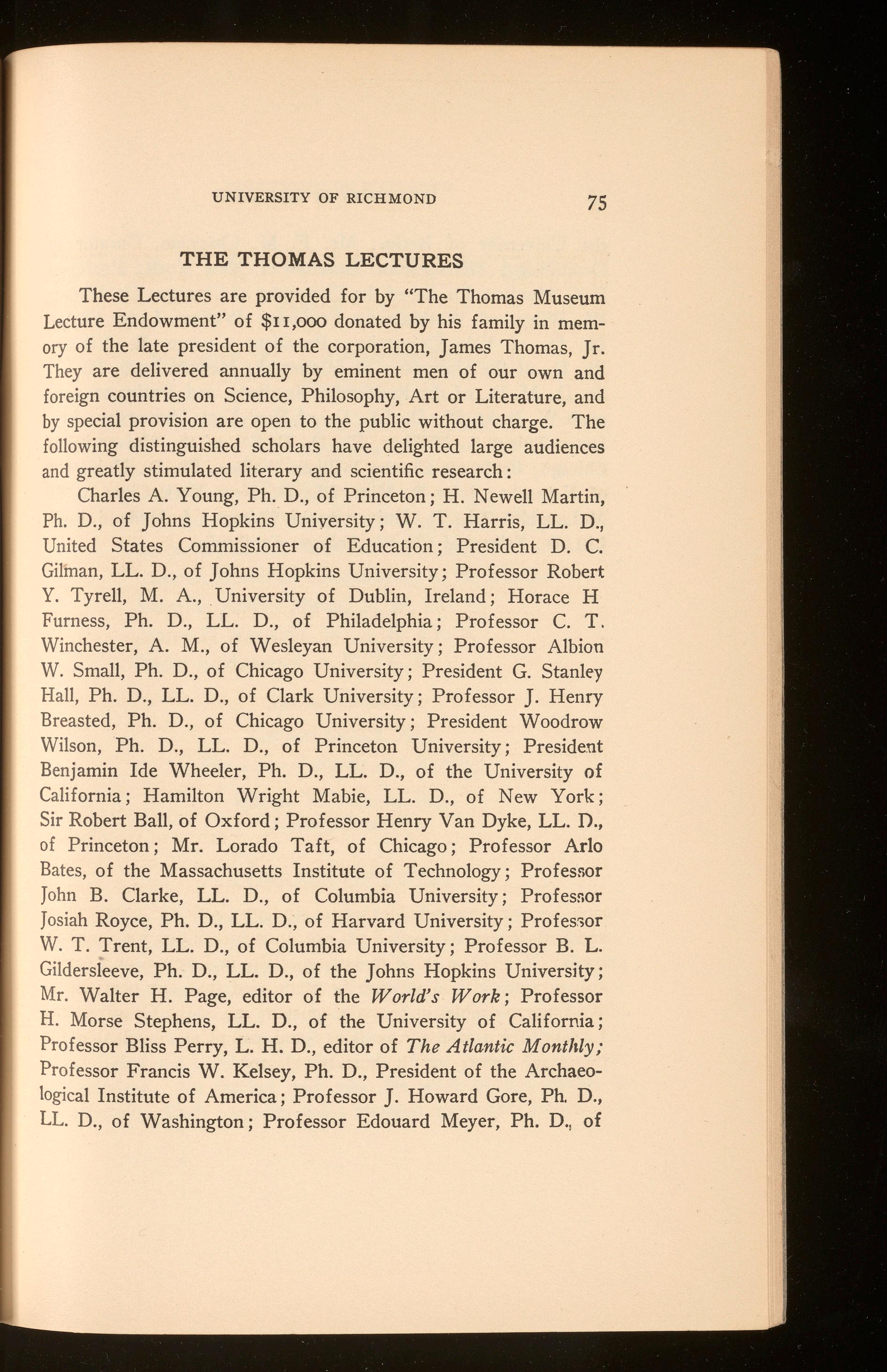
T hese Lectures are provided for by "The Thomas Museum Lecture Endowment" of $u,ooo donated by his family in memory of t he late president of the corporation, James Thomas , Jr. They are delivered annually by eminent men of our own and foreign countries on Science, Philosophy, Art or Literature, and by special provision are open to the public without charge . The following distinguished scholars have delighted large audiences and gr eatly stimulated literary and scientific research: Charles A. Young, Ph. D., of Princeton; H. Newell Martin, Ph. D ., of Johns Hopkins University; W. T. Harris, LL. D., United States Commissioner of Education; President D . C. Gilman , LL. D , of Johns Hopkins University; Professor Robert Y. Ty rell , M. A., .University of Dublin, Ireland; Horace H Furness, Ph. D ., LL. D., of Philadelphia; Professor C. T. Winchester, A. M., of Wesleyan University; Professor Albion W. Small, Ph. D., of Chicago University; President G Stanley Hall, Ph. D., LL. D ., of Clark University; Professor J. Henry Breasted , Ph . D., of Chicago University; President Woodrow Wilson, Ph. D., LL. D ., of Princeton University; President Benjamin Ide Wheeler, Ph. D , LL. D., of the University of California; Hamilton Wright Mabie, LL. D., of New York; Sir Robert Ball, of Oxford; Professor Henry Van Dyke, LL. D., of P rinceton; Mr. Lorado Taft, of Chicago; Professor Arlo Bates, of the Massachusetts Institute of Technology; Profesr.or John B. Clarke, LL. D , of Columbia University; Profesr.or Josiah Royce, Ph. D., LL. D., of Harvard University ; Professor W. T . Trent, LL. D., of Columbia University; Professor B. L . Gildersleeve, Ph. D., LL. D., of the Johns Hopkins University; Mr. Walter H. Page, editor of the World's Work; Professor H. Morse Stephens, LL. D., of the University of California; Profe ssor Bliss Perry, L. H. D. , editor of The Atlantic Monthly; Profes sor Francis W. Kelsey, Ph. D. , President of the Archaeological Institute of America; Professor J. Howard Gore, Ph . D., LL. D ., of Washington; Professor Edouard Meyer, Ph. D., of
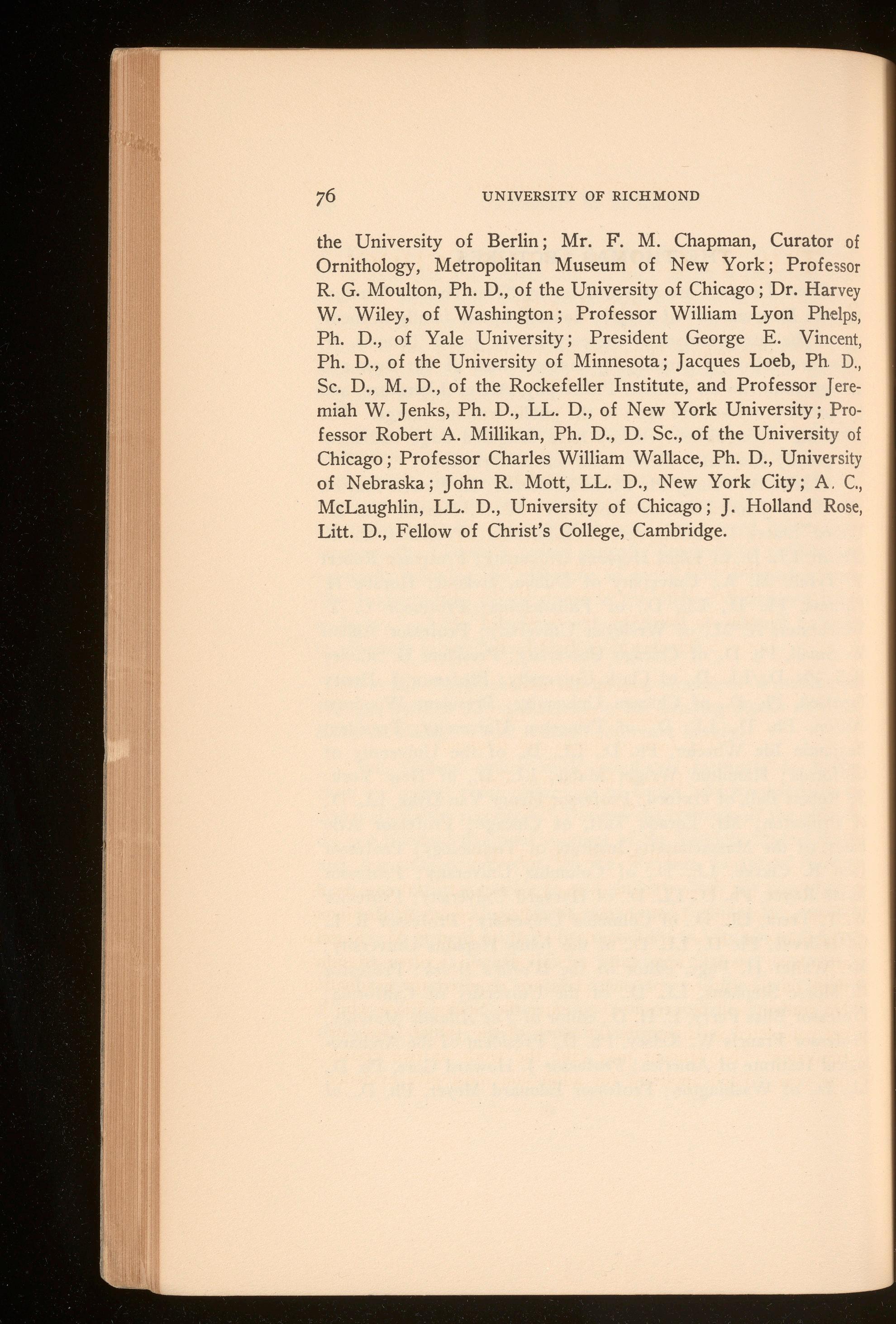
the University of Berlin; Mr. F. M. Chapman, Curato r of Ornithology, Metropolitan Museum of New York; Profe ssor R. G. Moulton, Ph. D., of the University of Chicago; Dr. Ha rvey W. Wiley, of Washington; Professor William Lyon Ph elps, Ph. D., of Yale University; President George E. Vi ncent, Ph. D., of the University of Minnesota; Jacques Loeb, Ph D., Sc. D. , M D., of the Rockefeller Institute, and Professor J eremiah W. Jenks, Ph.D., LL. D., of New York University; Professor Robert A. Millikan , Ph. D , D. Sc., of the Universi ty of Chicago; Professor Charles William Wallace, Ph. D., Unive rsity of Nebraska; John R. Mott, LL. D., New York City; A . C., McLaughlin, LL D., University of Chicago; J. Holland Rose, Litt. D., Fellow of Christ's College, Cambridge.
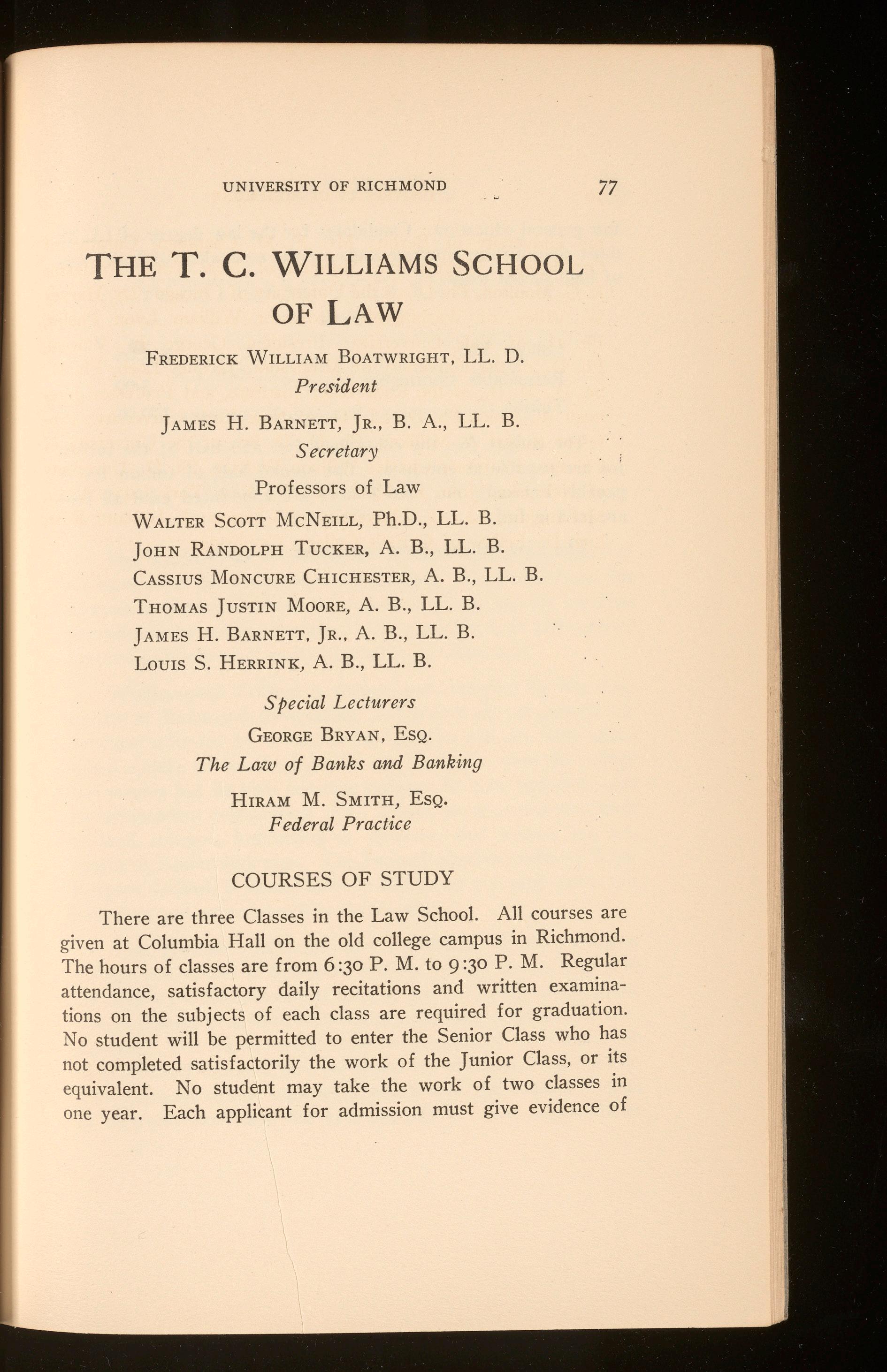
UNIVERSITYOF RICHMOND
FREDERICKWILLIAM BOATWRIGHT,LL. D. President
JAMES H. BARNETT,JR., B. A., LL. B. Secretary
Professors of Law
WALTER ScoTT McNEILL, Ph.D., LL. B.
JOHN RANDOLPH TUCKER, A. B., LL. B.
CASSIUSMONCURECHICHESTER,A. B., LL. B.
THOMAS JUSTIN MOORE,A. B., LL. B.
JAMES H. BARNETT,JR., A. B., LL. B.
Lours S. HERRINK, A. B., LL. B.
Special Lecturers
GEORGEBRYAN' ESQ.
The Law of Banks and Banking
HIRAM M. SMITH, ESQ. Federal Practice
There are three Classes in the Law School. All courses are given at Columbia Hall on the old college campus in Richmond. The hours of classes are from 6 :30 P. M. to 9 :30 P. M. Regular attendance, satisfactory daily recitations and written examinations on the subjects of each class are required for graduation. No student will be permitted to enter the Senior Class who has not completed satisfactorily the work of the Junior Class, or its equivalent. No student may take the work of two classes in one year. Each applicant for admission must give evidence of
fair general education. Candidates for the law degree of LL . B. must show fifteen entrance units, or the equivalent of four years of high school work.
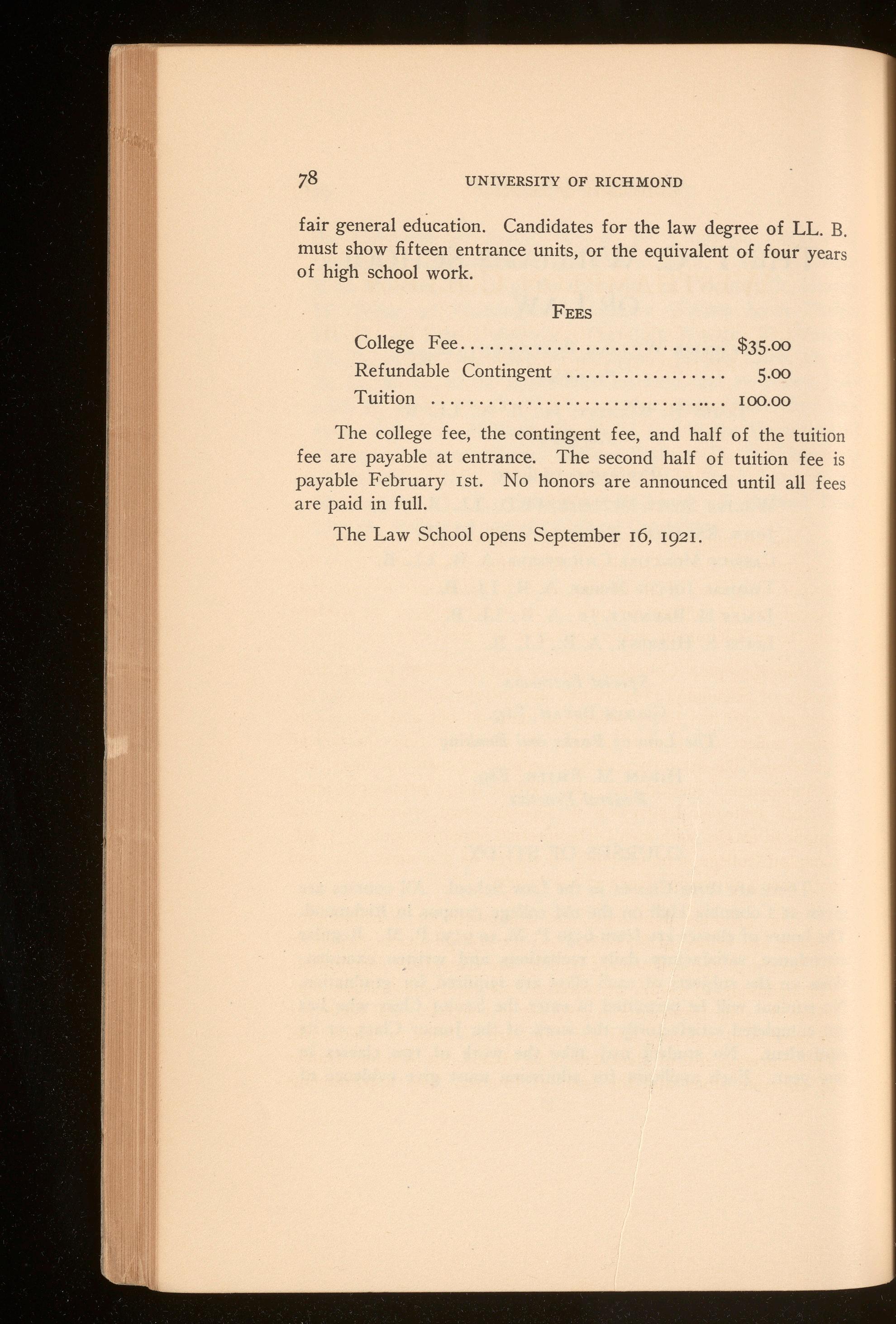
5.00
100.00
The college fee, the contingent fee, and half of the tuit ion fee are payable at entrance. The second half of tuition fee is payable February 1st. No honors are announced until all f ees a re paid in full.
The Law School opens September 16, 1921.
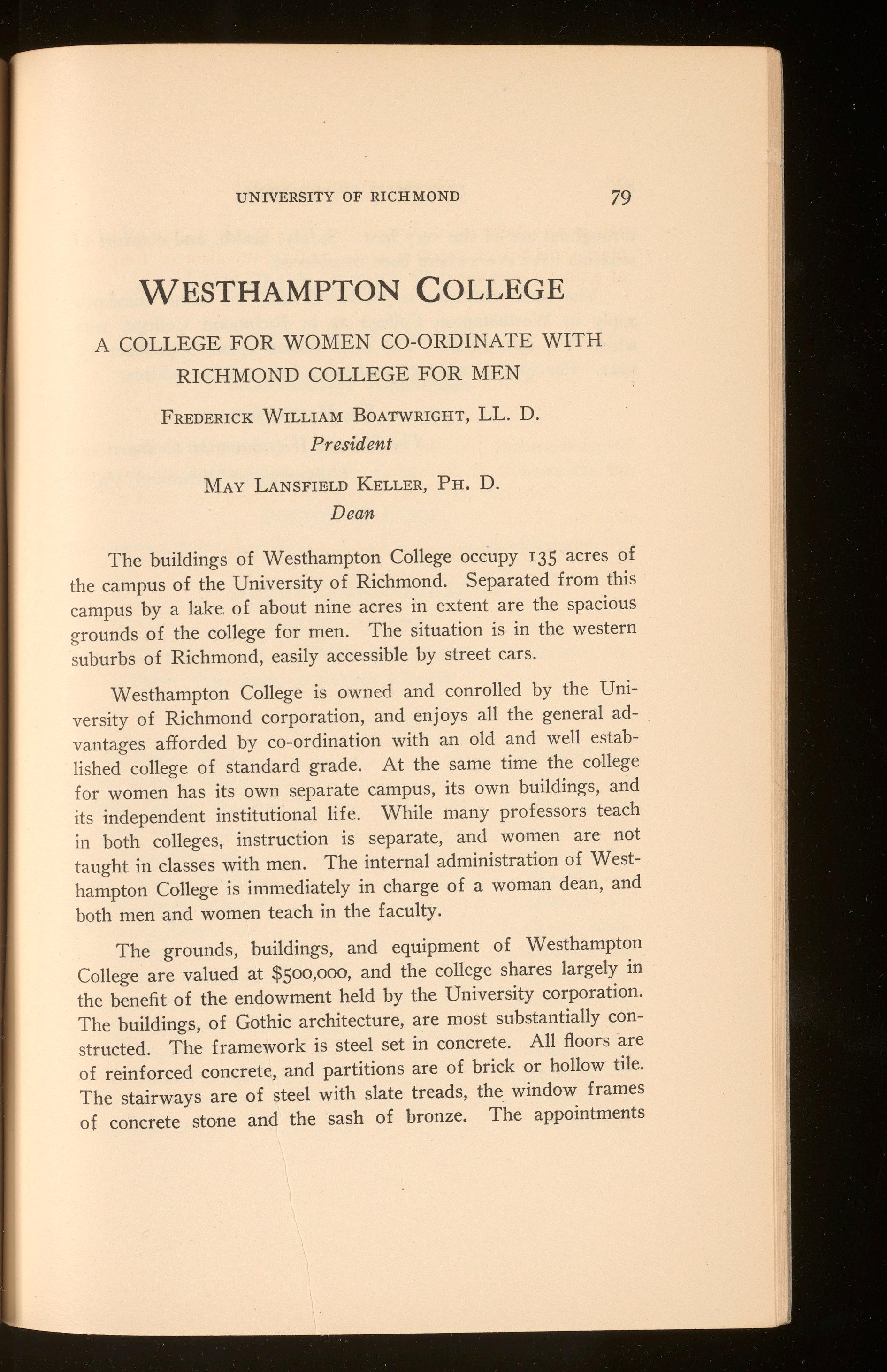
UNIVERSITYOF RICHMOND
A COLLEGE FOR WOMEN CO-ORDINATE WITH RICHMOND COLLEGE FOR MEN
FREDERICKWILLIAM BOATWRIGHT,LL. D. President
MAY LANSFIELDKELLER,PH. D. Dean
The buildings of Westhampton College occupy 135 acres of the campus of the University of Richmond. Separated from this campus by a lake of about nine acres in extent are the spacious grounds of the college for men. The situation is in the western suburbs of Richmond, easily accessible by street cars.
Westhampton College is owned and conrolled by the University of Richmond corporation, and enjoys all the general advantages afforded by co-ordination with an old and well established college of standard grade. At the same time the college for women has its own separate campus, its own buildings, and its independent institutional life. While many professors teach in both colleges, instruction is separate, and women are not taught in classes with men. The internal administration of Westhampton College is immediately in charge of a woman dean, and both men and women teach in the faculty.
The grounds, buildings, and equipment of Westhampton College are valued at $500,000, and the college shares largely in the benefit of the endowment held by the University corporation. The buildings, of Gothic architecture, are most substantially constructed. The framework is steel set in concrete. All floors are of reinforced concrete, and partitions are of brick or hollow tile. The stairways are of steel with slate treads, the _ window frames of concrete stone and the sash of bronze. The appointments
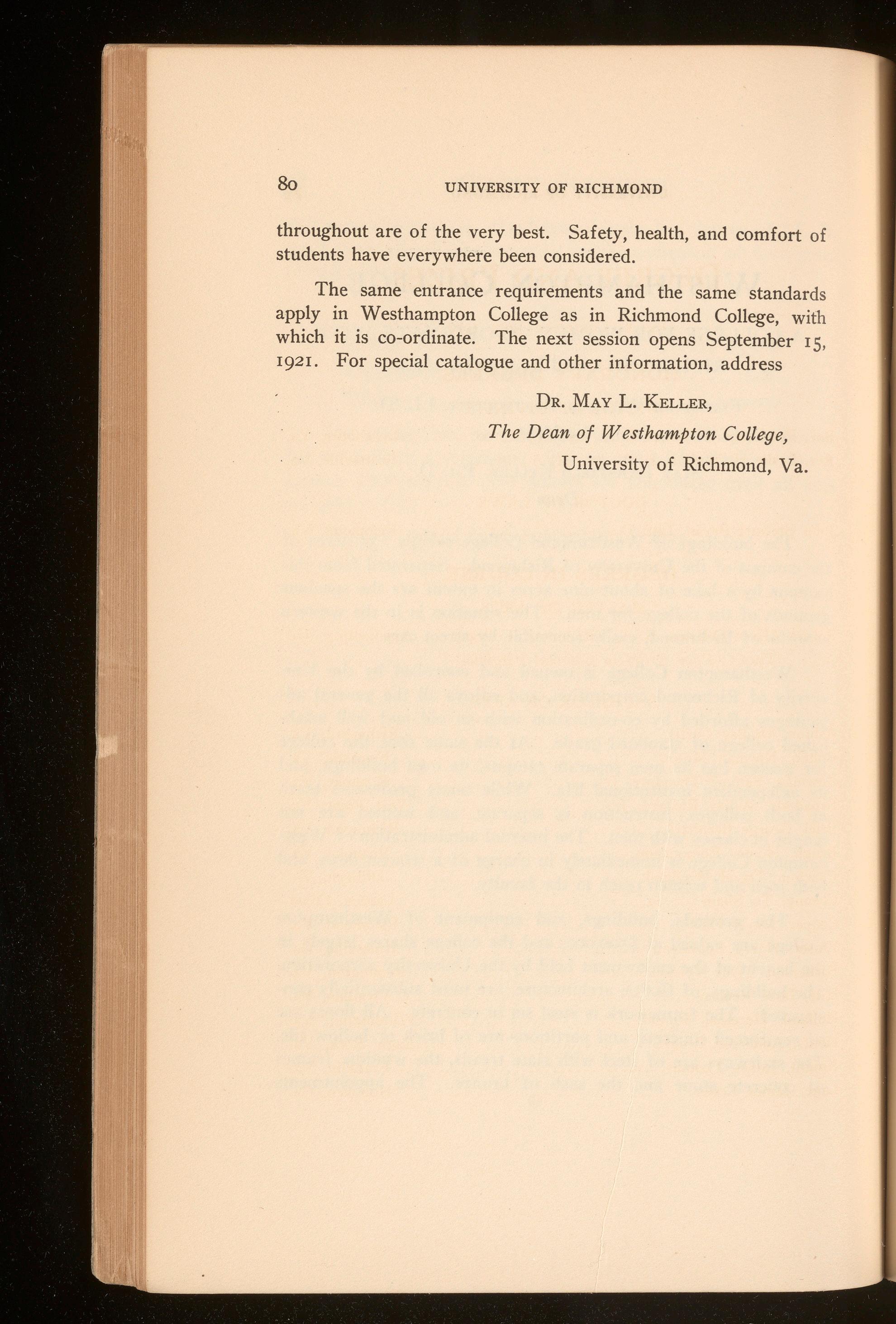
throughout are of the very best. Safety, health, and comfort of students have everywhere been considered.
The same entrance requirements and the same standards apply in Westhampton College as in Richmond College, with which it is co-ordinate. The next session opens September 15 , 1921. For special catalogue and other information, address
DR. MAY L. KELLER, The Dean of Westhampton Callege, University of Richmond, Va.
UNIVERSITY OF RICHMOND
Degrees Conferred June, 1920
HONORARY DEGREES
DOCTOR OF DIVINITY
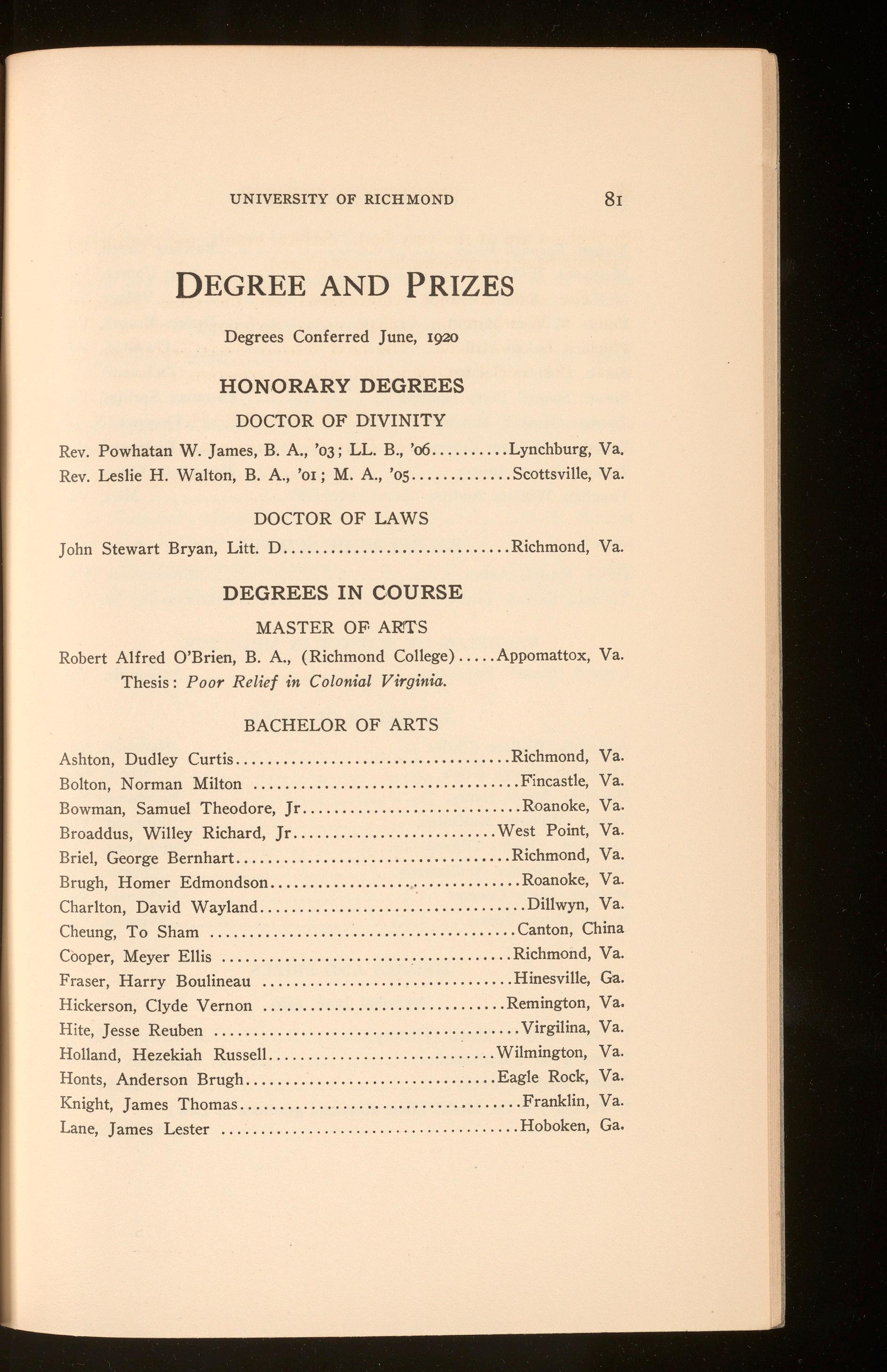
Sr
Rev. Powhatan W. James, B. A., '03; LL. B., 'o6 .......... Lynchburg, Va.
Rev. Leslie H. Walton, B. A., '01; M. A., '05 ............. Scottsville, Va.
DOCTOR OF LAWS
John Stewart Bryan, Litt. D ............................. Richmond, Va.
DEGREES IN COURSE
MASTER OF AR!TS
Robert Alfred O'Brien, B. A., (Richmond College) ..... Appomattox, Va.
Thesis: Poor Relief in Colonial Virginia.
BACHELOR OF ARTS
Ashton, Dudley Curtis . .................................. Richmond, Va.
Bolton, Norman Milton .................................. Fincastle, Va.
Bowman, Samuel Theodore, Jr ............................ Roanoke, Va. Broaddus, Willey Richard, Jr .. ...................... West Point, Va.
Briel, George Bernhart. .................................. Richmond, Va. Brugh, Homer Edmondson ................................ Roanoke, Va.
Charlton, David Wayland .................................. Dillwyn, Va. Cheung, To Sham ....................................... Canton, China
Cooper, Meyer Ellis ........................ .............. Richmond, Va.
Fraser, Harry Boulineau ................................ Hinesville, Ga.
Hickerson, Clyde Vernon ............................... Remington, Va, Hite, Jesse Reuben ....................................... Virgilina, Va.
Holland, Hezekiah Russell ........................ ·.... Wilmington, Va.
Honts, Anderson Brugh ................................ Eagle Rock, Va.
Knight, James Thomas .................................... Franklin, Va.
Lane, James Lester ............ ................. Hoboken, Ga.
Mahon, Bernard Webb .........•..•....•........... Bowling Green, Va. Matthews, William Frederick .......................... New Church, Va. McKenney, Robert Weston ..........................•....... Village, Va. Pettus, William Merritt .....................••..... Drakes Branch, Va. Phippins, Calvin Hall .................................... Owenton, Va. Smith, Cothran Godden ................................. Richmond, Va. Spratt, Samuel Peery Godfrey .................... Paeonian Springs, Va. Thomas, Haskell Moisson .............................. Florence, S. C. Trainham, William Emory ............................... Richmond, Va. Tucker, Samuel Buster ........................... Republican Grove, Va. Vaughan, William Andrew .................................. . Mica, Va.
BACHELOR OF SCIENCE
Hibbs, Russell Au bra ................................ Birmingham, Ala. Thomas, Carroll Truitt. .......................... Kearneysville, W. Va.
BACHELOR OF SCIENCE IN MEDICINE
Luttrell, Homer Browning .............................. Amissville, Va.
BACHELOR OF LAWS
Anderson, Wallace Castles ............................... Hampton, Va. Chumbley, George Lewis ................................... Athens, Ga. Donohue, James Henry, Jr .............................. Richmond, Va. Phipps, William McKinley .............................. Clintwood, Va. Sandford, Charles D' Arey .............................. Petersburg, Va. Shepherd, Gordon Williamson .............................. Chester, Va. Webster, Clyde Cannon ................................. Richmond, Va. Wood, Claude Reams ...................................... Wingina, Va.
Awarded June, 1920
J. Taylor Ellyson Medal (History) .................... R. Alfred O'Brien
Crump Prize (Mathematics) ..........................
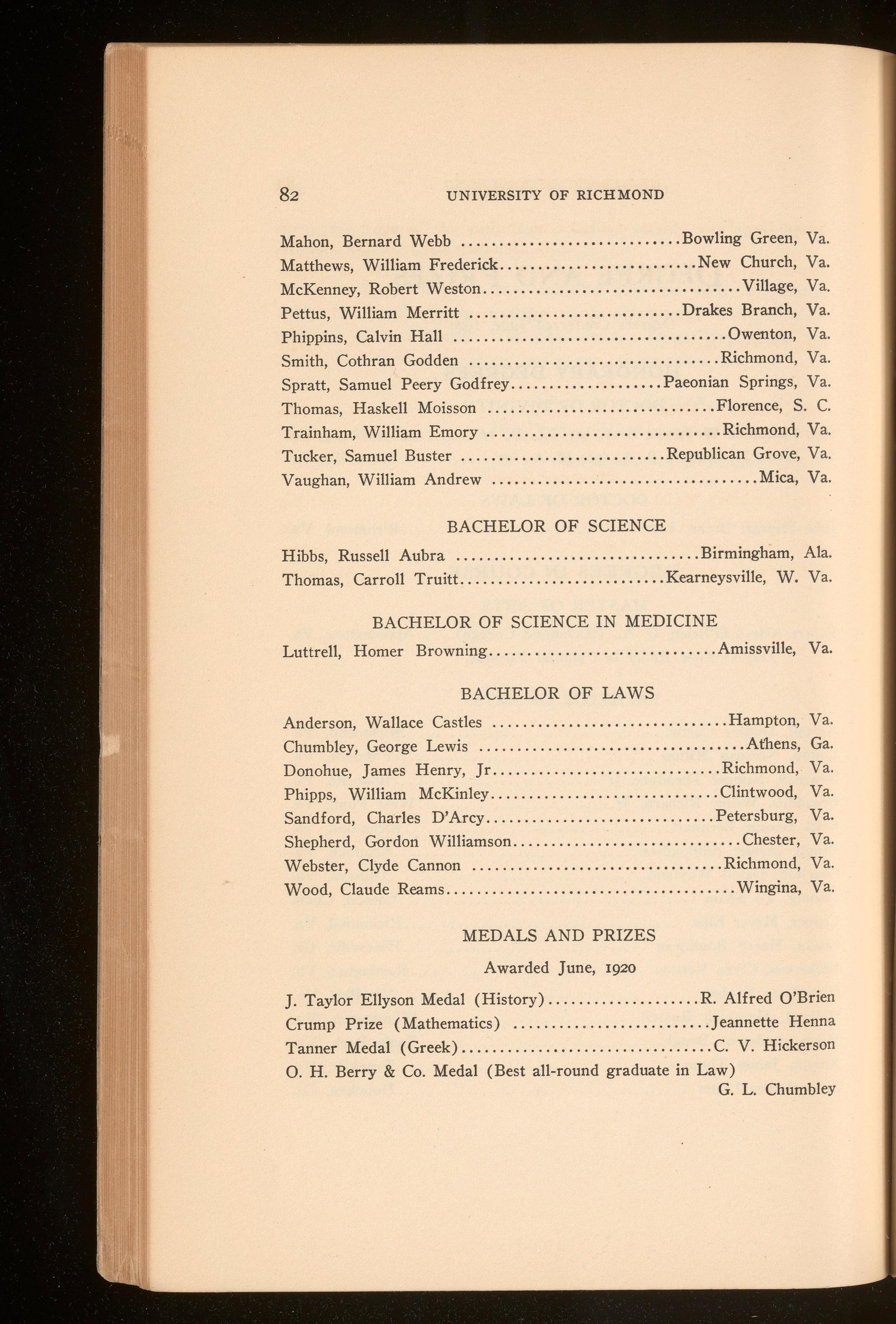
Jeannette Henna
Tanner Medal (Greek) ................................. C. V. Hickerson
0. H. Berry & Co. Medal (Best all-round graduate in Law)
G. L. Chumbley
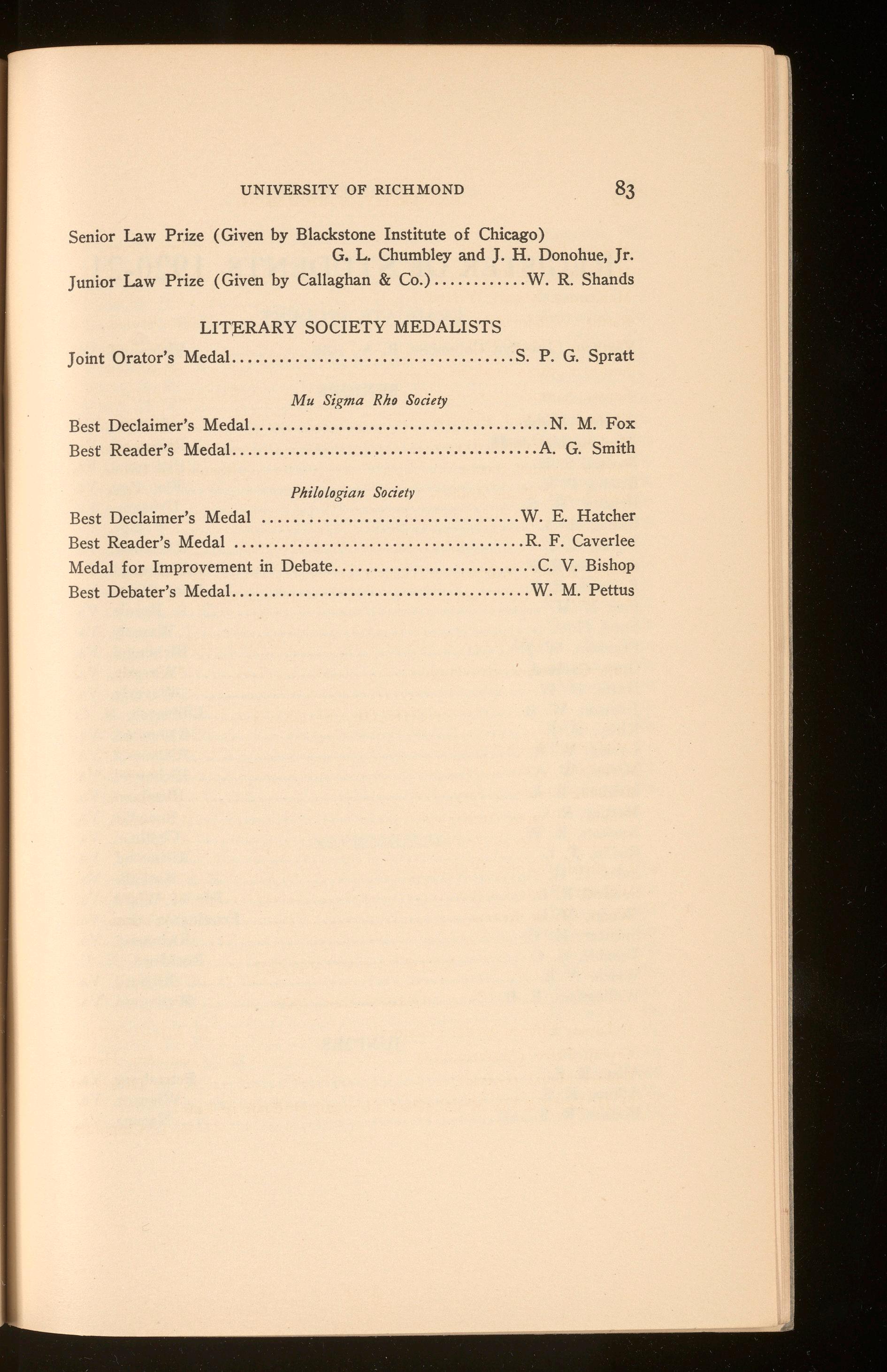
Senior Law Prize (Given by Blackstone Institute of Chicago) G. L. Chumbley and J. H. Donohue, Jr.
Junior Law Prize (Given by Callaghan & Co.) ............ W. R. Shands
Joint Orator's Medal.. ................................ S. P. G. Spratt
Mu Sigma Rho Society
Best Declaimer's Medal. ............................. . . N. M. Fox
Besf Reader's Medal. ...................................... A. G. Smith
Philologian Society
Best Declaimer's Medal ........ W. E. Hatcher
Best Reader's Medal ..................................... R. F. Caverlee Medal for Improvement in Debate ........................ .. C. V. Bishop
Best Debater's Medal. ..................................... W. M. Pettus
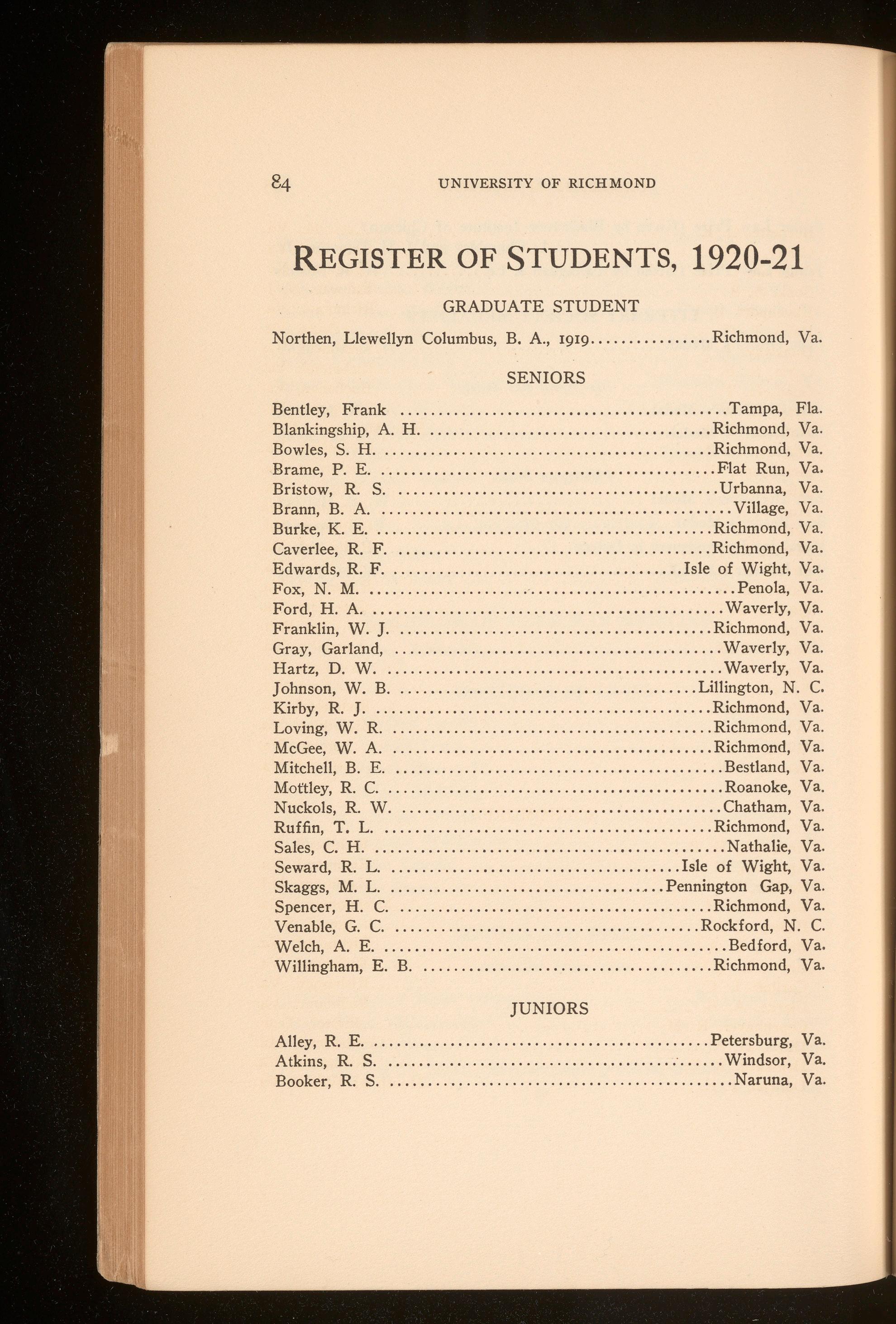
UNIVERSITY OF RICHMOND
Northen, Llewellyn Columbus, B. A., 1919 Richmond, Va.
Bentley, Frank Tampa, Fla. Blankingship, A. H ...................................... Richmond, Va. Bowles, S. H Richmond, Va. Brame, P. E ............................................. Flat Run, Va. Bristow, R. S Urbanna, Va. Brann, B. A Village, Va. Burke, K. E ............................................. Richmond, Va. Caverlee, R. F .......................................... Richmond, Va. Edwards, R. F ....................................... Isle of Wight, Va. Fox, N. M. ................................................ Penola, Va. Ford, H. A ............................................... Waverly, Va. Franklin, W. J .......................................... Richmond, Va. Gray, Garland, ........................................... Waverly, Va. Hartz, D. W ............................................. Waverly, Va. Johnson, W. B........................................ Lillington, N. C. Kirby, R. J ............................................. Richmond, Va. Loving, W. R ........................................... Richmond, Va. McGee, W. A ........................................... Richmond, Va. Mitchell, B. E. . .......................................... Bestland, Va. Mottley, R. C............................................. Roanoke, Va. Nuckols, R. W ........................................... Chatham, Va. Ruffin, T. L. ........................................... Richmond, Va. Sales, C. H ............................................... Nathalie, Va. Seward, R. L. ...................................... Isle of Wight, Va. Skaggs, M. L. Pennington Gap, Va. Spencer, H. C.......................................... Richmond, Va. Venable, G. C......................................... Rockford, N. C. Welch, A. E .............................................. Bedford, Va. Willingham, E. B Richmond, Va.
Alley, R. E ............................................. Petersburg, Va. Atkins, R. S ............................................. Windsor, Va. Booker, R. S .............................................. Naruna, Va.

Burnette, 0. K ...........................................
Leesville, Va. Carter, C. G............................................. Gate City, Va. Coleman, C. H. . ......................................... Paducah, Ky.
Cook, A. B. . ............................................ Rahway, N. J. Davenport, B. U ........................................ Richmond, Va. Davis, P. H ................................................. Paces, Va. Dunaway, T. S.......................................... Smithfield, Va. Garst, R. E ......................... .. .................. Richmond, Va.
Good, H. T ............................................. Buchanan, Va. Gray, E. W ............................................ Richmond, Va. Hatcher, W. E. .................................. Blue Mountain, Miss. Haynes, W. T .......................................... Richmond, Va. Henderson, W. C......................................... Schuyler, Va.
Hite, 0. L ............................................... Virgilina, Va. Hui, C. Y. . ............................................. Canton, China
Leek, C. F .............................................. Baltimore, Md. Marsh, R. T. . .......................................... Richmond, Va.
Orrell, S. R ................................................. Hurt, Va. Pafterson, G. C. ........................................ Richmond, Va. Quillen, B. T ............................................ Gate City, Va.
Rudd, A. B. ....................................... Mexico City, Mex.
Sadler, R. S ............................................. Laneview, Va.
Smith, A. G.............................................. Altavista, Va.
Stevens, G. D ................................................ Nace, Va.
Walden, R. C. .......................................... Richmond, Va. White, W. L. .......................................... Midlothian, Va. Willis, J. H ............................................... Lignum, Va.
Woodfin, W. C. .......................................... Ashland, Va.
Anderson, H. B. ........................................ Richmond, Va. Apperson, N. J......................................... Richmond, Va. Beehler, W. N .......................................... Baltimore, Md. Bennett, S. H. . ...................................... Montgomery, Ala. Bishop, C. V .............................................. Inman, S. C. Bowen, R. A ........................................... Richmond, Va. Bryce, L. W ............................................ Richmond, Va. Carlton, L. C........................................... Richmond, Va. Clarke, A. B. .......................................... Richmond, Va.
Copenhaver, R. M. ..................................... Bristol, Tenn. Davis, H. H. . ........................................ Cumberland, Md.
Drinkard, R. D ......................................... Richmond, Va. Duncan, T. E ....................................
Mouth of Wilson, Va.
86
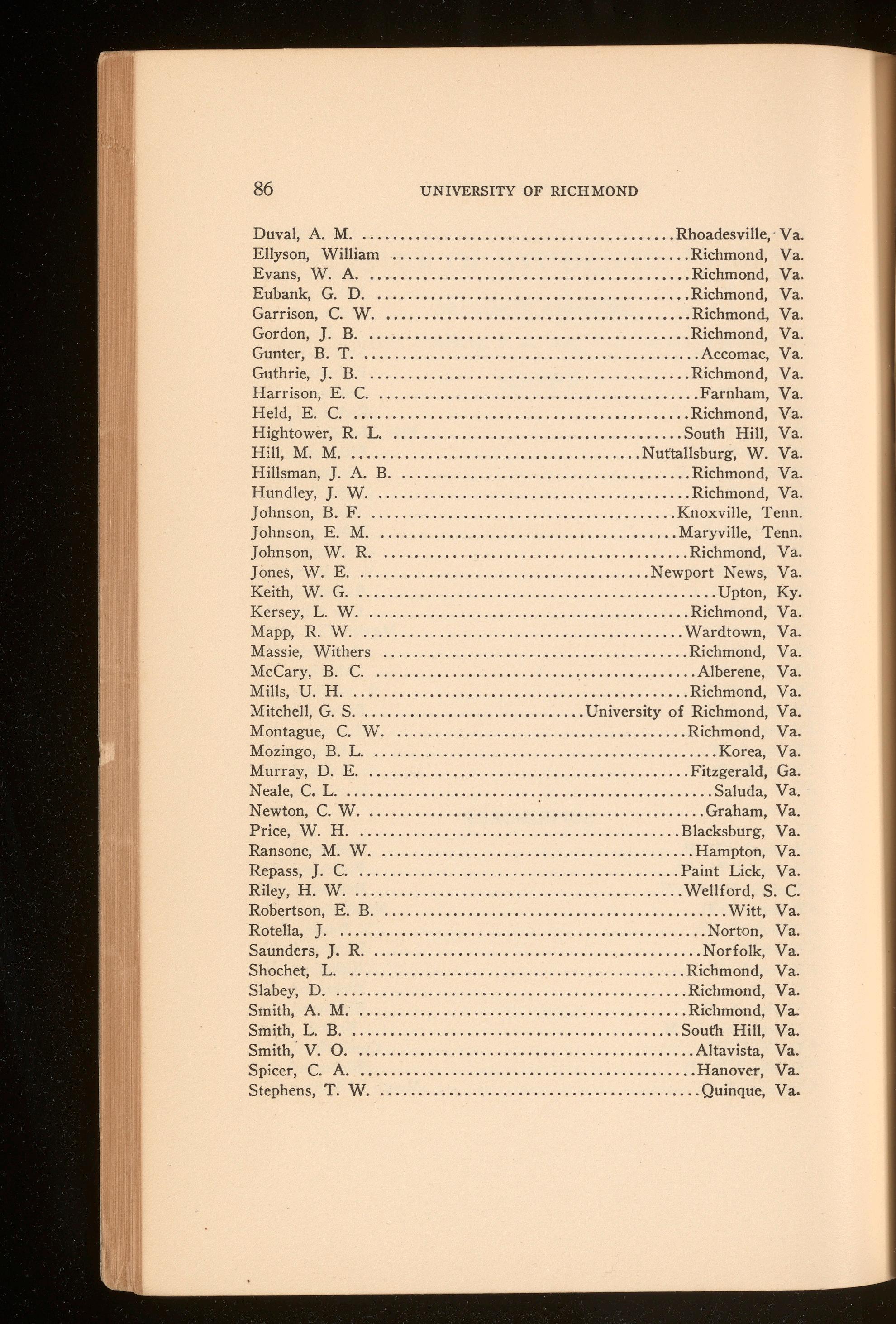
Duval, A. M. . ......................•...•..........•.. Rhoadesville, · Va.
Ellyson, William ......................•........•..•.... Richmond, Va.
Evans, W. A ...•....................................... Richmond, Va.
Eubank, G. D .......................................... Richmond, Va.
Garrison, C. W .......•...•.........................•... Richmond, Va.
Gordon, J. B .......•................................... Richmond, Va.
Gunter, B. T ............................................. Accomac, Va.
Guthrie, J. B ........................................... Richmond, Va.
Harrison, E. C...................•...........•........... Farnham, Va.
Held, E. C............................................. Richmond, Va.
Hightower, R. L. . ........................•............ South Hill, Va.
Hill, M. M .......................................
Nut'tallsburg, W. Va.
Hillsman, J. A. B ....................................... Richmond, Va.
Hundley, J. W .......................................... Richmond, Va.
Johnson, B. F ......................................... Knoxville, Tenn.
Johnson, E. M ........................................ Maryville, Tenn.
Johnson, W. R. ........................................ Richmond, Va.
Jones, W. E ............. ........................ Newport News, Va.
Keith, W. G................................................ Upton, Ky.
Kersey, L. W ........................................... Richmond, Va.
Mapp, R. W ........................................... Wardtown, Va.
Massie, Withers ........................................ Richmond, Va.
McCary, B. C. .......................................... Alberene, Va.
Mills, U. H ............................................. Richmond, Va.
Mitchell, G. S University of Richmond, Va.
Montague, C. W Richmond, Va.
Mozingo, B. L. . ............................................ Korea, Va.
Murray, D. E. .......................................... Fitzgerald, Ga.
Neale, C. L ................................................. Saluda, Va.
Newton, C. W ....................... : .•................... Graham, Va.
Price, W. H Blacksburg, Va.
Ransone, M. W Hampton, Va.
Repass, J. C. .......................................... Paint Lick, Va.
Riley, H. W ............................................ Wellford, S. C.
Robertson, E. B Witt, Va.
Rotella, J Norton, Va.
Saunders, J. R. ........................................... Norfolk, Va.
Shochet, L. . ...................................... .... Richmond, Va.
Slabey, D ............................................... Richmond, Va.
Smith, A. M ............................................ Richmond, Va.
Smith, L. B. . .......................................... South Hill, Va.
Smith: V. 0 ............................................. Altavista, Va.
Spicer, C. A ...•.............................•........... Hanover, Va.
Stephens, T. W Quinque, Va.
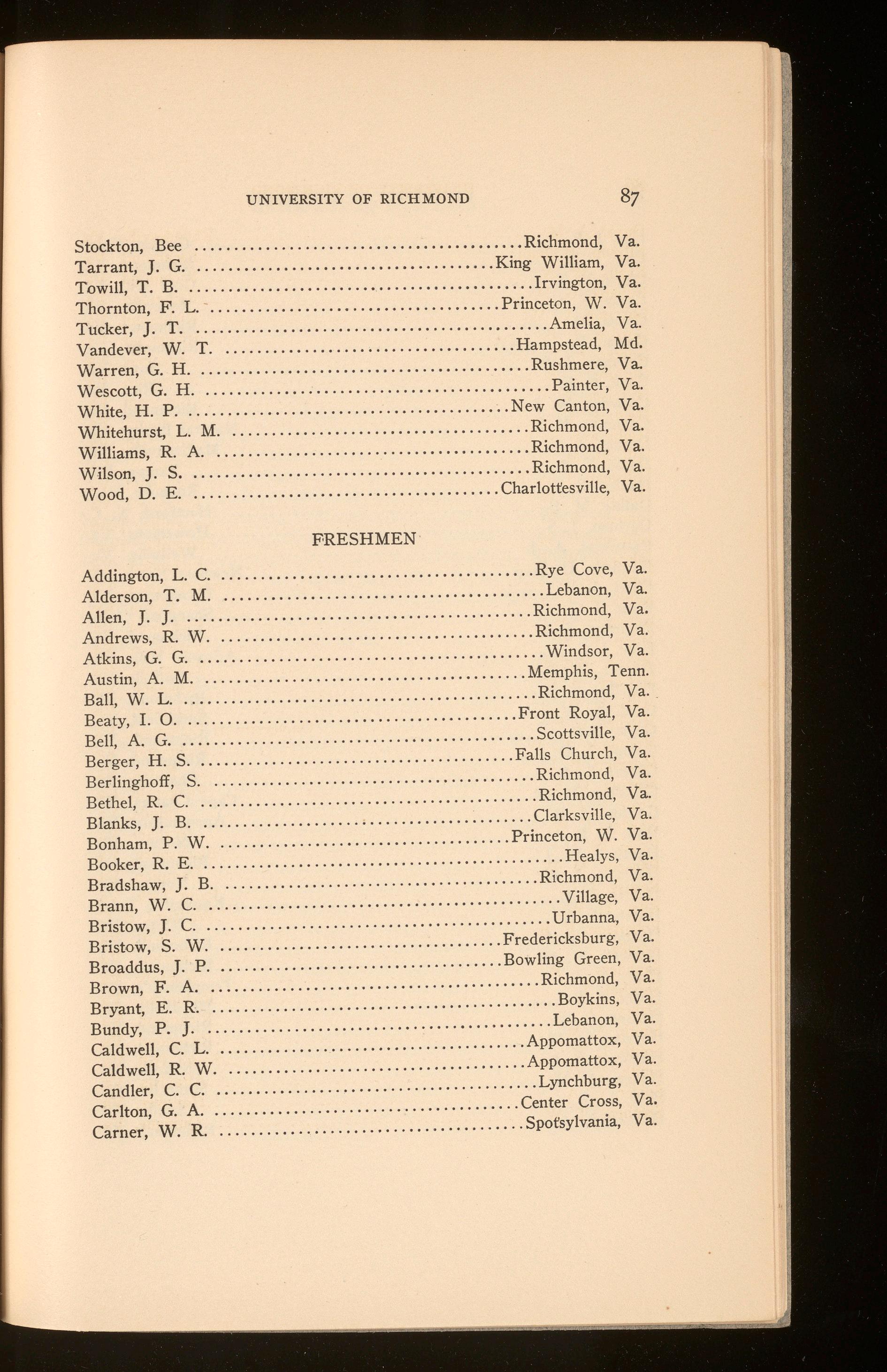
Stockton, Bee .......................................... Richmond, Va. Tarrant, J. G....................................... King William, Va. Towill, T. B............................................. Irvington, Va. Thornton, F. L ...................................... Princeton, W. Va. Tucker, J. T .............................................. Amelia, Va. Vandever, W. T ...................................... Hampstead, Md. Warren, G. H ........................................... Rushmere, Va. Wescott, G. H ............................................. Painter, Va. White, H. P .......................................... New Canton, Va. Whitehurst, L. M. . ..................................... Richmond, Va. Williams, R. A ......................................... Richmond, Va. Wilson, J. S ............................................ Richmond, Va. Wood, D. E ........................................
Addington, L. C.........................................
Charlott'esville, Va.
Rye Cove, Va. Alderson, T. M .......................................... Lebanon, Va. Allen, J. J ............................................. Richmond, Va. Andrews, R. W ......................................... Richmond, Va. Atkins, G. G............................................. Windsor, Va. Austin, A. M. . ........................................ Memphis, Tenn. Ball, W. L .............................................. Richmond, Va. Beaty, I. 0 ........................................... Front Royal, Va. Bell, A. G.............................................. Scottsville, Va.
Berger, H. S ......................................... Falls Church, Va.
Berlinghoff, S. . ........................................ Richmond, Va.
Bethel, R. C. ........................................... Richmond, Va.
Blanks, J. B. . ......................................... Clarksville, Va. Bonham, P. W ...................................... Princeton, W. Va.
Booker, R. E ............................................... Healys, Va. Bradshaw, J. B ......................................... Richmond, Va. Brann, W. C. . ............................................ Village, Va. Bristow, J. C............................................. Urbanna, Va.
Bristow, S. W ..................................... Fredericksburg, Va. Broaddus, J. P ..................................... Bowling Green, Va.
Brown, F. A ........................................... Richmond, Va.
Bryant, E. R ............................................. Boykins, Va. Bundy, P. J............................................. Lebanon, Va.
Caldwell, C. L. ....................................... Appomattox, Va.
Caldwell, R. W ....................................... Appomattox, Va.
Candler, C. C. ......................................... Lynchburg, Va.
Carlton, G. A. ....................................... Center Cross, Va. Carner, W. R. ....................................... Spot'sylvania, Va.
88
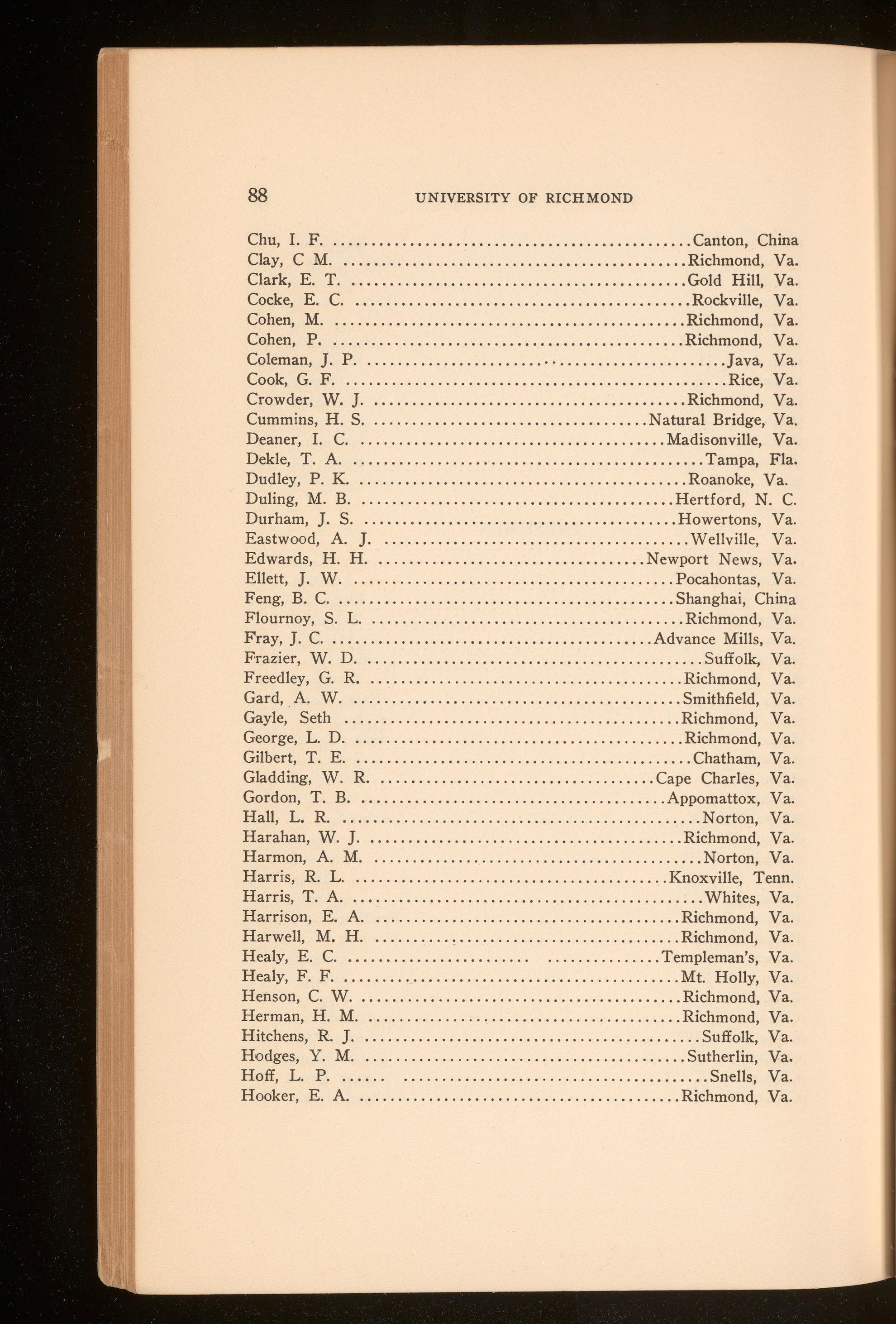
Chu, I. F. . ..........................•...................
Canton, China
Clay, C M .............................................. Richmond, Va.
Clark, E. T Gold Hill, Va.
Cocke, E. C. . ........................................... Rockville, Va.
Cohen, M. Richmond, Va.
Cohen, P ............................................... Richmond, Va.
Coleman, J. P ................................................ Java, Va.
Cook, G. F ................................................... Rice, Va.
Crowder, W. J Richmond, Va.
Cummins, H. S ..................................... Natural Bridge, Va.
Deaner, I. C Madisonville, Va.
Dekle, T. A. . ............................................. Tampa, Fla.
Dudley, P. K ............................................ Roanoke, Va.
Duling, M. B .......................................... Hertford, N. C. Durham, J. S .......................................... Howertons, Va.
Eastwood, A. J ......................................... Wellville, Va.
Edwards, H. H. . .................................. Newport News, Va.
Ellett, J. W. . ......................................... Pocahontas, Va.
Feng, B. C. ............................................ Shanghai, China
Flournoy, S. L .......................................... Richmond, Va. Fray, J. C........................................... Advance Mills, Va.
Frazier, W. D ............................................. Suffolk, Va.
Freedley, G. R. ......................................... Richmond, Va.
Gard, A. W. . .......................................... Smithfield, Va.
Gayle, Seth ............................................ Richmond, Va.
George, L. D ............................................ Richmond, Va.
Gilbert, T. E Chatham, Va.
Gladding, W. R. .................................... Cape Charles, Va.
Gordon, T. B. ........................................ Appomattox, Va.
Hall, L. R. Norton, Va.
Harahan, W. J. ......................................... Richmond, Va.
Harmon, A. M ............................................ Norton, Va.
Harris, R. L. . ........................................ Knoxville, Tenn.
Harris, T. A ............................................... Whites, Va.
Harrison, E. A. Richmond, Va.
Harwell, M. H. . ......... , Richmond, Va.
Healy, E. C. . . . . . . Templeman's, Va.
Healy, F. F ............................................. Mt. Holly, Va.
Henson, C. W Richmond, Va.
Herman, H. M .......................................... Richmond, Va.
Hitchens, R. J. ............................................ Suffolk, Va.
Hodges, Y. M ........................................... Sutherlin, Va.
Hoff, L. P. . . . . . . . ....................................... Snells, Va.
Hooker, E. A. .......................................... Richmond, Va.
Hutchinson, H. R ....................................... Richmond, Va.
Isenhour, F. S. ........................................ Concord, N. C.
Jacobs, L. L. .......................................... Richmond, Va.
Jehne, T. R ................... ·............................ Ashland, Va.
Jeffreys, E. G......................................... Chase City, Va.
Jester, P. N ....................................... Greenwood, S. C.
Jeter, G. R ................................................. Penola, Va.
Johnson, H. S ...................... .................... Hylas, Va.
Johnson, S. W . ............................................ Suffolk, Va.
Kay, F. S ......... ........... ................................ Alps, Va.
Keefe, W R .............................................. Chatham, Va.
Klevesahl, A. A ......................................... Richmond, Va.
Lecky, J. D ............................................. Richmond, Va.
Lewis, R. E ............................................. Hampton, Va.
Lush, L. C...................................... ......... Richmond, Va.
Lutz, J. M .............................................. Richmond, Va.
Lynch, D. P. ....................................... Bridgeport', Conn.
Mahaney, W. L. .................................... Clifton Forge, Va.
Mann, R. L . ......... ............ ................. Richmond, Va.
McCall, M. H .............................•.............. Tazewell, Va.
McCastor, J. T ......................................... Richmond, Va.
McDaniel, P. B ......................................... Richmond, Va.
McNeill, W. A ......................................... Lynchburg, Va.
Miller, C. W ............................................ Hopewell, Va.
Miller, F. S ......................................... Harrisonburg, Va.
Miller, J. H .... ......................................
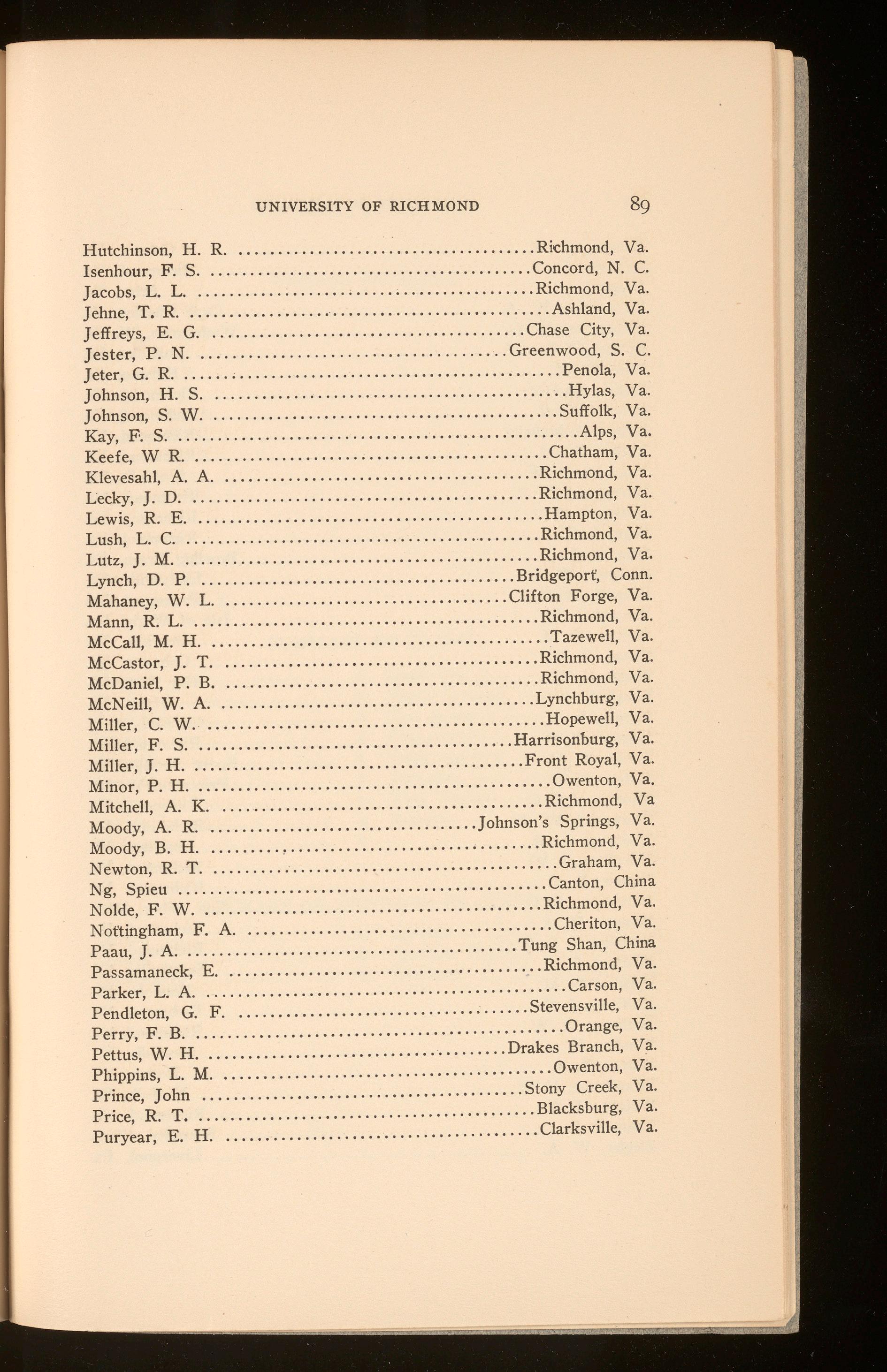
Front Royal, Va.
Minor, P. H .............................................. Owenton, Va.
Mitchell, A. K .......................................... Richmond, Va
Moody, A. R. .................................. Johnson's Springs, Va.
Moody, B. H ...... , ................................ Richmond, Va.
Newton, R. T ............................................. Graham, Va.
Ng, Spieu ............................................... Canton, China
Nolde, F. W ............................................ Richmond, Va.
Noftingham, F. A ........................................ Cheriton, Va.
Paau, J. A. . ......................................... Tung Shan, China
Passamaneck, E .............•................•.......... Richmond, Va.
Parker, L. A ............................................... Carson, Va.
Pendleton, G. F. . ...........•........................ Stevensville, Va.
Perry, F. B ..................................•............. Orange, Va.
Pettus, W. H ....................................... Drakes Branch, Va.
Phippins, L. M ........................................... Owenton, Va.
Prince, John .........................................
Stony Creek, Va.
Price, R. T •........................................... Blacksburg, Va.
Puryear, E. H ......................................... Clarksville, Va.
90
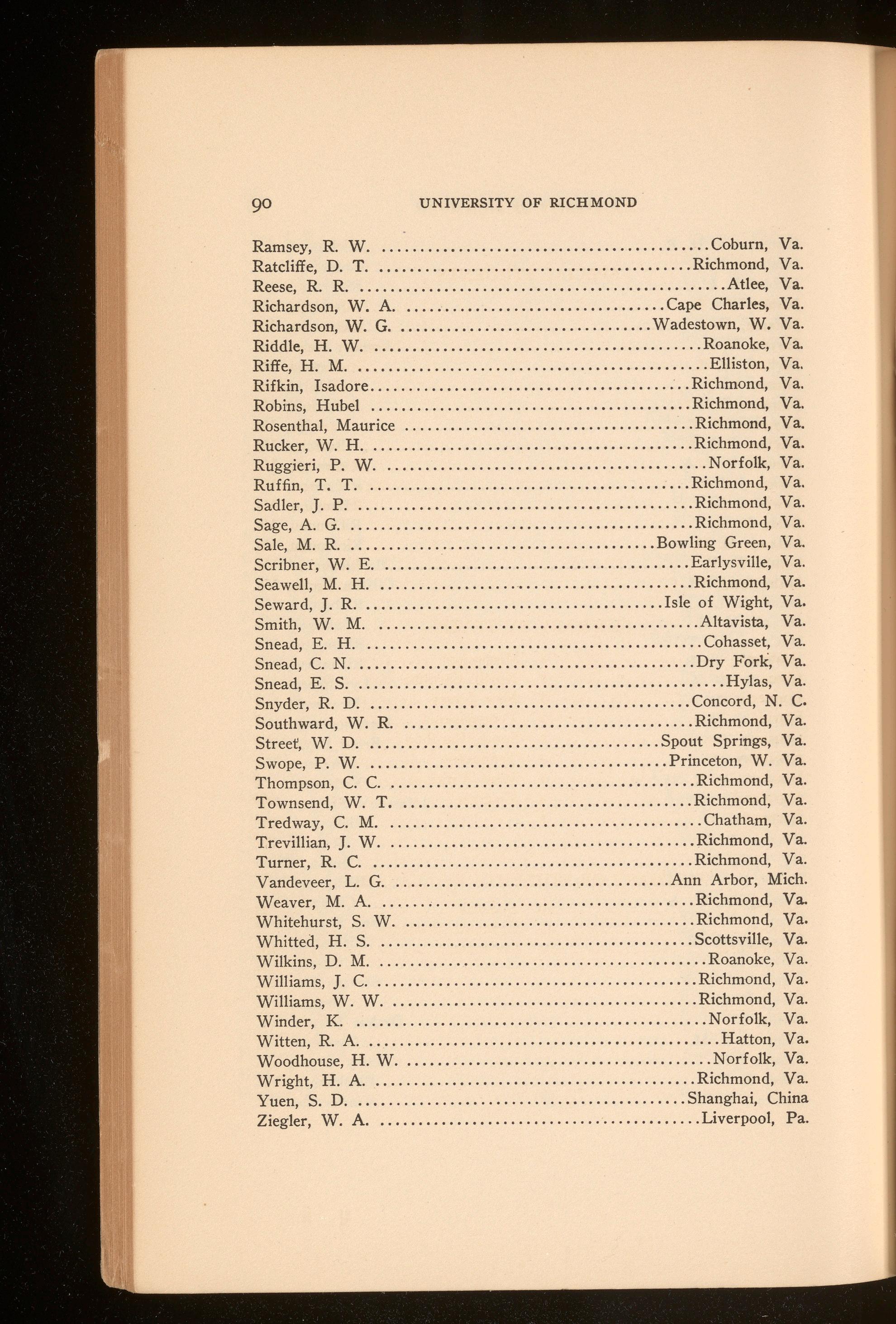
Ramsey, R. W .......... . .....•...................... Coburn, Va.
Ratcliffe, D. T •... • .. ................. • ............... Richmond, Va.
Reese, R. R .......... ...... . ... .. .................. Atlee, Va.
Richardson, W. A. . ..... . ........................... Cape Charles, Va.
Richardson, W. G.............•..... . ........ Wadestown, W. Va
Riddle, H. W ....•............. . •.............. • ......... Roanoke, Va.
Riffe, H. M. . ........ ..... . . . ..... • .................. Elliston, Va.
Rifkin, Isadore .......................................... Richmond, Va.
Robins, Hubel ...... .. ......................•........... Richmond, Va.
Rosenthal, Maurice .. . ... .. ............................ Richmond, Va.
Rucker, W. H ............... . .............•............. Richmond, Va.
Ruggieri, P. W .......................................... Norfolk, Va
Ruffin, T. T ............. ... ............ . . Richmond, Va.
Sadler, J. P . .. . . ........... ............... Richmond, Va.
Sage, A. G. . ....... . ... . .............. Richmond, Va.
Sale, M. R . ... . .. ....... ...•...... Bowling Green, Va.
Scribner, W E ......................................... Earlysville, Va
Seawell, M. H .......................... .............. Richmond, Va.
Seward, J. R. . ................... . .................. Isle of Wight, Va.
Smith, W M..... ................... • .... Altavista, Va.
Snead, E. H . . . . .. .. ... .. Cohasset, Va.
Snead, C. N ........ . ....... .•. . ........ Dry Fork, Va.
Snead, E. S . ... . ...................... . ........... Hylas, Va.
Snyder, R. D ........................ • ................. Concord, N. C.
Southward, W. R ............. . .. .. Richmond, Va
Street', W. D ................. . . . .. .. Spout Springs, Va.
Swope, P. W ....... . . . . .... ......................... Princeton, W. Va. Thompson, C. C. ....................... . ........... Richmond, Va. Townsend, W. T •...... . ............................... Richmond, Va.
Tredway, C. M ............................ . ....... ..... Chatham, Va.
Trevillian, J. W ......................................... Richmond, Va
Turner, R. C........................................... Richmond, Va . Vandeveer, L. G..... ............... Ann Arbor, Mich. Weaver, M. A .. . ....................................... Richmond, Va. Whitehurst, S. W ..... .. ................. Richmond, Va.
Whitted, H. S ... .. . .. .................................. Scottsville, Va
Wilkins, D. M . . . .. .. ............. Roanoke, Va. Williams, J. C........ . ... . ................ ... . ....... Richmond, Va. Williams, W. W ....... . .......................... . ..... Richmond, Va.
Winder, K. . . . .... . ........ ..•........ . .....•...... .... Norfolk, Va.
Witten, R. A .................................• • •........... Hatton, Va. Woodhouse, H. W ......................................... Norfolk, Va .
Wright, H. A .............. ........................ Richmond, Va.
Yuen, S. D ...... . .................. ............. . .... Shanghai, China
Ziegler, W. A ........................................ Liverpool, Pa.
Barker, A. F ........................................... Mendota, Va. Berman, Max ..................•......•..••.•......•... Richmond, Va. Barrett, F. S.............................•.•....... Newport News, Va. Carlton, H. R. . .....................•.................•. Richmond, Va. Chung, P. J. ........................................... Canton, China
Cutchins, Sol, Jr., ....... ..............•....•...•........ Richmond, Va. Edmunds, F. E ...............•.......•...........•....... Danville, Va. Graham, W. R ...............................•............ Suffolk, Va. Hamlin, P. G.........•....•......•....................• Richmond, Va.
Johnson, J. R ........................................ New Canton, Va. Jones, L. L •.........................•..••...••••....... Richmond, Va. Ozlin, P. A .............................................. Dundas, Va. Ramsey, E. M...........•..................•............. Roanoke, Va. Smith, W. V ............................................ Richmond, Va. Sutherland, W. C. ..................................... Sutherlin, Va.
SUMMARY BY STATES
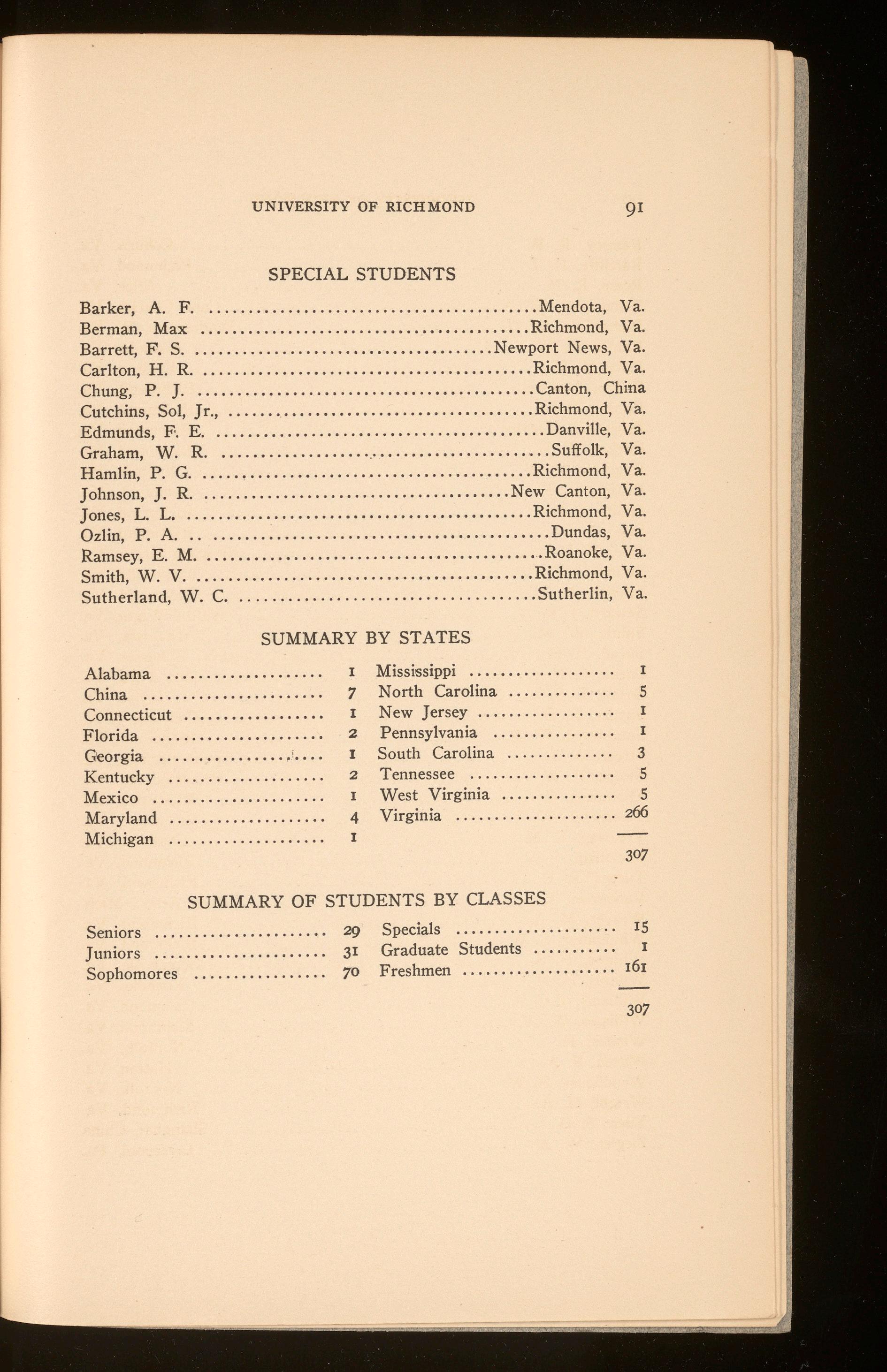
SUMMARY
